#along with the other analysis essays
Text
Can I just say, I love seeing all of the fellow Luke apologists under one post. Reblogging with full essays of analysis on our boy.
It's like someone flipped on the bat signal, and we all came running 😌💅
#but I honestly love it#along with the other analysis essays#like yes#give me more to read about my boy#tell me your opinions on him#I want to know!#luke castellan
19 notes
·
View notes
Text
Analysis of Pissa So Far.
This is a essay looking at our favorite death dads and how their relationship changed and their different nuances from to start to most recent. This will primarily look at the major three times we had Phil and Missa interact from the start with being paired for the eggs to recently the Mexican Independence Party. So bare with me and come with me down memory lane.
I rewatched day 1 of the pairing up of pissa to mainly cope with CERTAIN lore that happened recently. And yes it’s as fluffy and cute as I remembered. But let’s start at the beginning. Before the pairing up Missa and Phil knew of each other casually like acquaintances. In real life along with in general their characters/cubitos. (Again major thanks for the server in general bringing all these wonderful creators together.) Anyways the first time Phil met Missa was when he jumped off the wall and gave them food. I like to imagine missa had a non-serious crush on the man. But they didn’t really interact. And it’s fair to understand why.
But then the egg event happened. Which honestly in my opinion was the best event to bring the Spanish and English sides together organically. And looking back now it WORKED. So back on track everyone goes to the adoption center and like most Qsmp events it’s total chaos. Phil chooses his ticket and when I rewatched it Missa literally like spammed clicked it to break it and get Phil. Atleast that is what it looks like to me. So we already have the seeds of simp Missa from the very start. Also can we all take a break and just realize they both got tickets with D? And literally they are Deathduo? The more I rewatch the pairing lottery the more I think it was rigged by the admins and not actually by chance. Every duo either had similar humor or charm.
Immediately Phil and Missa find out they both have D. And it’s casual no romantic undertones the cubitos are still getting to know each other. But Missa being a sweetheart immediately is like you can choose whatever egg. And I think this is when Phil starts to soften and gets majorly endeared towards the clumsy reaper. Like not a crush. Not love. But the seeds of the adoration and love we see from Phil down the road. The fact of the matter Phil let Missa choose Chayanne name. The fact literally the newly formed death family was being fluffy and saying chayanne will be the best egg while literally everyone was screaming in the background. Its the main thing that would later define the dynamic of the ship. The gentle understanding and teamwork. That would later be a staple whether you ship them platonically or romantically.
And chayanne is the best way to show why pissa was meant to always work. Chayanne personality and hobbies all came from his two dads (Literally the reason chayanne was interested in cooking so much was because Missa taught him to cook). And like Phil once he was thrust into parenthood with Missa immediately found him endeared by his assigned husband? The amount of times he laughed because of Missa. Another theme so important to why pissa works so well.
Missa is Philzas calm balm. He relaxes Phil so much. And that’s so rare for that to happen. So of course a hour or so in taking care of their son. Phil visibly softens and gets endeared to the man. Phil immediately starts worrying about missa when he left. Missa may have fallen first but Phil fell harder. Like more time Phil spends with Missa the more comfortable and at ease he gets. Missa fully was like I have the best husband ever let me casually call you pet names.
Not to mention two popular scenes burned into the minds of fans. The moment when Mariana called Phil my love and tried to steal him. And Phil being Phil immediately was I’m okay with my partner thank you very much. And both Missa and Phil cuddled close. I still think Missa fell day 1 but Phil was quickly getting a crush on his assigned husband. Secondly Phil literally invited Missa to bed.
Their dynamic was one of like relaxation of trust and just both trying their best for Chayanne. They easily slid into a cute dynamic as both got endeared to the others. And also in day 1 Phil never said platonic it’s only after day 1 he started using that. And only when he wasn’t with Missa. He is a repressed romantic guy struggling with a crush. Not to mention the crows practically grew so attached to Missa it was insane to see.
Anyways like most couples they had to both take care of chayanne until Missa canonically got kidnapped by wolves for four months. During the time Missa was there he was pining HARD for Phil. Calling him his love and darling in Spanish. Phil meanwhile keep saying it was platonic and most of the fans accepted that. But then Missa was gone.
And cubito Phil missed him so fucking much. It’s at this point I fully believe is when Phil finally realized he loved him. He kept referencing Missa. He made armor for Missa. He dyed his backpack black with a skull because of Missa. It’s truly my belief that Philza realized he fucking adored the man in Missas absence. He never gave up waiting for Missa. And Missa eventually kept his promise and came back to his family.
And this is when you see some of nuance or facets change slightly in their dynamic. The core is the same all the way back from day 1 but it does change. It somehow becomes softer and domestic. Sure Philza even before his grand realization in Missa absence SPOILED missa. Missa made him soft. But when the reunion happened? Somehow Philza softens even more. Somehow he spoils Missa even more. This is why I believe that Philza finally realized he loves Missa. Because there is a clear increase in the affectionate displays between them.
Philza and the rest of the server went on the mission once Missa appeared. It was legit like Philza forgot that he was a mission. Philza when Missa appeared immediately softened so much. Of course Philza isn’t angry he’s gone. He just missed his husband. And voila once asked by Cellbit “oh this is your husband?!” He immediately agreed. This is important because for months if someone asked about who is Missa he would always and never fail to say Missa is his platonic partner/husband.
But in the reunion Philza just said husband. Because in my opinion Philza fully thought of Missa his romantic partner. The fact that Philza showed everyone including Missa the skull on the black backpack almost like a bird showing off his feathers. And Missa was immediately all gushy. The fact he only looked at Missa when he said you can go into my boat. And felps not realizing the sorta of energy the two of them was having immediately was cursed to be a third wheel.
Like literally felps was in the back of the boat being all “just ignore that I’m here” when literally Philza and Missa were lost in their own fucking world. Gently flirting with each other. Felps was regretting majorly getting in the boat with them so no wonder he bounced as soon as possible. And literally they were left by themselves still on a mission to save people. But I won’t lie it was a date.
Just them loving in each other company. And Philza being so gentle and loving and protective towards Missa. Their dynamic at their core is the same yes. But it’s undeniably more romantic. And Missa side of the dynamic also changes. He starts trying his best to protect Philza. The man who has from the start been protecting him and their son.
Missa slowly starts to become more brave and actually comments on how attractive Phil is in front of him. (I can see your pecs….yes Missa we get it you love Phil). They are closer than ever. Phil also immediately accepts Missa as Tallulah other dad. Do you guys know how massive that is? He trusts and loves Missa so darn much to let him easily be part of his whole family.
And eventually Missa had to go for a bit. But the amount of pissa interaction we get during the renuion stream doesn’t end. We have loads more to dissect. Missa comes back in hope to see his son and new daughter but sadly they were sleeping but later on despite showing Tubbo around. Once he saw Missa was whispering to him in chat immediately left as soon as possible to get to his husband. Also Cellbit who was with him and tubbo was immediately like “oh you need to help your husband understandable” while tubbo was just like so confused.
Meanwhile before this Missa was crying wanting to go back to Phil. Phil is his safety blanket. Phil never fails to make him feel safe and secure and protected. There’s reasons why Missa fell so quickly. And they met up. And to bring up my earlier point above. What Phil does nest is one of my primarily reasons why I believe Phil fully realizes he loves Missa.
Yes Phil spoils Missa. It’s his love lanuage but all the gifts and upgrades he did late at night (which Phil made a mission to give stuff to Missa before he logged off.) and even the armor he made so long ago. The amount of spoiling and pampering just screams love, adoration, and affection.
And of course they get sorta matching backpacks. And of course Missa says he loves him so fast so the translator doesn’t pick it up. This leds to when Missa showed up by himself had a loony toon day before being called out by roier. He fully says he loves Philza. LOVES PHILZA. TE AMO. Romantic.
Most of the fans knew because just look how Missa acted. But once it was confirmed Missa feels romantic feelings for Philza? That’s when the majority starting fully accepting them as romantic soulmates. And started seeing Philza actions how they are. Romantic. (Though if you prefer them as platonic that’s also very valid).
The only reason a pissa wedding or confession haven’t happened is because Missa loves Philza so much he doesn’t want to make him uncomfortable or burden him with his feelings for him. If philza said let’s get married he would accept immediately. But knowing Phil he will say nothing about loving Missa because he is scared he won’t be able to be protect.
And more recently. The Mexican Independence Day party. I won’t lie the times they were together they were always flirting. They were so cute. And both in my eyes were getting brave with their love for the other in their own ways. Missa literally screaming VIVA TE AMO on stage when Roier said Philza. Or Philza making sure he follows Missa during the dance. The fact Philza was so gentle explaining the recent egg disappearance and made a comment of being shock that Missa came back (he misses Missa so much each time he is gone.).
And their dynamic switches slightly again. Because Phil the whole time was worried and hovering around Missa when ingesting everything lore at once. And Missa is again getting brave he fully said he going on a date with Phil. It’s romantic. There’s no way I can personally can see it otherwise (though again if you like them platonic you are hella valid). At the start there was seeds but their romance has grown. They love each other. They need to confess for my sanity. And I fully trusts that Missa will have some sort of role in saving his love. And maybe perhaps we can get a confession or wedding in the future-
#qsmp#pissa#I’m dead guys. THIS is literally my two essays combined#Leave your thoughts on tags.#or comments#I hope you enjoyed this summary? recap? of pissa as a dynamic from the start to more recent.#yes I know I’m normal about them#LET ME BE FREE#this is how I cope mates.#qsmp shipping#pissa newspaper
270 notes
·
View notes
Text
Lucci and Kaku: An Analysis
I haven’t done long analysis/meta/essay-style posts in a while, but after seeing a comment that amounted to “every time Lucci’s shown an interest in something that doesn’t have to do with killing, Kaku’s involved” it made me think about whether or not that's true and, more specifically, whether or not there’s been sufficient build-up to justify what happens in Chapter 1111.
So let’s explore, shall we?
First of all, basic disclaimer that I’ve been heavily into One Piece since 2008 and Water 7 has been my favorite arc since the first time I read it that summer. Kaku, in turn, has always been one of my top characters in the entire series for various reasons…but this isn’t about him (at least, not entirely), so all of that is just to say that I’ve thought about these characters a lot over the years.
And I think what always struck me about them is that not only are they so fundamentally different, but that realistically Lucci should not tolerate Kaku at all. He’s pretty much everything Lucci’s not, and they’re more-or-less a perfect example of the ‘someone will die…of fun!’ meme in a lot of ways (and honestly it’s what I think of every time I see this card, but I digress):

At the same time, what happened in the latest chapter didn’t surprise me, because there’s been hints all along, and I’ve personally been waiting years for it to pay off…even though part of me thought it never would, or at least not in the way it did!
Still, how did we get here?
But First, A Bit About 相棒
So. Why is the fact that Lucci calls Kaku his “相棒” (aibou) so significant? Mostly because of the…individualistic meaning of the word. It literally translates to ‘partner’, but not in a romantic/life-partner way (not to say that it has never been used like that, but it’s not the inherent meaning of the word).
Unlike words such as 友人 (yuujin), 友達 (tomodachi), and of course, with Luffy, 仲間 (nakama), aibou generally only refers to one person. You can have many friends, teammates, crew members…but only one aibou. So by calling Kaku that, Lucci’s already placing him on a different level to anyone else in CP9 or CP0 and acknowledging openly that Kaku’s important enough to him to have earned that distinction.
Which is why a lot of us were very excited about it, since this is not a common occurrence where Lucci’s concerned.
That aside, let’s get to the actual canon content.
Water 7
Obviously at the beginning we find out they both work at the shipyard, but that in and of itself isn’t entirely significant…until you consider that, since Kalifa is pretty much with Iceburg all the time and Blueno’s running the bar, the two of them are working in much closer proximity to each other than to the other CP9 members in the city.
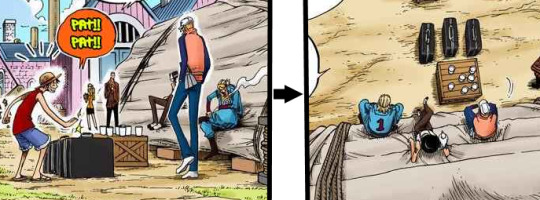
The first real indication we get regarding their comfort level with each other comes in chapter 327 when Kaku gets back from examining the Merry and goes to sit down to explain what he’s discovered. Paulie’s the closest to him, but he actually ends up stepping past both him and Lucci in order to sit directly beside Lucci on the same level.
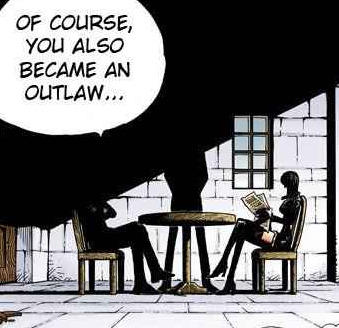
It’s quite a while before we see the two of them alone again, and it doesn’t happen until chapter 339 when they’re speaking with Robin. Of course at the time we’re not supposed to know it’s them, but there’s really nobody else it can be since this is happening at the exact same time that Blueno’s talking with Franky and Kokoro at the bar. So, as will become fairly common, the two of them are again acting as a unit of their own within the larger group.

And then, of course, we get the infiltration of the mansion prior to The Big Reveal (which I’ve spoken about before because for me it’s still the single greatest reveal in the entire manga because of how carefully crafted it is, right down to Kaku’s limited dialogue in this section being completely devoid of his usual speech quirks in the original Japanese text). Once again, Blueno and Kalifa are doing their own things while these two are working together.
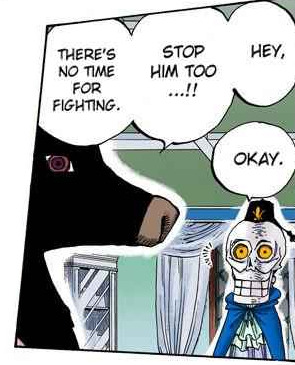
This panel has always been interesting to me because immediately prior to this Lucci says he can’t let Paulie live, and then he decides to just restrain him instead. In Luffy’s case it makes sense because they gave their word to Robin not to harm the Strawhats, but he has absolutely no reason to spare Paulie, and the little lines of shock/surprise beside Kaku imply that he hadn’t expected Lucci to do that, either. The ‘why’ is still unclear, but it’s interesting nonetheless, and it’s also…noteworthy that it’s the only thing Lucci asks Kaku to do. All of the actual damage Paulie takes comes from Lucci and he never asks for or expects Kaku to harm him.
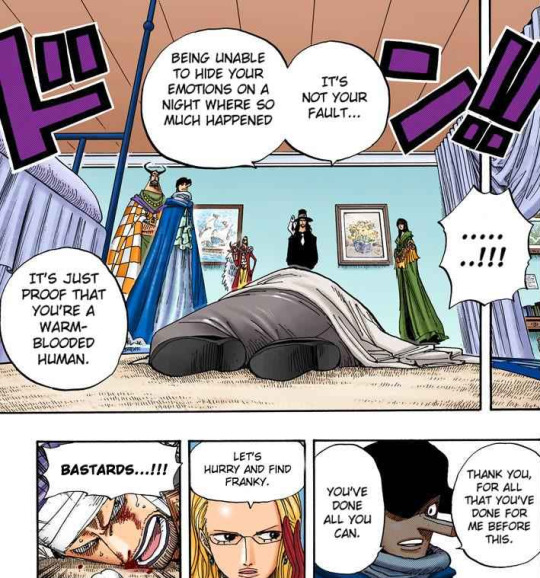
I never connected these two panels before but it’s obviously very deliberate to have Lucci telling Iceburg that feeling emotions is a sign of humanity followed immediately by Kaku…demonstrating exactly that and thanking Iceburg. It’s important to establish that part of Kaku’s character, but keep in mind Lucci’s lack of a reaction here because it’ll come back later.
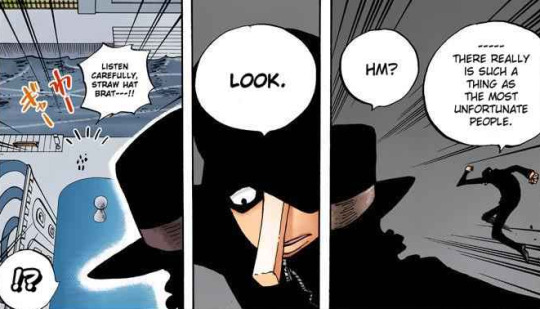
Again, very tiny moment, but there’s a lot of examples of Lucci deferring to Kaku or letting him take the lead without any hesitation, and I like this because Kaku’s noticed something that Lucci hasn’t and Lucci just goes with it immediately.
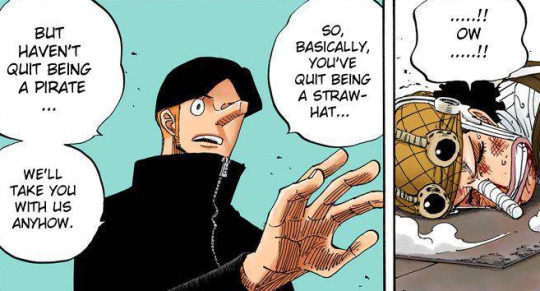
I’d forgotten about this but Kaku’s also the one that decides to take Usopp with them, first by recognizing him as one of the Strawhats and then going through with it even after finding out he doesn’t consider himself a part of them anymore. And Lucci just…stands back and lets him give out orders to the others while doing so.
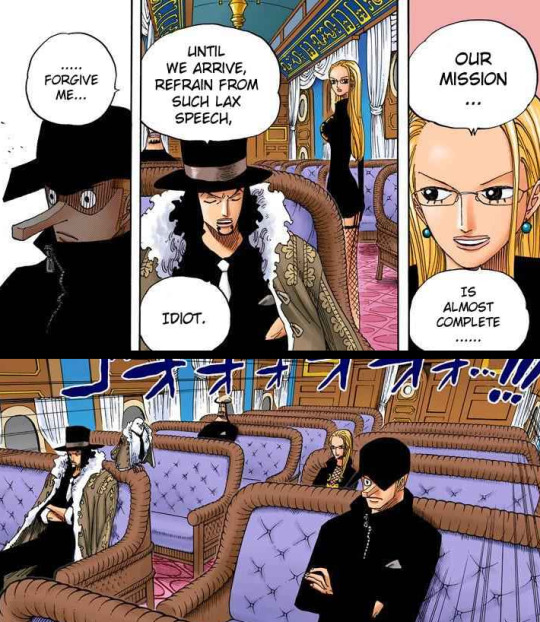
Okay so this is what I was referencing earlier. Kaku shows actual emotions with Iceburg and Lucci’s silent, but the moment Kalifa gets even slightly happy about completing the mission he’s berating her instantly. Kaku’s expression here is interesting too because he looks absolutely haunted and it’s very telling.
And also another visual representation of Lucci and Kaku being equal to/on the same level as each other.
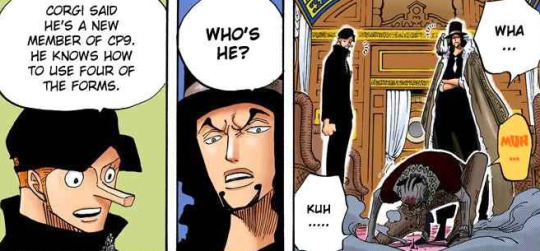
I didn’t include the panel but Kaku was ‘sleeping’ when Corgi was giving them all of the information about Nero while Lucci was (seemingly) wide awake, and yet Lucci has no idea who he is and relies on Kaku to have all the information. Which he does.

Kaku being the one to take charge again and direct the others even though Lucci’s standing right there. They do this more than I’d realized at first, especially since Lucci always seems to be looked at as the unofficial ‘leader’ of CP9.
Enies Lobby
We’ve made it to Enies Lobby, which is the first glimpse we get of these two interacting with the full CP9 group outside of any sort of ‘mission’ environment.
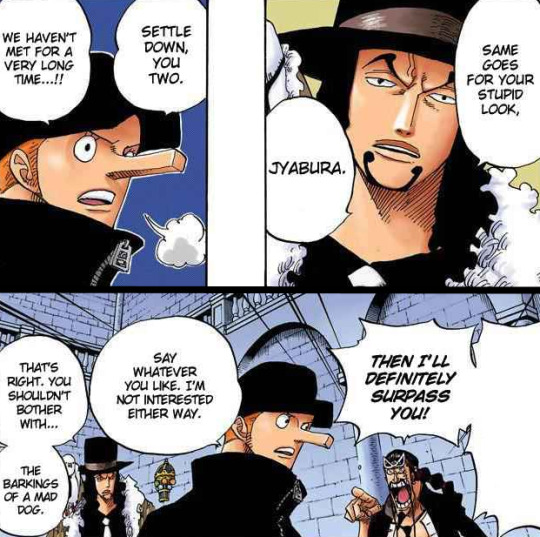
Mostly it entails Lucci being more combative (especially with Jabra) and Kaku being more annoyed, but again I can’t really imagine anyone else taking this tone with Lucci and getting away with it while Kaku does it fairly often and Lucci never retorts or gets angry with him.
And while Kaku’s not immune to taking Jabra’s bait in the right circumstances, his typical tendency is to de-escalate situations if he can and here he’s refusing to engage despite being deliberately called out…and Lucci, without being asked, immediately takes his side and defends his choice.
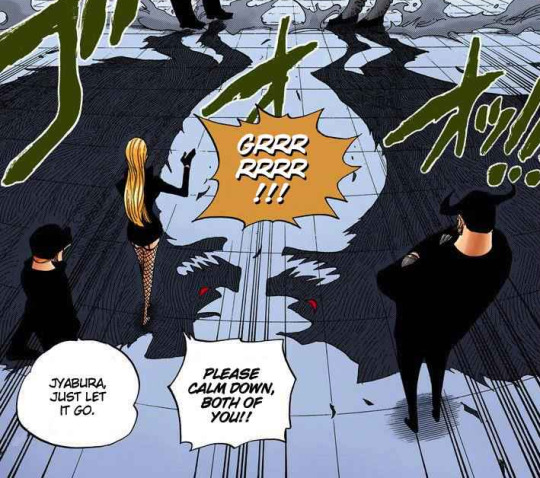
This is practically the next panel and while both Lucci and Jabra are kind of equally at fault for this little display, Kaku only berates Jabra for it while Kalifa’s directing her comments at both of them.
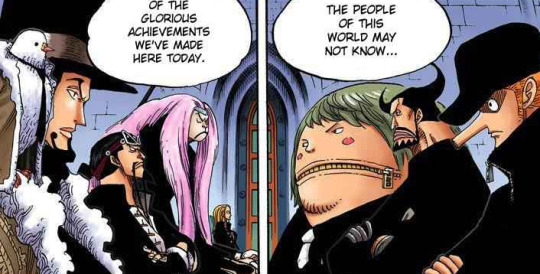
Now that I’m actually looking for these sorts of things it’s becoming more obvious, but again we have Lucci and Kaku in an equal position to each other at the front of CP9.
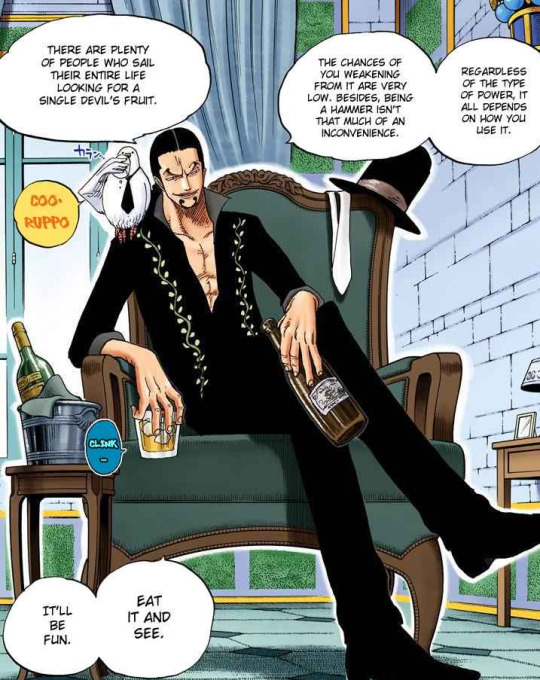
This isn’t just to Kaku since Kalifa’s there as well, but Lucci’s still encouraging them to eat the fruits and I have to believe it’s coming from a place of good faith because he’d know whether or not being able to swim is that big an issue in their profession. I also want to note that Kaku echoes Lucci’s ‘it’ll be fun’ line when he actually does eat his fruit, so obviously that resonated with him.
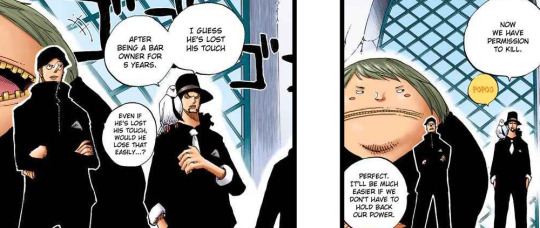
I’ve put these two together because they both highlight the same thing, that being in both of these sequences we get almost all of CP9 giving out their individual thoughts/comments on what’s happening but Kaku’s statement both times is a direct reply to what Lucci says, so again the two of them are paired off in a way that doesn’t include anyone else there.
The only other thing of note in this section is that while Robin’s talking about what happened during the Buster Call on Ohara, Kaku and Lucci are the only CP9 members to kind of…break formation and actually look at her while she’s speaking, which is interesting.
And for the rest of Enies Lobby they aren’t together so there’s not too much more to say here other than Kaku of course being the one to have the actual key to Robin’s cuffs, but it’s never made explicit who came up with that plan or handed out the keys so…if I ever actually do the thing and write a full analysis of Kaku’s character we can talk about it then Lark you’ve been saying you’ll do this for years IF I EVER--
Interlude - CP9’s Independent Report
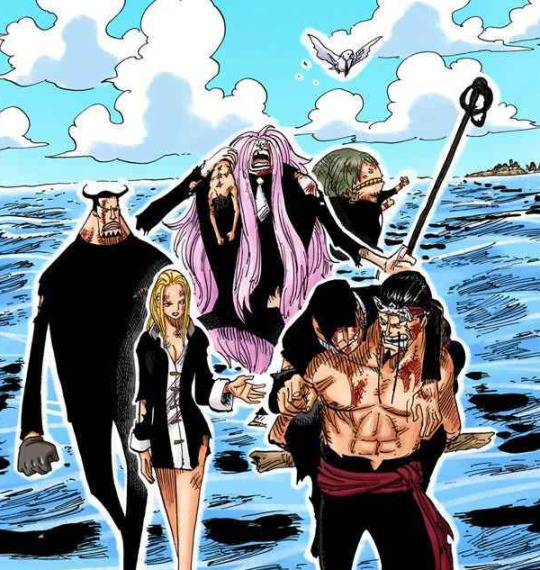
Besides the fact that this is still one of my favorite cover stories, there’s a couple of noteworthy things here, the first of which is that Kaku again is taking the lead. Even though he’s the only other CP9 member other than Lucci to be injured badly enough that he can’t walk on his own, he’s still the one directing them where to go.
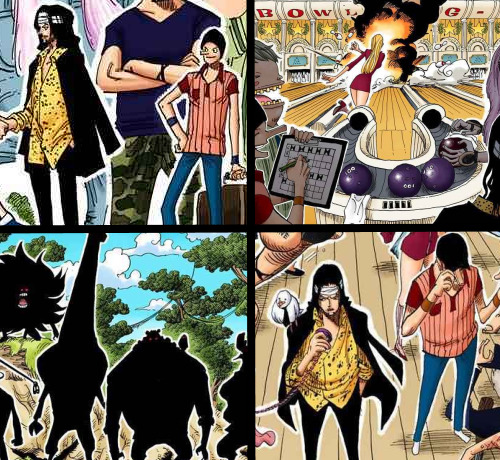
Other than that, I love seeing all of them just…interacting like friends and being very relaxed and casual, and pretty much every panel where Kaku and Lucci are together they’re directly beside each other so I’ve included a bunch of those here.
Dressrosa & Egghead
The next time we see Lucci and Kaku is at the end of Dressrosa, where they’ve been promoted to CP0 Oda can we please get some explanation of how this happened and let me tell you, I remember this vividly because the spoilers at the time just said that Lucci was talking to ‘someone’ and when the raws came out you can bet I went right to the dialogue to see if it was Kaku because his way of speaking is so telling.
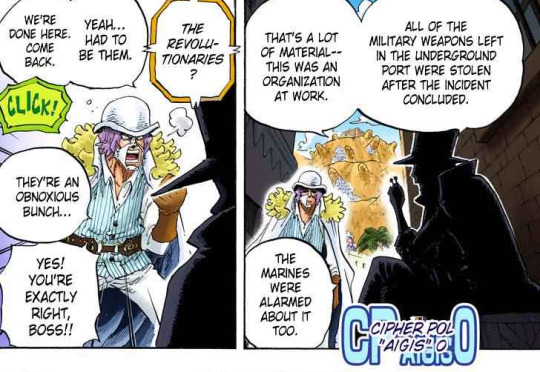
But even in this little scene, we can see they’re having an equal conversation and there’s a major difference between how Lucci’s speaking with Kaku and how he addresses Spandam mere seconds later.
After this we have the Reverie/Levely/what-even-is-this-thing-called arc where they get all of a single panel together and while it’s the first time we actually ‘see’ Kaku after the time-skip, nothing really interesting regarding their relationship happens, so let’s move on to…
The end of the colored manga! And Egghead.

We start with a very familiar situation: Lucci asking Kaku what’s going on, and while Kaku this entire arc seems more outwardly annoyed with Lucci than he ever was in the past (which is never really explained but then again, Lucci spends a lot of the arc doing things he’s specifically been told not to do, so maybe it’s understandable…), he still has all the information and relays it.
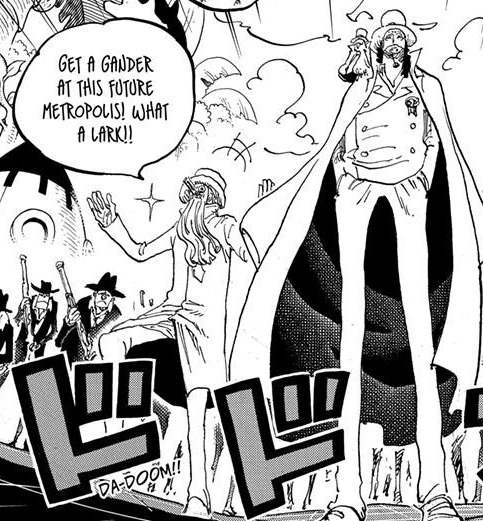
Though Kaku’s also much more comfortable letting his real personality show despite them being on a mission while before he was always completely serious after the Water 7 reveal, especially around Lucci. It came through with Zoro and Jabra but during the cover story he’s smiling and laughing a lot with Lucci right there so it makes sense he’d be more willing to let his guard down even ‘on the job’ by now.
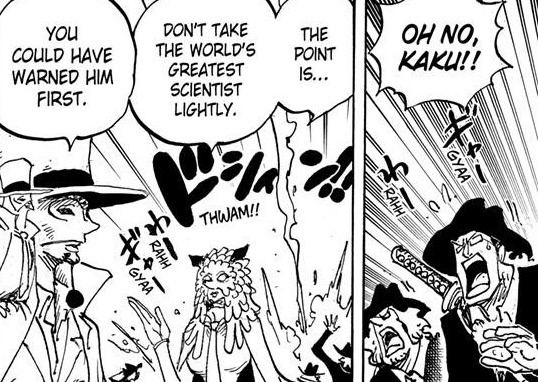
So here’s the first real instance of Lucci showing concern for Kaku, something which escalates pretty quickly throughout the arc. It’s subtle, and though he’s framing it as a suggestion to Stussy, if he didn’t care at all he wouldn’t have said anything.
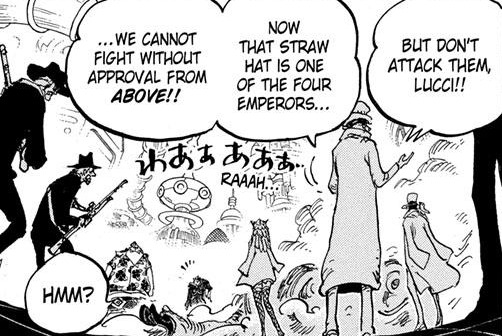
At this point it’s fairly obvious that Lucci and Kaku don’t really have any authority difference between them and Kaku spends a lot of time in this chapter especially telling Lucci to Not Do The Thing. Anyone that’s ever lived with a cat knows how well this works.
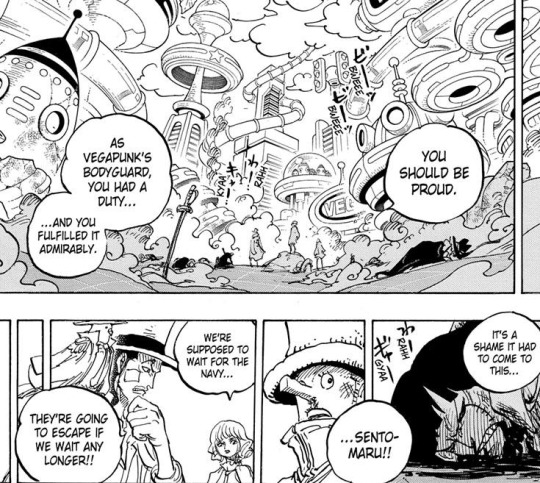
I’ve always found this bit of dialogue particularly interesting because Kaku’s very openly…praising Sentomaru for choosing his loyalty to Vegapunk over assisting the government, and there’s no way Lucci doesn’t hear him say this but he doesn’t say anything in return. There’s no real evidence that Lucci knows about Kaku willingly giving up the key to Zoro or how conflicted he was about Paulie and everyone else, but this seems to imply that at the very least, even if he doesn’t share those sentiments, he wouldn’t think less of Kaku because of it.
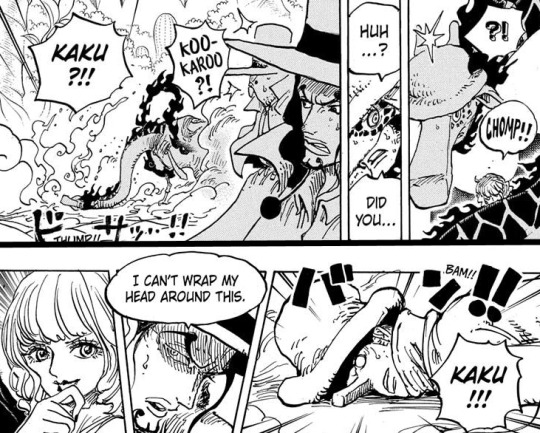
Putting these two together since they’re in the same scene but at this point it’s not even subtle concern anymore, Lucci’s genuinely worried for Kaku and you can tell this caught him off-guard.
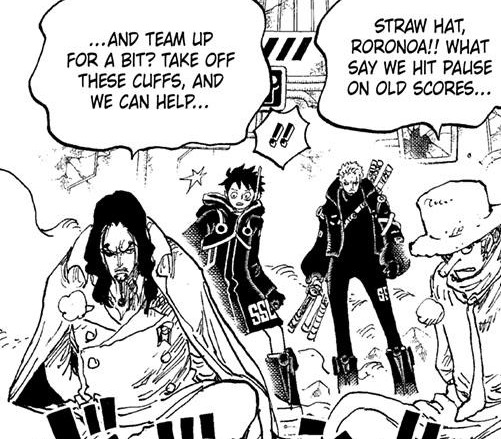
Kaku’s the first one to suggest working together but Lucci immediately backs him up and goes with the idea. It’s logical in the sense that it’ll give them the biggest chance to survive, but willingly working with pirates isn’t exactly the sort of thing that Lucci, especially in the past, would have so easily done regardless of the situation.
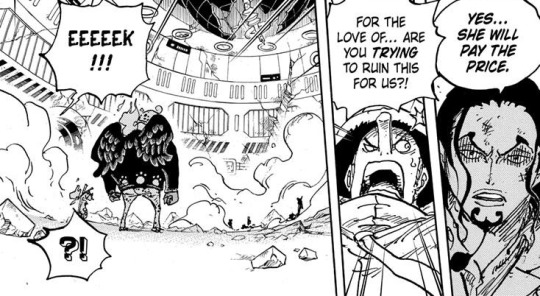
So at this point it’s becoming clear that this whole 4-v-2 section is supposed to be the most…light-hearted thing going on right now and a lot of it is played to be comedic, including Lucci’s inability to lie, but yet again there’s almost nobody else that could get away with scolding him the way Kaku’s doing here.
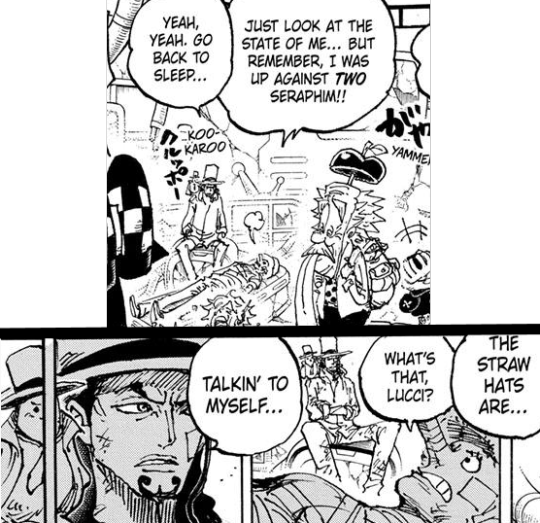
…And then we skip ahead a day and things happen that I really hope get explained at some point because they seem important, but while Lucci’s never going to have impeccable bedside manner, he’s very concerned with getting Kaku to rest and while Kaku’s trying to justify what happened Lucci really doesn’t seem to care about that. It’s a big departure from him being willing to write off anyone he deems ‘too weak’ and it’s a nice character moment.
I’d mentioned on my liveblog that some of the things Lucci was doing after this point were confusing, but if you look at them through the lens of him wanting to protect Kaku, it makes a lot more sense. Yes, he’s deliberately keeping him out of the loop, but Lucci I think has decided that he’s going to throw caution to the wind and act alone since if Kaku can’t prove he knew about the plan, he’s probably safer being left with the Strawhats, and if the Marines show up he should be safe anyway or so Lucci thinks…

When this chapter came out, I’d said something about Lucci being a hypocrite considering what the rest of CP9 did for him when they could have easily just left him at Enies Lobby, but given what happens almost directly after and likely what he’s trying to do with this entire fight, these words feel even less genuine…
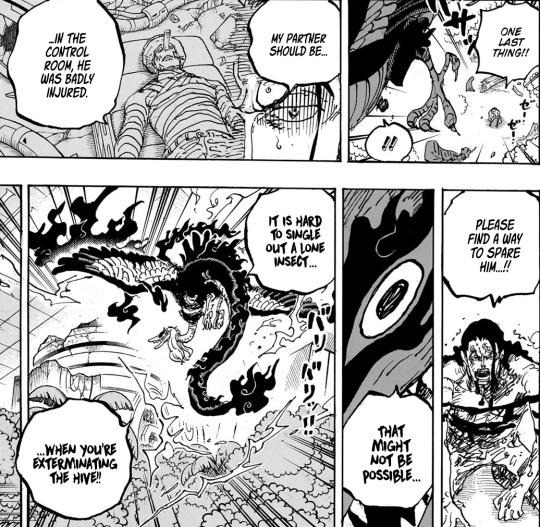
And that brings us to this. The moment that I’ve been thinking about for almost an entire week now. The moment that, looking back at…oh, wow…almost 3000 words of analysis maybe shouldn’t be as surprising as it was for most of us, but it does feel like the payoff for a long, long buildup that’s taken nearly twenty years to reach. Because really, there’s no other way to describe them other than ‘partners’, and probably hasn’t been for a long time…and I’m so glad that Lucci acknowledged it.
To summarize, I think what surprised me most about re-visiting all of this is how much the manga has framed them as equals since the beginning even though it was never explicitly stated between the characters themselves. Lucci’s always been far more lenient with Kaku than with anyone else, and Kaku in turn has never had any fear of Lucci even if he wasn’t really expressing his true self with him for a long time.
The cover story being the turning point makes perfect sense, and the progression throughout Egghead of Lucci being more outwardly willing to show his concern and Kaku not hiding his emotions at all seems like a natural progression of their relationship and their level of comfort around each other.
And the fact that Oda is never really…hitting us over the head with any of it until that final moment when Lucci says everything so plainly because Kaku’s life is the most important thing to him even when faced with a literal monster… It’s so effective.
I don’t know where we go from here. To be honest, I’m kind of scared of where we go from here. But regardless of the outcome, I hope this little essay has been at the very least interesting and perhaps allowed you to look at these two in a different light.
Thanks for reading.
#one piece#opspoilers#rob lucci#kaku#meta#analysis#i forgot about the 30 photo limit so I had to get creative here but#3k words of me examining their relationship sure happened
132 notes
·
View notes
Text
Pluralistic is four

I'm on tour with my new novel The Bezzle! Catch me TOMORROW in SALT LAKE CITY (Feb 21, Weller Book Works) and then SAN DIEGO (Feb 22, Mysterious Galaxy). After that, it's LA, Seattle, Portland, Phoenix and more!

Four years ago, I started pluralistic.net, my post-Boing Boing, solo blog project: an ad-free, tracker-free site that anyone can republish, commercially or noncommercially. It's been a wild four years, featuring over 1,150 editions, many consisting of multiple articles:
https://pluralistic.net/2020/02/19/pluralist-19-feb-2020/
As a project, Pluralistic has been a roaring success. I've published multiple, significant "breakout" articles that popularized obscure, important, highly technical ideas, most notably "adversarial interoperability":
http://pluralistic.net/tag/adversarial-interoperability
"End-to-end" as a remedy for multiple internet ripoffs, including as a superior alternative to link-taxes as a means of saving the news industry from Big Tech predation:
https://pluralistic.net/tag/e2e/
and, of course, "enshittification":
https://pluralistic.net/tag/enshittification/
These are emblematic of the sorts of ideas that I've spent the past 20+ years trying to popularize in tech-policy debates dominated by technologically illiterate policy ideas ("abolish Section 230!") and politically illiterate technical ideas (so many to choose from, but let's just say "cryptocurrency"). They require that the reader come along for a lot of cross-disciplinary analysis that often gets deep into the weeds. These are some of the hardest ideas to convey, but nuanced proposals and critiques that work on both political and technical axes are the best hope we have of successfully weathering the polycrisis.
Blogging has always been a part of this project. For nearly 20 years, I posted nearly every day on Boing Boing – 53,906 posts in all! – taking note of everything that seemed important. Keeping a "writer's notebook" in public imposes an unbeatable rigor, since you can't slack off and leave notes so brief and cryptic that they neither lodge in your subconscious nor form a record clear enough to refer to in future. By contrast, keeping public notes produces both a subconscious, supersaturated solution of fragmentary ideas that rattle around, periodically cohering into nucleii that crystallize into full-blown ideas for stories, novels, essays, speeches and nonfiction books. What's more, those ripened ideas are supported by a searchable database of everything I've thought about the subject, often annotated by readers and other writers who've commented on the posts. I call this "The Memex Method":
https://pluralistic.net/2021/05/09/the-memex-method/
Pluralistic marks a new phase in my deployment of the Memex Method. With 50K+ notes in a database, I've gradually turned Pluralistic into a forum for far more synthetic, longer-form work that pulls on threads from decades of research into nothing in particular and everything that seemed important.
Pluralistic is also an experiment in retaining control over my destiny – but not my work. Rather than hitching my ability to reach an audience through a platform that can be enshittified at the whim of a mercurial, infantile billionaire or their venal, callous shareholders, Pluralistic is published web-first, on a site I control, and then syndicated to every platform that matters to me. It's a process called POSSE (Post Own Site, Syndicate Everywhere):
https://pluralistic.net/2021/01/13/two-decades/#hfbd
I want to spread the ideas I fight for, so I post them everywhere, and license them Creative Commons Attribution-Only, encouraging others to repost them. Lots of small sites do this, but so do large ones. Notably, Wired picked up my first breakout piece on enshittification and republished it under the CC terms:
https://www.wired.com/story/tiktok-platforms-cory-doctorow/
This was a really interesting process. On the one hand, I didn't get paid for this feature, which did really well for Wired. On the other hand, nearly 30 years of writing for Wired makes me doubtful that I could have gotten this piece out in the form it emerged, without substantially toning down (or, if you prefer, neutering) the rhetoric that made that piece more persuasive. A commissioning editor from one of the largest newspapers in the world got in touch with me after it came out and said they wished they'd published it – but also that they knew they couldn't possibly have done so. By publishing the story first on my blog, proving its audience, and establishing its canonical form, I was able to get it amplified by a service with a much bigger platform than me, without having to compromise on the form.
That republication gave me the much-maligned "exposure" – but it also carried the message to places it wouldn't have reached on its own. I don't write – have never written – solely as an income source. As both an artist and an activist, connecting with audiences has always been co-equal in my mind with earning my living. That's why I don't do a lot of film-writing: it pays well, but most of it never sees the light of day. It's also why I stopped writing for ad agencies: it paid well, but it didn't matter to me or my audience. To mangle Dr Johnson: "No man but a blockhead ever wrote solely for money."
The open nature of this blog, with its many open syndication channels, creates multidirectional pathways for evaluating and refining my attempts at making my ideas understood and my art land. My posts often circle back to points I made earlier, incorporating useful feedback from readers and colleagues, sure, but also anticipating and rebutting those areas where critics have convinced others in various forums. Vanity searching is unjustly maligned: I learn a ton about how to make by work better by lurking in Reddit comments, Hacker News, Twitter, Slashdot, Metafilter and other forums. I also take a sneaky pleasure in knowing that the persistent trolls who reliably pop up to grind their weird axes about me (sometimes referencing blog posts I made decades ago) have taught me how to neutralize them in advance, and it's delightful to see them try their same old lines, only to have other commentators point out that my latest piece makes it absolutely undeniable how wrong they are. Living well is the best revenge, indeed.
Four years. I've been writing Pluralistic for four years. During that time, I've published eight books – and beyond any doubt, Pluralistic helped me get those books into readers' hands. But far more importantly, during that time, I've written nine books – and contracted for a tenth – as the Memex Method paid off again and again.
I don't know how long I'll do Pluralistic for, but I don't foresee stopping any time soon. What's more, no matter what happens to Pluralistic, I can't ever see giving up on the Memex Method, keeping notes in public and making them work for me.

If you'd like an essay-formatted version of this post to read or share, here's a link to it on pluralistic.net, my surveillance-free, ad-free, tracker-free blog:
https://pluralistic.net/2024/02/20/fore/#synthesis
81 notes
·
View notes
Text
WAD reflection from the perspective of a theatre director
Inspired by @/calvinahobbes who did an amazing job breaking down the show’s metaphors & using her English degree in this post, I wanted to share my perspective on it (even a month later) & get use out of my theatre degree lol. Also, warning, this will be very much a long, long essay with run-ons. I have ADHD & I love when my frequent hyperfixations intersect 🤪 There are major spoilers.
My Background:

I am a semi-professional theatre director, but more broadly, a theatremaker. I have a theatre degree from New York University’s Tisch School on the Arts (NYU Tisch), where I did a conservatory program with one of their studios which focused basically on those who wanted to do a little bit of everything and create new works & was the only studio training directors & playwrights. I originally went into the program as a performer. I did not mean to end up concentrating on being mainly a producer & a director, but that’s a whole other story. I also through that program had to take theatre/performance studies courses, which I loved for the most part & is an interesting interdisciplinary field. But I will try to define terms just in case since anybody reading this may not know any or all the specific terminology I might use. In short, I have a fancy degree that apparently should cost $300k 🤡 & I’m gonna actually use it with doing this lol
--
Setting the Tone:
While Dan might call this a comedy special or comedy show, and thereby comparing it to other comedians, I actually think he is doing himself and We’re All Doomed (WAD) a disservice. I saw folks compare him a lot to Bo Burnham in the chat (who was actually was accepted and almost went to NYU Tisch for a different studio that focused on solely experimental work), which makes sense considering the theatrical nature of both of them. However, Dan actually goes further into the realm of theatre because of how he utilizes his crowd work (I’ll go into that later). I recognize traditional comedy specials/standup as having jokes or stories, when doing you know like late night talk show interviews, that can be made outside of the context of the show & slip into a conversation. Or with Burnham’s Inside Out, the songs & other parts can be done or understood mainly out of context, as seen through Bo uploading them to his YouTube channel. Comedy specials have the sections of their comedy stand-up thread together, but what Dan has done is weave his sections together. The length along with the intermission/interval being a part of WAD, adds to my point that he is not treating this as different material he tested out at different comedy clubs, but as something cohesive storytelling pieces. I think in terms of testing, Phil was the main sufferer audience member of the initial materials being created.
Anyway, you cannot as easily remove it from the context at certain points, because the transitions & the order of these different sections are treated as equally important, rather than a means to move on to the next section, with some possible space for improv.
Basically, I’m bi. Sorry, my brain started thinking about BIG when I started writing “basically” at the start of that sentence. Actually, what I am trying to say is that I would classify We’re All Doomed as a one-man performance piece/show, so I will be treating it as such in my review/reflection/breakdown. The comedy of it is important and there, but I don’t think it captures what WAD entirely is.
Also, unfortunately due to where I was at mentally at the time & the location it was being performed at, I never saw this live. To be honest, how it got framed marketing-wise did not help me feel connected with the actual purpose of the show, with hope being a key element. So while this was filmed, I am as much as possible trying to remove the cinematography as an element of my analysis. However, some things might be clearer on film, as with theatrical directing, you cannot add a zoom or crop & instead are trying to ensure moments are clear to an audience by what they see and hear through drawing their attention to it. With theatre being mainly about the live output by performers and intake by the audience, at the end of the day, what my job as a director is is to direct not only how the performers share the story, but also direct the audience on what is important to catch for understanding.
--
Breakdown of Thoughts
Originally, I wanted to rewatch the show again, and started to, but considering I ended up writing about a whole page worth of things for each minute of the show & I was sleepy by the time I was like 5-10 minutes in, I decided to be nice to myself & stay up all night in my comfortable bed instead of staying up all night at my desk trying to take in-depth notes 🙃
I’m gonna breakdown this analysis/reflection into further sections, just to give myself some anchors & break up the blocks of text. Also as a way to just be that pretentious, maybe with an academic flair, as is fitting to be for something about Dan Howell (said affectionately 💕)
The Script/Writing
When considering the text of the show itself, two things came to mind for me:
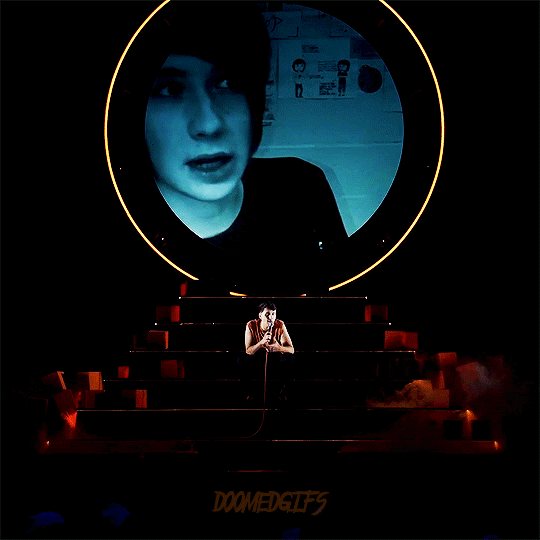
(1) This is definitely what I would call intertext. Intertext is a piece of writing that relates to another or more other writings through allusions. WAD is an intertext which alludes mainly to other works of Dan’s on his YouTube channel. The ability to get the true impact of the show relies on you knowing Dan (as his internet persona) on some level. And as a theatre maker & longtime fan, I love that it is, it’s what the piece needed to be. As a theatre producer, the hiatus from engaging with his audience and the limited runway given to reactivate interest in him and his creative work I think made it difficult to get that audience in some venues, along with some other funkiness (mainly with promo) I am less knowledgeable on. But I think Dan has already learned/continues to learn from that, which I think may have been valuable for him. (sidenote: I need the tea on all that because I love knowing how presenting venues work with performers, as well as the lack of understanding they have of internet culture as it relates to venue leadership.)
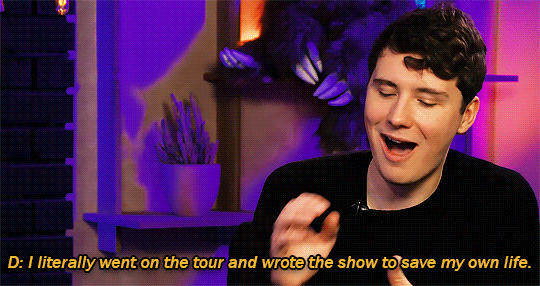
(2) This was a work he made for himself. He mentions this both in the show & in reference to WAD multiple times. But I think what truly came to mind for me was that it is still powerful for him to write for himself. He is writing for what he needs to be hearing or wants to be processing creatively.

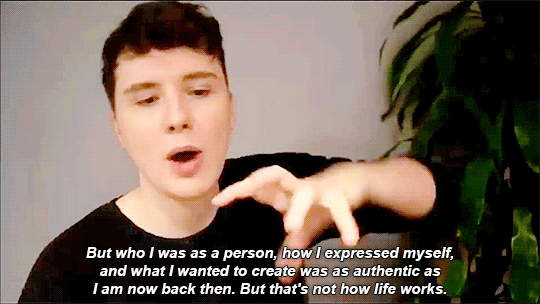
I think why it is powerful is that Dan has discussed before how much stress he put on himself regarding danisnotonfire, and later Daniel Howell, videos, focusing on the audience, and how he was presenting a specific style/quality of video to them. Add in the layer of being closeted & actively fighting internalized homophobia, and the anxiety he built up makes sense. And I might personally attribute that more to his need to pass as straight & catering I believe at one point to an audience of cishet men, whether actual or perceived by him. Not all videos, especially the most impactful ones in my opinion, rely on this, but it was a key piece of what he made during his rise in popularity on the platform. This catering slowly decreased with the amount of uploads he was doing, along with a more tangible understanding of his audience thanks to the tours he did with Phil. Basically I’m Gay I think was the true shift where he gave himself permission to write work that had a main audience of himself. That’s where his best work has come from, and I think since then, he’s been able to have the space to process things creatively through his writing.
--
The Relationship Between Performer & Audience
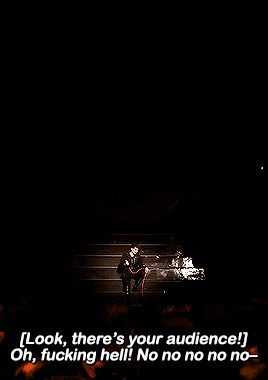
When I was in theatre school, my directing teacher would constantly talk about not just considering the relationship of the performers on “stage” (I did a lot of more immersive work & we only had black box theatres, which is literally a room that is floor to ceiling black) but also the relationship of the performers & the story with the audience. By Dan knowing mainly who his audience would be, the show can now play with that understanding in mind.
This leads to my point that, overall, Dan does not use the fourth wall, and I think that is what makes We’re All Doomed work. It may also be why he called it a comedy show, idk.
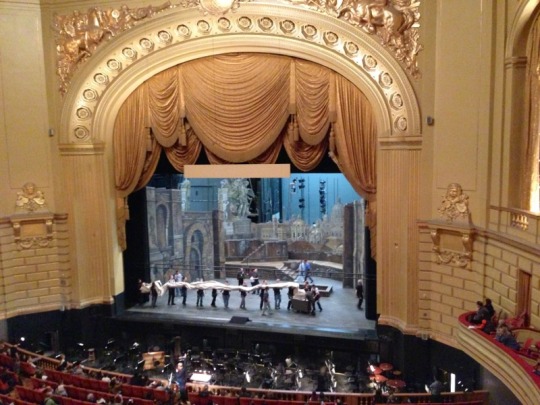
For those who don’t know what the fourth wall is, it is a term from theatre originally that is about the way in which a traditional theatre stage (called a proscenium) has three physical walls around it, while there is no 4th physical wall, so the audience can see the performance. If does exist physically, it is only the curtain that acts as the 4th “wall”. So, in order to keep it as a separation between the performers and the audience, the actors treat the side where the audience is as a fourth wall. When someone breaks the 4th wall, this is when they speak to audience directly, rather than to another character. Examples from English-speaking pop culture would be the asides from Hamlet or Ferris Bueller in Ferris Bueller’s Day Off. But when you are the only person on stage, the only way to have a fourth wall is when you don’t reference that you know there’s an audience there. Hence, a monologue where the character is talking to themselves or an entity that is not the audience directly (or assigned to be the audience by the director), it is the closest you can have a fourth wall when alone.
Dan in his videos and in his previous tours with Phil never were without direct engagement of the audience (obvious with the naming of Interactive Introverts). It was never not a variation on him speaking with the audience in any type of dialogue, even if done parasocially.
Some of that is not new to theatre, but I would say is that it has become more of a trend within new theatre starting in the early 2010s to have more interactivity and a more authentic, explicit message that no performance will be the exact same. I definitely saw that in the shows I saw both Off-Broadway (which sidenote, all that means is that there’s fewer seats in that theatre, not about quality of the work or how worth it is to engage with) and larger settings like Broadway and the West End. That’s what I love about theatre, and why my own work is more about immersion and direct audience engagement.
Now Dan’s creative works have never been skit only or interested in telling a story outside of the realm of connecting with an audience as a variation of himself, so again, him not using the fourth wall overall is appropriate and fits in with what I mentioned about intertext. The piece does however start with a fourth wall for the music number, which I will walk through fully sharing why I am saying that about the song & dance opening after establishing some other concepts to help build understanding.
--
Design Can Work With You or Against You

I just want to say out the gate that the design was done really well, and I immediately felt a need to emphasize it after watching the first 10 minutes again.
First, let’s talk about the orange & black aesthetic of the show. Dan may have simply said that the orange just looked cool, but I think I would attribute more meaning to that color. Orange brings to my mind at first instance both a bright happiness/warmth and a sense of caution and warning, like road signs (at least those in America). The themes of the show reflect these two ideas and plays with the tension between them. I don’t know if he or the team meant to have that be a conscious choice, but there’s a joke I’ve had with other directors of when they get complimented on something unexpected, they just nod and say “yes, that was a choice”, even though it was just a random thing that happened or was something that you just thought would be cool to do. Orange runs through the show’s designs and it becomes clear that it is a tool for contrast and emphasis for the points Dan & the director want to make.
Now with the design team of costumes, lights, sound, and media, I can see a clear cohesion. Good theatrical design has the designs act as a character or highlighter in the story. Bad theatrical design can take away/distract from the core intensions of the show. It was so clear to me that the design was a character. And seeing that there were two media designers make complete sense considering the labor lift of both creating the projections displayed, but also creating/filming pieces of the media itself. The music/sound and lighting work well to articulate the manic feelings it means to instill in the audience and seeing it as a director, I assume part of the creative discussion was about parts of the media played they wanted to make sure were heard, and the lights help catch attentions in service of those pulled out moments. For costumes, I think Calvina did well in her post at articulating the elements of the costume and the progression it goes throughout the show. I’d rather not take up space to say the same thing truthfully.
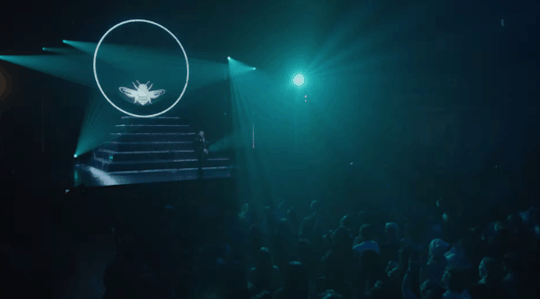
With all the design elements, I think three characters could be defined (not including the audience), two as main characters, and one as a supporting character. I would name the main characters as “the Circle” (the looming set piece throughout hosting the projections used throughout) and “Dan On Stage/Dan performing” (the one in the physical space) with the “voiceover Dan/inner voice Dan” as a supporting character. The voiceover only exists in the beginning, and it is only shared with us to demonstrate the way in which the Dan On Stage singing is not really that aggressively optimistic and wholeheartedly believes the words he is singing. He is not the Dan we know from the Internet, so we can cathartically laugh at the attempt to pretend everything is fine. The voiceover only has one role, and it is to force Dan to confront this breakdown has an audience.
--
Staging an Opening Sequence: Our First Stage Character is the Circle
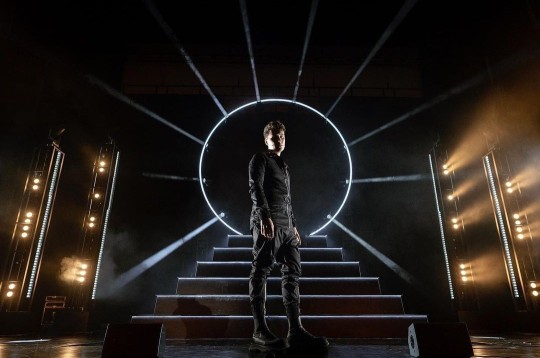
In directing classes, often what you focus on is called stage pictures, which is meant to help you consider what the actual imagery you want to ensure the audience absorbs for their understanding of the piece. The first and last stage moment of each act should tell a basic story of what happened, and therefore, are heavily emphasized as important for directors. The Circle (capitalized for reference purposes) being lit up before the show starts and then again in conjunction with the light flashes and sound establishes the importance of the Circle to the show. When the projection comes into play, showing the speech of a 15-year-old Greta Thunberg before beginning to add more, we are then introduced to the purpose of the Circle to be an output/portal for the overstimulation of messages, in this case, I would claim it being what comes from the Internet.
The music/sound and lighting work well to articulate the manic feelings it means to instill in the audience and seeing it as a director, I assume part of the creative discussion was about parts of the media played they wanted to make sure were heard, and the lights help catch attentions in service of those pulled out moments. The Circle also through some of the lighting moments, mimic that of a clock, which again adds to the doomsday, the "end is near" type energy. To have the end of the opening sequence build to an explosion which then shows solid orange at the end while Dan is in silhouette begins the introduction to the orange emphasis & proposes a sort of prophet-like version of him after the apocalyptic imagery disappears as he rises to be seen. What we have opened with is setting the tone to how we should view these two characters of the Circle & the Dan on Stage.
--
Song Time!

Dan is such a theatre kid & I love that for him. His dramatic side shows through the moment he used a rise to start his show at the top of the stairs, first in a place of seriousness with the sharp lighting and smoke to then bring in a very happy music number. The contrast & switching of expectations is a key of comedic works, and shows through most of the phandom who did not know WAD started with that, as it is indeed funnier if it comes as a shock. The movement & music mimic what folks attribute to as musical theatre, which is campy, happy singing. Knowing he was the one who suggested the song for TATINOF, I am loving Dan clearly wanting to have that opening number of a musical moment, even if it is dripping in irony. The Circle & the lights in this acts as a supporter to the message of it being sunshine and rainbows, with literal rainbow lights included. (Sidenote: I am 99% sure the pigeon coo is Phil, so if anything, I’m disappointed he was not credited as Pigeon sound effect AND remote crisis manager. Idk why I could tell, but both times now, it’s what I immediately thought when hearing that part)
I think of the musical number as the only place where he does have a fourth wall, because the number does not directly reference the audience at the start. It’s a one-man moment and it is about the performance not the audience engagement. It starts falling away when he starts pointing out the “and you”s, but the voiceover is the real break in our understanding of the world. It is emphasized by the color inversion of the sun & sky media of the Circle. The director is saying, this is important to how you now interpret what you’ve seen & will see, this is another shift from what was established of this world.
I should mention “world” is the terminology used to name what the environment the story is being told in with consideration, especially in theatre, of how much of a need there is for suspension of disbelief. I believe this term is also referenced a lot when discussing the fantasy and sci-fi genres, since those also requires some distancing from reality for the audience. This ties into a phrase I will probably end up using a lot of “rules of the space”. When establishing this world for the show you are presenting to an audience, there is a type of logic that must be established in order to understand what is the baseline for what the audience will be engaging with over the span of the show. But the voiceover immediately changes the rules of the space, because it messes with the Dan on stage, and messes with the messaging of the Circle. It adds a new context to the Dan On Stage, as while a fan will know that this song is not in alignment of our knowledge of Dan Howell, we get confirmation that this indeed ironic and outside of the branding that Dan has boxed himself into over his time on YouTube.
But the voiceover is also not in alignment with that “branding”. It expresses concerns related to the Dan On Stage’s mental wellbeing. There is no irony or subtext in that voice, it is the most direct in speaking to Dan On Stage, because it is being said by a variation of Dan in voiceover to himself. These could be seen as questions he knows to ask himself, but as someone who advocates for mental health & shares now about being openly gay, I interpret that he may feel he cannot express that outside of his mind for fear of undermining his advocacy points. The discussion of the “wonders” of the Internet also continue building in the tension that exists throughout WAD of how Dan feels about that space. The voiceover then proposes at first a type of equal extreme, which only sees the Doom, and as someone with clinical Depression myself, I think is only a furtherance of the breakdown, rather than the reality check it started off being. Not that what is listed is wrong by any means, but the barrage of it is meant to expand the drowning feeling, not act as call to action or consideration of the intricacies for engaging in the world. With the Circle’s sun imagery & the music having been inverted and shifted to something more sinister, Dan’s movement up the stairs fits a type of circular moment from the first entry of him, where the image of the prophetic figure is questioned on how he alone will solve the climate emergency. The slap & break of character for the Dan on Stage serves to confirm our understanding of the voiceover as the voice in Dan’s head & indeed there are not two Dans.

Also, the sparklers 🎇 showing up really make the key change for the song, but my producer brain is going, “girl, of course you lost money on this show, was that so VERY NECESSARY?” But the dramatic Gemini theatre bitch in me would 100% want this too. I just don’t have a capita£ester working to get sponsorship money in my life, so I have to be reasonable 😔 Also, the confetti with the high note is peak theatre gay so I again, love that for him. And of course, the confetti is orange.
--
Hints of Orange

When the song reaches its end & the Circle starts showing squares of orange, rather than a full background, this acts as a seed for the breakdown and waterfall of cubes, which Calvina speaks to the orange cube hint at the beginning in her post. The sudden cut-out with Dan simply lit replicates a moment the Circle is not present. The Internet is not present. To crawl to a microphone, the message is not “hey this guy needs two mics”, because we see one on his face, but that the wired mic (which I will now label as “The Microphone”) is a metaphor. It’s a crawl towards sharing out, not suppression. Only when the voiceover of himself points out the audience does he does a full fourth wall break. The suppression did not work, and neither he nor the audience can believe that it was the Truth.
The wire of the Microphone being orange showcases that it was meant to be seen. I don’t think it even in play in terms of the sound, like it might not even be on, considering the feedback nightmare it would likely cause. And no standard microphone used on stages has orange wires, because that would pull the audience’s eyes to it. But that’s the point here.

The rules of the space are now this: the Circle is not always active, the Microphone has significance, the Dan On Stage knows there is an audience. None of these were true before, even the Circle was on before the start. This draws the audience to know there has been a shift & to have the first words said into the Microphone be “We’re All Doomed” solidifies the song moment was a blip, that this is really where we start at. As an example, in the social media section, Dan does a deliberate wrapping of the wire on his hand at the same time the Circle scrolls to the social media icon. It is how the director & Dan are ensuring that we understand “what he is saying and what is been shown on the screen are in tandem”, so if you’re paying attention to that wire, it signals you should look up too.
Every other prop, except I believe the gavel and wig, is also orange. The bubble gun is mainly what comes to mind for me, since the cubes are not as activated as props necessarily. But if an item is to enter the stage, what I interpret it as is that it must be orange, there must be high contrast, nothing in the physical world on the stage can become blurred, only screens have that privilege(?) to have things blend together.
--
The Power Struggle Between Dan & the Circle
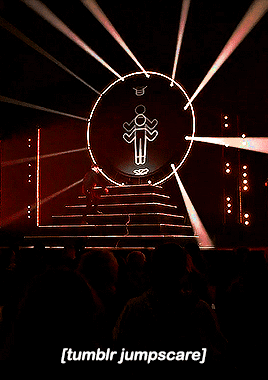
Once Dan has begun directly conversing with the audience, the rules of the space are:
(1) Dan On Stage acts, the design elements react (not including the Circle)
(2) The Circle and Dan have a symbiotic relationship, as neither have complete control over the other & react to what each other are doing
(3) The icons are our guides in understanding the sectioning done throughout the show
(4) Having “One Good Night” is the goal to reach at the end of the piece
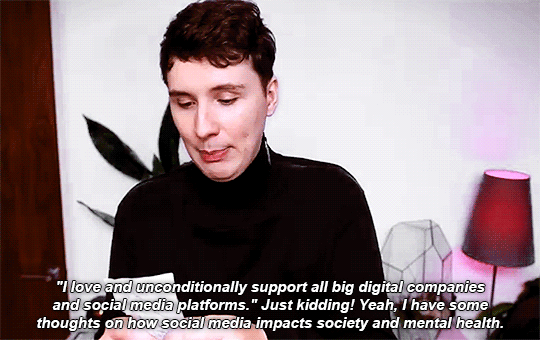
As a person, as well as discussed throughout the show, we know that Dan has a contentious relationship with the Internet. It is what has given him his living but has also caused some of his worst moments mentally (2012? I don’t know her). It is the space in which lets him have an audience who have mainly showed him support, but also the space that has fed the cynicism that fuels his clinical depression. There lies in the way in which the Circle exists on the stage & looms over Dan in the background. It’s a necessary evil of what appears on the screen.
Why do I then say that the design elements are reacting? Well, if we remove the Circle from the equation, the lights, sounds effects, and props are all cued off of something Dan does like the clown honk. However, the Circle sometimes cues off what Dan does, but sometimes instigates what Dan speaks to. That especially is evident when video clips play that invoke what media Dan has been contending with on the Internet and the consequences of those things.
The Circle exists throughout both Act One & Act Two, but only becomes passive to the piece when Dan directly shows vulnerability & the removal of protective irony. Calvina spoke to this when discussing the costume choice of him opening the jumpsuit in Act Two to show the orange tank underneath.
--
Cubes as Articulators
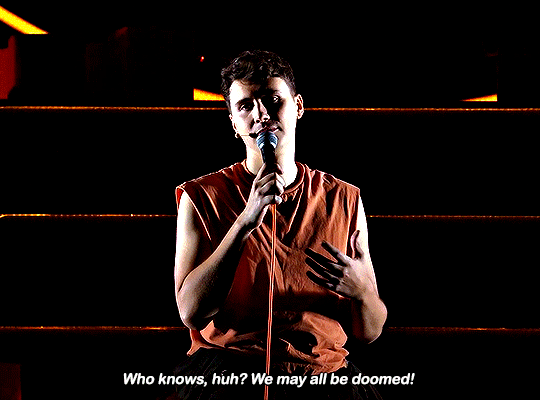
Oh Creator did I have to dig deep into my brain for this term of articulators. So my directing instructor had some key terms that I think I don’t think are universally used, even by American theatre directors or at least in academic settings. She defined articulators to basically be elements that helped give almost like checkpoints for the progression of a throughline in a show. For WAD, that is easily those orange cubes.
When static is displayed on the Circle’s screen each time we transition to a new section, it is not the typical emulation of TV static, it is that sea of orange squares. It is an articulation of those fear, issues, concerns, all those pinpoints Dan speaks to why he says “We’re All Doomed”.
That’s why there is the culmination of the orange cubes falling on him, when he reaches the top of the stairs at the end of Act One. When he circles back to the same stage picture of him at the top, it can been considered a repetition of the prophetic imagery I pointed out from the opening sequence. What changes is that the orange squares enter the physical world, falling onto Dan. He can no longer say they live in his head. They are here and stay in the space until the end of the show. In Act One, they are the looming issues that signal the Apocalypse. In Act Two, they are the rubble that must be sorted through.

Calvina was the one who named it rubble and the cubes as representations of Dan’s problems. To have the audience actually able to take a cube home, she argued, would be symbolic of the audience helping carry that weight. While I’d love that, I mentioned in my tags on her post that I think mentally, that rubble would still be at his feet, even with taking home that visual metaphor. This is Dan we’re talking about, and with personal responsibility being a topic of the show, while it’s not his burden to bear alone, he does have to recognize it exists.

I think the repetition of the prophetic imagery comes to its climax when in the aftermath found in Act 2, voting who to fire into space can and does end up with him being sent by the audience. It represents an understanding of where he exists now from where he did at 18 in terms of social, political, and economic access and the possibilities of his influence. There is a responsibility there that ties to how he can move in the world now publicly, so why wouldn’t he have an existential crisis?


--
It is a Comedy Though, Right?
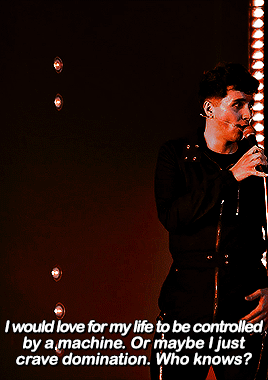
This is hundred percent comedy, and obvious dark humor at that. As a director, I love comedy, especially this type, because when an audience gets to laugh, the armor gets stripped away. They have no built-up resistance that let’s any uncomfortable point be heard effectively. It’s why the end’s vulnerability is effective, because we have already joked and laughed about our pains and our desire for escapism. Now we are able to move on into a place of reflection.
To underline why I say this is not stand-up comedy is that Dan has made it a stage show, just one that has comedy as a vehicle for telling this “story”. His interactions with his audience, through both quips based on audience reactions or “heckling” as well as explicitly asking for input into who to shot to space or what to add as a mad lib (generic brand for law purposes), are about being blended into the loose narrative constructed already, not actually to be reactionary like most crowd work I associate with stand-up comedy.
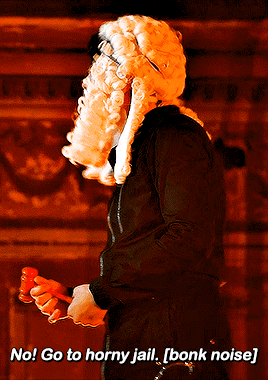
If anything, I could argue that it could be considered a comedy special that “Dan On Stage” is trying to make, but there is actually conflict being introduced that disrupts his set (both the comedy one and the physical one). There is clearly a showing of meta, as Dan makes sure to share thoughts on the creation of the show, the reactions from his overall show branding & imagery, the use of the lift because it was expensive to have. Dan’s comedy style can never be told without reference to behind the scenes, because if this is a creative means to process feelings, there are things about the show & its making that impact what needs to be processed too. It is also related to how his work is strengthened by acknowledging the two-way street of being in a parasocial relationship with his audience.
--
Can We Have One Good Night?
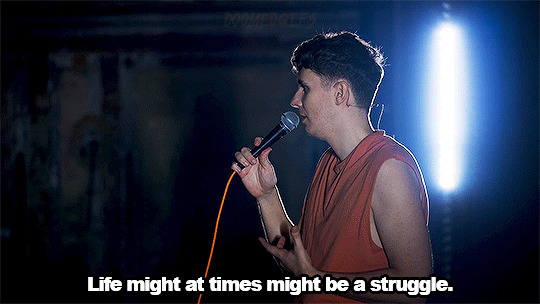
Another term central to what my directing teacher spoke of was the “Core”, usually a question, though not always, that motivated what was being explored over the course of a theatre piece. At the top, as Dan on Stage exaggerates that love doesn’t exist (which Dan refutes as being an actual belief of his during the afterparty) and other sardonic phrases, he also states he wants to give his audience one good night, because he recognizes the escapism his audience finds in his solo and joint content. We’re All Doomed’s Core is “can we just have one good night, even in the midst of the horrors we have outside of these theatre doors?”. But I would also say that in terms of where his writing was at the time of WAD’s inception and the naming of his mental health book as You Will Get Through This Night, it feels more like Dan himself has been grappling with a Core of “can I have one good night? Or a full 24 hours where I feel mainly happy when all I am bombarded with about the world is suffering?” I think night can be both literal, since we know he has had sleep issues, and metaphorical, as the night can represent this depressive episode he was writing himself out of.
When the mood tracker gets discussed in the last portion of WAD, to see a sea of neutral or uninterested emojis demonstrates when he took the time to do it, the answer that night was “no, not really” 😕. The main one mentioned is the ritual of “Fry Day” he has with Phil (sidenote: why are these British men not calling it “Chip Day”, since this ritual falls on a Saturday?), which is a rare smiley face. The question he likely has then is “can I ever have a good night again?”
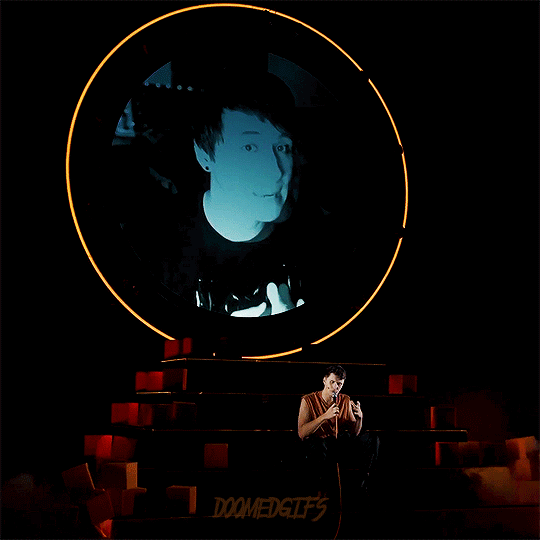
So for him to then turn to his own videos during one of those nights, to a video where he states his famous “embrace the void and have the courage to exist,” that showcases what I mentioned of his best work being written for himself, in this case, a future version of himself.
--
Ending Sequence: Where Do We Land?
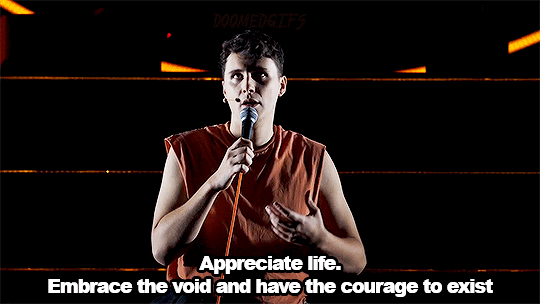
When the Circle does not display any media, it again shows the orange square motif, but after mentioning his own video, he turns to his audience for glimpses of what joy exists even in the face of Doom. The Circle changes into a display of different submitted clips showcasing this joy and hope that Dan was clearly looking for throughout this piece. He walks towards the top of the stairs to witness these clips. I cannot for my life at this point having now been separate from it for about a month, but I believe before the submitted media sequence, he states the famous line again of “Embrace the Void and Have the Courage to Exist”. With this last thing spoken, it gives that emphasis needed to take in the message emotionally and then witness what the Void (in this case the Circle) can offer.
--
A Good Director Should Go Unnoticed
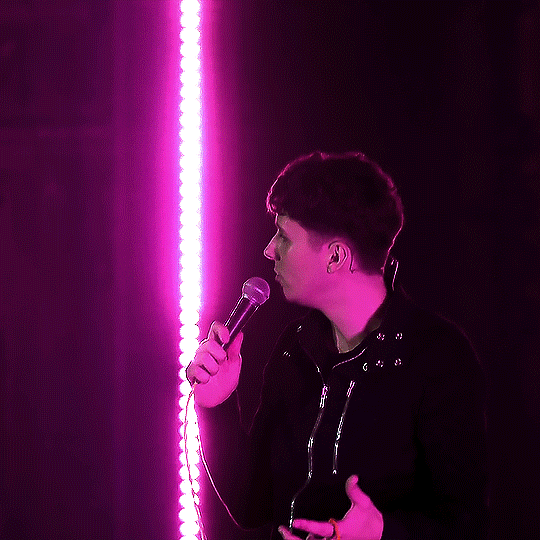
When someone is not versed in theatrical directing, if the audience cannot tell what was a choice by the director or even consider the director themselves, this is weirdly a good sign. It means that it feels natural to what they are witnessing and to the messages that are meant to be communicated to the audience. As someone who also works in government, it feels very similar, as only bad work is evident to the general public. Obviously that is not true for everyone, but is an overall trait I think impacts both an understanding of public service and directing.
I am not familiar with any of the work of Ed Stambollouian, who through research, looks like he has done work with comedians like Joe Lycett (who I am also not familiar with) and directed TATINOF, but also more stripped down, exploratory theatre. Through a quick review of his portfolio, one, I am not shocked that Dan tapped him to assist with directing since there is a familiarity and two, his background tells me he knows how to direct for writer-performers, which is what comedians really are at the end of the day.
To direct for those who are doing one-person shows that they both wrote and performed, it is especially tricky to have the artist hand the reins over to the director. The director in this case acts as the artist’s eyes, because an artist cannot clone themselves. It is impossible for them to wear multiple hats at once, where they can give quality, objective feedback to themselves while also doing a full out performance. For Ed to be someone Dan has worked with before, there is already an established understanding of each other’s work styles, and a trust that otherwise would have to be built up before the work can truly begin to finalize the piece.

In short, Ed Stambollouian and the creative team on We’re All Doomed did an incredible job bringing what I understand Dan intended when he started writing this down in isolation. And @danielhowell you whole-heartedly deserve to call this your magnum opus. What can I say (sorry I can't help lovingly poking fun at you), your artistry shines throughout the show. I hope this too can be something your future self can turn back to.
🧡

(bonus) Thoughts on Orange Carpet & the Phil element
I didn’t fully rewatch the orange carpet, just to keep myself on task & not bring Phil too much into the main reflection without explicit reference in the show, but hearing Dan go “I’m alive in 3, 2…” made me laugh both times. He understands that we just want to know he has a pulse, ya know? Also them pretending it totally was live, when those fools (affectionate) cannot run a real live broadcast from their home for their lives. It just ran too smoothly, esp. in the transitions, for it to be anything but some very, very light editing on one improvised take they did. But I always support them in their acting, no matter how bad, like with DITL Australia’s opener or pretending there were not two apartments or that Google Feud being back was unplanned or Dil being pregnant with a statistically rare alien child or Phil living in a tiled, cramped bedroom or...
Also, Dan’s little laugh at the end of Phil’s sign-off is so fond it hurts. It also hurt that the VOD was hard to scrub through, so another deduction for the Kiswe platform.
Anyway, I’m glad that Dan was able to find space outside of the Dan & Phil branding of the 2010s as well as the image he was forced to manufacture for his YouTube presence, but also realize that with having a core audience that wants him to simply be happy, he can recognize that Phil is part of the things that make him happy. And can do so openly.
He is his own person, but it has been clearly emphasized now that Dan has no interest in not acknowledging that Phil always is and will be part of his present and future. He has made work like WAD & "Gay and Not Proud" to explore his way of thinking without the support of Phil present in the filmed/performed aspect. Dan acknowledges this intention, which is evident with him shooing away Phil at the beginning of “Gay and Not Proud” to process it alone.

It is also evident with the ending of “Daniel & Depression” and the WAD end credit of remote crisis manager showcasing the caretaking role Phil often plays in Dan’s life. But we know that caretaking is reciprocal, considering Phil's tactics with glue as well as his continuing health issues and anxieties. Dan has seen who he is without Phil by his side everyday in the public eye & has no interest in maintaining that Phil is absent for public projections.
I obviously do not know Dan Howell, or anything about him outside what exists on the internet. But in performance studies, there is a foundational understanding that there is no way to not be performing in some way during your day-to-day. Performing is not inherently a bad thing, as there are different roles you take on in your life, where how I engage at work is different from how I am hanging out with friends. This also has basis in gender studies, such as ideas that you can perform your gender "wrong". What has been so interesting to me in this phandom renaissance is the way Dan and Phil each perform as themselves in front of the camera now. What they share out and the layers they include--or choose to not remove--have been stated by them explicitly to be the most authentic they have ever been, without obviously removing their right to privacy. During the height of the glass closet that was their 2018 content, I remember thinking that it was going to be the most they would show us in the vain of "if you know, you know, and we know who will know". After the coming out videos of 2019, obviously that's not true, but the return of dapg has signaled a message of "we know you know, if you've been in the know" while veiled in a way that is not immediately perceivable by those who are casually engaging with their content. It is an authentic portrayal of themselves without filter, while also providing themselves space to not have to announce everything to the world. When you are in the know, it definitely targeted and causes psychic damage, but I am ready for anything and everything they throw our way.
#we’re all doomed#wad spoilers#daniel howell#danisnotonfire#dnp#dan and phil#dan howell#theatre analysis#performance studies#theatre director
70 notes
·
View notes
Text
The Soul Still Burns: Analysis of the Lords of Cinder (DS3)
What follows is a short essay on the Lords of Cinder from Dark Souls 3, exploring their symbolism on spiritual and metatextual levels. After that is a related reading of Slave Knight Gael, the final adversary of the Dark Souls trilogy.
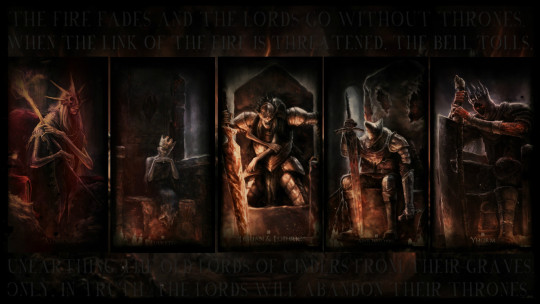
The Lords of Cinder are in many ways the primary adversaries of Dark Souls 3. This title they share, “Lord of Cinder,” refers to a personage who has rekindled the first flame, keeping the cycle of light and dark going.
Cinder is a substance which continues to burn without the presence of fire but does not reduce to ash. So euphemistically, it seems that the Lords are somehow stuck in their process of purification, and the game suggests that the world is stuck along with them; this is why it is the Ashen One’s task to “set them upon their thrones”—to hurry them along and thus allow the world to follow its natural decline. As individual characters, each of these Lords represents a different attitude that complicates and prolongs the cycle.
Through these stubborn Lords the game is commenting on at least two things. On the metaphysical level, it reflects the Buddhist idea that certain attitudes keep people reincarnating over and over again, unable to extricate themselves from the material world of suffering (samsara). While on the metatextual level, the game is suggesting that certain attitudes keep players coming back to Dark Souls again and again, starting new games, making new builds and revisiting old files.
The idea there on the metaphysical side finds an easy analogy in Buddhist doctrine: the “three poisons,” the three root causes of suffering. These are hatred, greed, and delusion. What’s interesting is that these essential vices also fit pretty easily onto the different types of players that are being caricatured by the Lords. We’ll break these correspondences down in a second.
But First: Why Do They Correspond?
So we have these sets of three. Three lords, three poisons in Buddhism, three types of Souls players. How convenient. When we analyze art, we sometimes ask, “Huh, is this structure really there, or am I projecting it into the material?” And if the structure is really there, baked into the work, that doesn’t mean that it’s due to developer intention. Archetypal forms sometimes show up in work via an unconscious influence, be it due to the cultural milieu, personal psychology, or some a priori biological disposition of the human being.
And the thing about Dark Souls is that it’s an unusually honest piece of art, in that its creative team allows their own free associations and intuitions to show up in the work without too much self-censorship or questioning. They make space for a mystery to show up on its own terms, and in leaving its riddles unanswered, there is more space for discovery by the people who play it.
It should also be said that cultural ideas persist for a reason. Beneath the ethics and ideology of the people who originally named the Buddhist “three poisons,” there may be something timeless, something perennially descriptive of human nature. If that is the case, then it would make sense for this same triplicity to unfurl itself in other cultural products. So for one reason or another, these three poisons, these addictions, show up diegetically in the characters and are also expressed in player psychology.
I say all this just because sometimes I feel very aware of the disconnect between much of Souls lore discourse and the broader field of mythological study. Since we are gamers first, there may be this tendency to want to “solve” the lore, but that’s not what we’re doing here. Myth functions because it elaborates our experience of the world through affective resonance; it attaches images and characters and stories which help us anchor our own prelinguistic impressions of the world, cultivating our sensitivity there.
Anyway, let’s look at these Lords.
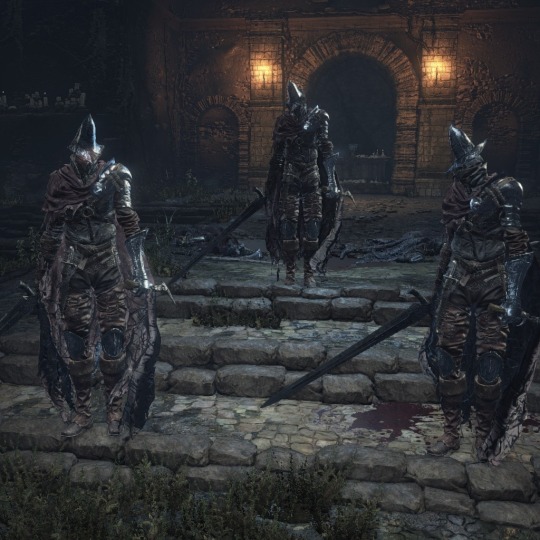
Abyss Watchers
Poison: Hatred
The lore of the Abyss Watchers is pretty clear: they have an obsessive fixation on the abyss, and are ready to raze an entire town if they suspect abyssal encroachment. This obsession has literally possessed them, as they are now “abyss touched.” Gaze too much into the abyss, etc. They carry such strong contempt for the disavowed object that they don’t care what comes between it and their sword. This is clearly demonstrated by the fact that they are a brotherhood yet are unhesitatingly slaughtering themselves again and again. Hatred has made them blind, and has also caused them to resign their individuality (they are identical, mere instruments of a transpersonal grudge). They cannot die, their hatred keeps them locked in combat.
Type of Player: competitive | Interest: combat
The Abyss Watchers are a representation of PvP addicts. They have no powers other than tenacity; they perform the same combos repeatedly. When you are really gripped by a PvP binge in Souls, you often end up doing the same thing again and again. The fight takes place in a mausoleum, on top of many chambers filled with human remains. The fact that this boss fight is instructional about combat, specifically about looking for tells (a cloud of dust always signifies the end of their combos) might be another clue. There is no limit to how good you get at Souls PvP; every foe is an opportunity to improve timing and strategy. You can just keep stacking anonymous bodies under yourself.
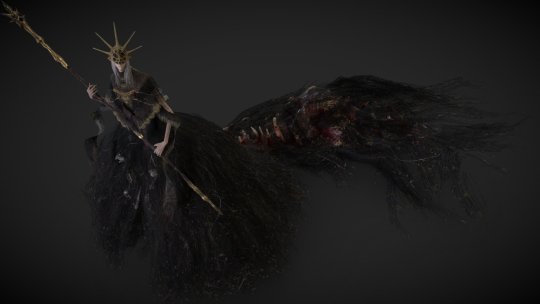
Aldrich
Poison: Greed
Aldrich invokes the concept of supremacy many times: he is in the supreme area from Dark Souls 1; in the supreme boss room of that area; he wears as a crown the former supreme lord of that area. This is because he devours lords; he tries to take prestige upon himself through acquisition and incorporation—greed.
Type of Player: completionist | Interest: content
Aldrich is a commentary on completionist players. He is someone who “plays the game to death”, acquiring every object, reaching every achievement, devouring the soul of the game through taking everything into himself. He becomes bloated by consuming as much of the game’s content as possible. The old God whose likeness he has adopted is Gwyndolin, who was, in narrative terms, the one pulling the strings in the land of the Gods. And in gameplay terms, he is a secret boss. So on both counts we have someone who is elusive, and exists more or less at the boundary of the gameworld. When a player tries to see every last little morsel of a game, they become somewhat like Gwyndolin, a manipulator of a virtual world. If you know too much about a game, you have the risk of being less immmersed.
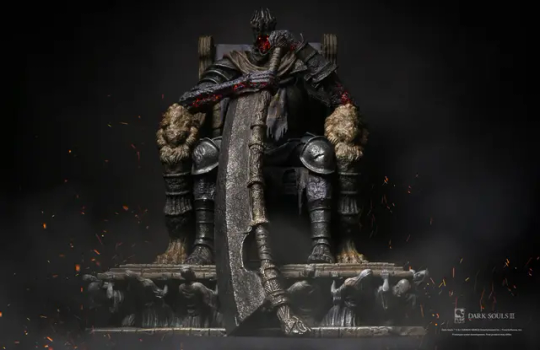
Yhorm
Posion: Delusion
In Buddhism, the poison of delusion secretly underlies the other two poisons, as the impulse toward hatred and greed are ultimately born of some false view about reality. This is akin to how the profaned capital sits below the rest of the kingdoms. To beat Yhorm you essentially have to “play pretend” with him, picking up a fake super-weapon, or fighting alongside Siegward, a knight who appears to be somewhat deluded about the state of the world, enthralled in the same fantasy as Yhorm himself.
Type of Player: lore researcher | Interest: meaning
The profaned capital is full of statues—fixed images of myth; and empty goblets—treasures with no utility. Not to mention the area with the swamp which is full of symbolic imagery, but serves no narrative or mechanical purpose. The entire profaned capital challenges us to make sense of it; it is the ultimate temptation of lorekeepers in DS3. It throws at us a disproportionate amount of reference to DS2, which is famous among Souls players as the least thematically sensible Souls game. The Greatshield of Glory is found right outside Yhorm’s room, in a conspicuous room full of treasure, and yet it is a very impractical shield and offers very little lore value. If a lore-minded player picks it up, it directs them to a legendary personage from the War of Giants, which raises far more questions than it answers. The same is true of much of this area—the Eleanora, the Monstrosities, the Profaned Flame itself—they are all there to get you to speculate. These are the players who come to Souls games again and again, trying to find the “ultimate meaning.” They seek the grail, claim to find it, and then chuck in a pile with the others.
Yhorm's story also imitates the primordial Artorias myth: forsaking his shield in preservation of something more valuable. Other than that Yhorm is largely a cipher when it comes to biography, with a void for a face, which itself epitomizes what must remain at the center of mythology and storytelling: mystery.
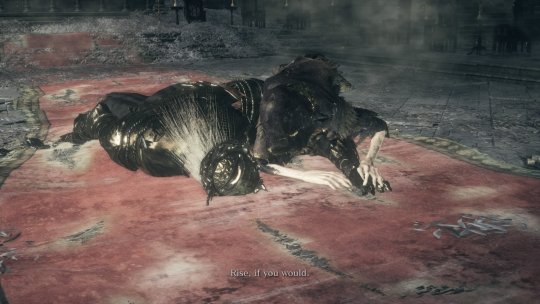
Sit Down and Seek Guidance
So we have the three reasons that people become fixated on Souls: the combat, the achievements, and the mystery. But there is a fourth lord of cinder boss, who is conceptually apart from these three: the Lothric Twins. They represent yet another kind of person who must keep playing Dark Souls: the developers. Lothric is striving to produce “a worthy heir,” a proper sequel to Dark Souls 1. The Princes are bound to their chamber as the developers are bound to their project, as that is their curse—“but you may rest here too, if you like.” In this context we can see their duality as the dual nature of having to work on the game and also play it to death. The privilege and the loftiness of the promise of a great piece of art (Lothric), and also having to go back "into the trenches" of the work itself (Lorian). Notably, neither of them can walk, they just teleport around. They are stuck at work, trying to bring the new world into being. Also I can’t go this whole essay without mentioning the obvious: that the Ashen One is bringing Lords to their thrones, and we players and developers have to assume our little chairs and couches when we access this world.
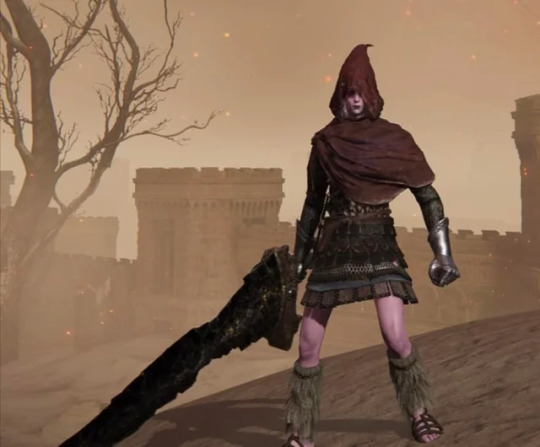
Playing Beyond the Point of Pleasure
Of course the most extreme example of someone stubbornly remaining in the world no matter what is Slave Knight Gael. He is looking for pigment, which seems to be a euphemism for the substance of humanity (the Dark Soul). He wants to give it to the painter, the world-creator, so that a new world can be made. He is willing to indulge in a wasteland of abject violence for as long as it takes in order to renew something. Ironic that he is probably only prolonging the current world in his obsessive drive to recycle it faster.
Let’s examine the relationship between the figure of the painter and her relationship to Gael. That she is a spiritual entity is obvious: we never see her touch the ground, she is always in an upper room and lifted on a piece of furniture. Among other things, she is a clear metaphor for life springing eternally. A creative child who continues to paint despite kidnapping and imprisonment. She is the heart of the painted world, itself a place that symbolizes the idea of the representation of reality.
I want to make sure this is clear, because it is a bit of a kaleidoscope to consider. Any subject in Dark Souls stands for many things, but something that the painted world specifically represents is the very concept of representation. So of course the places in our imaginations are painted worlds, but so is this physical world of appearance, the maya of mundane reality. Not to mention that a work of art is a painted world, and the game we’re discussing is a painted world. When a work of art is able to recreate itself in itself, we can see this funny effect of mirrors reflecting mirrors infinitely. This results in seemingly inexhaustible symbolic content—there is so much potential to find meaning and create connections. Because Moby Dick represents a work of literature; the Tempest represents a play; Twin Peaks represents a TV show, these works can offer extensive insights not only into their medium but into the nature of reality. In these and other examples, the representation of the medium within the work may or may not be a single subject, but since Dark Souls is formally a game about levels and level design, the painted world is the heart of its self-reflexivity. The painted world can be pointed to as the summary of this fractal device. And the personification of that device, its ambassador to the player, is the painter.
The miracle or divine child is also an archetype familiar to us from Lothric, in their struggle to produce the “worthy heir.” Reality seeks salvation through the appearance of grace. They want it in a clear, incontestable form—to be able to point at it and say, "thank goodness we went through all that, because look, now here is the meaning, here is that which validates all that came before." In the world of Dark Souls 3 the religion of the masses is the Lothric stuff; meanwhile knowledge of the painted world is much more obscure. Lothric’s religion is obviously regulated and hierarchical, while Gael’s devotion to the painter is highly personal and private: he carries around a scrap of painting; he prostrates to a hidden idol in a small chapel; he considers the painter his family. He is emotionally close to the object of his worship.
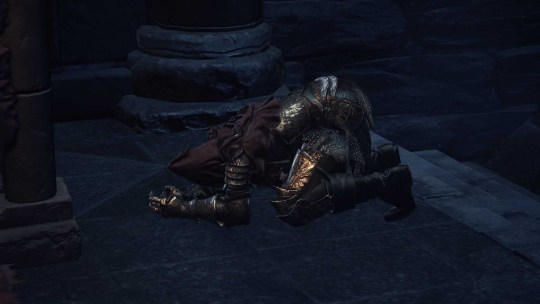
But whether it’s Lothric or Ariandel, they are anticipating the divine child to redeem the world. As an archetype, the child ultimately represents surprise. The possibility of being delighted by life in its creative novelty. The child as an archetype appears in our own behavior when we do something without any sort of contrivance or mental interference, doing something in the world which doesn’t seem to have come from who we conceive ourselves to be. This is miraculous. Such an action enchants the world, and there is no explaining it, even if it may weave all kinds of stories around itself, retroactively framing things that have led up to it as portents or promises. (Though not exclusive to him, this trait is well-known in characterizations of Christ, and DS3 is clearly indebted to Christian iconography, so do with that what you will). Regardless of the specific cultural invocation, the divine child is a personification of something that happens within the human spirit. TFW you are renewed by a fresh and spontaneous engagement with life.
The grace of the miraculous often comes to us through play. Play is more of an attitude than an activity; the feeling of play may come to us through making a painting, or chatting with a friend, or moving around in a video game. We can play video games idly, competitively, experimentally, creatively, studiously, whatever, the feeling of “play” can show up regardless. We can sit there playing a certain game from a certain motivation, and feel totally rote and joyless, and question, “Why am I doing this?” Or we might sit there and play the same game with the same motivation, feeling totally lit up by it, its purpose to us obvious and self-validating. We are not even questioning why we are doing it, we are enjoying life.
This is really the ground that the miraculous tends to land on. Grace, meaning, and an immanent love of life are more likely to show up when we are in flow and not exercising our capacity for self-assessment. But like everything in life, we mistake the images and objects around us for the feeling of grace. Any given object might only be the catalyst once; it’s not about the object. This is extremely easy to see in cases of acute nostalgia; adults chase enchantment through collecting Zelda memorabilia or going to Disneyland, in pursuit of what kindled their spirit as a child. It was never really the game or the character that was doing it, it was what they were able to access within themselves.
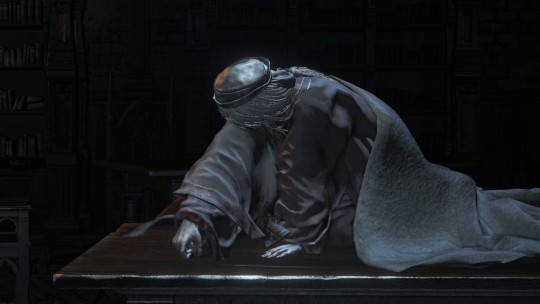
So anyway Gael has yet to realize this. He thinks the Dark Soul is out there in something else. That it will be yielded as a drop if he just kills the right enemy, or 10,000 enemies, or goes to the right place at the right time. You can see that this is something of a synthesis of all the other Buddhist defilements: there are elements of completionism/greed, violence/hatred, mysticism/delusion. There is even the suggestion of the developer of these games again, in that Gael is a “slave,” forced into participation in the world to assist some creative apotheosis. (Isn’t it funny that his weapon is a worn-down executioner’s sword?—whether the person coding or the person playing, we are all “executing” command after command). The thing that really keeps him on the wheel is something beyond any of the player types and their vices; it is almost some sort of pure, amoral automatism, a churning drive that on one side resembles wanton nihilism, and on another side single-minded piousness. Is one disguised as the other, or has Gael somehow stepped beyond this binary? Yet another dichotomy in Dark Souls that begs to be reconciled, but whose tension creates the opportunity to participate creatively in its expansive mythology. When things are held apart we can move between them.
To really understand Gael, we have to contend with the question of a person’s relationship to their own soul, since that relationship is so plainly suggested by Gael and the painter. (This question, by the way, is much elaborated in Elden Ring, with its repeated foregrounding of the image of the maiden or “consort”). If we were to see Gael and the painter as partitions within one person--whether she is his soul, or his inner life, or his better nature, whatever—then in any case Gael is the side which goes out into the world and experiences it. He is the creative extension into the world as its active participant and realizer. Yet he is clothed as the warrior, the executioner. While the one who is dressed as the artist, the painter, just stays in her room and imagines the world—but this is where the magic of creation is really felt. We involve ourselves in life, or in a game, but we are only really changed and renewed when that exterior experience is “brought home” into the inner life. We do something “in the game,” but the act of “painting,” in renewing the world through our creative interpretation, is a decidedly interior experience.
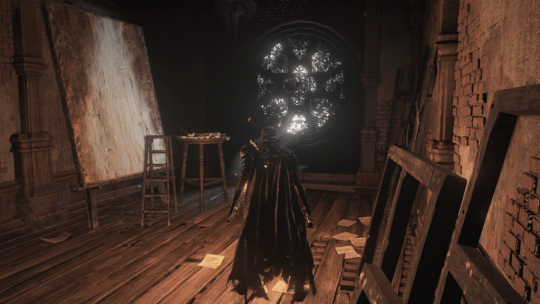
#dark souls#dark souls 3#lords of cinder#game entrainment#dark souls analysis#dark souls lore#ariandel#slave knight gael#the painted world
74 notes
·
View notes
Text
Kieran’s story as a loner champion rival character who challenged the game narrative + parallels with the DLC legends - another character essay
Okay, so this is another long rambling of mine that is probably an overthought (and reflective of past analysis) but anyhow, I like to think that Ogerpon, Terapagos and Pecharunt represent certain aspects of Kieran’s arc (albeit not in order). Although Kieran says himself about how he wants to be like PC/us, to be strong like the hero of the story, he outshone others in terms of being a protagonist; not in terms of simply as a central focus of the story but his desire to acquire qualities of a protagonist, which is very evident in his dominant role in the story. Kieran was a protagonist (along with Carmine) but not the main character in terms of the conditions it came along of being one.
To start, Ogerpon being a social outcast due to a great misunderstanding of her display of strength and act of self-defense as a threat is ironically picked up Kieran through his projected image of a strong “oni”; he later becomes this feared champion whose standards pushes out and judges others based on strength. Consequently, other students view him as overly stern and restrictive. He adopts that oni image and its attributed value of strength in who he sees himself as and subconsciously shows to others. Obviously the context of these circumstances are different, but Kieran ends up with a poor reputation just like Ogerpon did (He also takes the "treasure" - in this case Terapagos - like the oni which stole treasures in the tale of Momotaro).
Secondly, terapagos and its too short arc represents the full extent of Kieran’s desire, his potential and who he is; a reclusive, small being who possess great power and status, which, with neglect, caused great changes when it came to the tipping point. Moreover, Terapagos is the "monarch" of area zero, as evident with the tera crown, just as Kieran was the Blueberry champion/king. On another note, his quote of "I don't need my old self anymore - I will show you that I can change again!" resonates with the idea of transforming - physically and mentally - in conjunction with the terastalization, ultimately becoming who you want to be (penny says this as well).
To add further on, Terapagos' berserk state paralleled with Kieran’s monomia of battling and power (demonstrated in his behaviour at the championship match) that long affected his own well-being and his surroundings. The funny thing I personally noticed is that, Kieran took over that role of “control” as opposed to his possesion under dokutaro theories by capturing Terapagos and using it as a final resort to achieve his goal.
Likewise with Pecharunt's motive, Kieran was someone who deeply wanted something that resulted in the harm of others and himself (also mentioned in the case with terapagos). Kieran wanted not just strength, but also honesty and appreciation (form of love) from others. As our miscommunication led him astray, it persuades him that his self-worth is only found in strength (physically and mentally as a trainer and person), and that battling is no longer fun but a measure of worth, a trial determining the strongest who would outlive the weakest. He worked so hard to fulfill his goals for his own sake yet simultaneously for you in that sense of being proven wrong.
He gave up so much of himself by devoting his time, energy and studies to bettering himself (which is very ironiccc). Similarily, Pecharunt gave so much in return for its desire to be loved more - it took as it gave. Both have a warped sense of the things they love (or love in general) in their own respective ways. For Kieran, battling was a test of worth and that the things he liked ought to be strong. He went through such a training arc just to prove himself to you (he outright says so). Again, I repeat, Kieran did this all to fight you, ultimately to prove to you and himself that he made the right choice, that the effort for going through all of this was worth it.
Pecharunt went through all the trouble in seeking out the masks just to appease the couple (I would admit this just ties to the theme of treasure and its consequence with obsession in general, but this analysis aims to focus on the connection between the characters on a specefic level). Its grasp of love comes off as materialistic, more so conditional (same way applied to Kieran = battling in which determines one's success that is only found in strength; that to be a friend/rival, he needed to prove himself).
I have no epic quote/ending for this, oh well (it came off better in my head).
edit: grammar issues and revised idea phrasing
#ac rambles#kieran pokemon#pecharunt#the teal mask#terapagos#Ogerpon#pokemon scarlet and violet#pokemon sv#rival kieran#pokemon kieran#Don’t mind this incoherent wall of text#I just wrote and zoned out
78 notes
·
View notes
Text
It has come up as of late, yet again, regarding the use of the term phantom limbs while referring to the experiences some alterhumans have where they feel traits on their bodies that are not physically there.
While I could go into the long, long history of the term being used in the alterhuman communities going back into the 1990s, as this debate’s key sticking point is in regard to phantom limb being a medical term specific to the experiences of amputees or instead a general term that can be used for non-amputees as well, I’m going to strictly be pulling from academic sources below.
To put it succinctly, the use of the term phantom limbs for alterhuman experiences has been recognized by multiple researchers and in other academic settings over the years. Ergo, no it isn’t a term specific to amputees that doesn't apply to alterhuman experiences.
- Academic references below cut-
Examples:
The research done by a multidisciplinary team of researchers focusing on the study of the furry fandom called the International Anthropomorphic Research Project, uses the term phantom limb while referring the experiences of therians and otherkin. In their book, FurScience! A Summary of Five Years of Research from the International Anthropomorphic Research Project, which is a summary of five years of continuous research into the furry fandom, a section simply named “Phantom Limb,” touches on the topic of phantom limbs among furries, therians, and otherkin. [1] They go into the presence of “phantom limbs” among furries, therians, and otherkin again in their piece “Furries, Therians, and Otherkin, Oh My! What Do All Those Words Mean, Anyway?” which was part of the book, Furries Among Us 2: More Essays on Furries by Furries. Further, in 2019, the team published an academic article which shared their results where they used the previously mentioned Rubber Hand Illusion experiment on furries and therians. Once again, when bringing up the existence of experiences among therians and otherkin, the researchers use the term “phantom limbs.” [2]
Devin Proctor’s 2019 dissertation, On Being Non-Human: Otherkin Identification and Virtual Space includes, along with dozens of mentions of the term throughout the work, a section on Phantom Shifting and in which he uses the term “phantom limbs.” [3]
For yet another example, the article, “An Interpretative Phenomenological Analysis of Identity in the Therian Community” also goes into quite some detail regarding the experience of “phantom limbs” among therians. [4]
A final example includes Nat Bricker’s 2016 thesis, Life Stories of Therianthropes: An Analysis of Nonhuman Identity in a Narrative Identity Model. [5]
…
This is NOT an exhaustive list in the slightest, but I think I’ve made my point clear enough (and I have other things I need to do today other than keep searching through my archive...).
TL;DR - Researchers who have studied therians and otherkin ALSO use the term phantom limbs to describe our experiences. This isn’t appropriation or otherwise misuse of medical terminology. This is using a word for what it means.
Citations:
[1] Plante, Courtney N., Stephen Reysen, Sharon E. Roberts, & Kathleen C. Gerbasi. FurScience! A Summary of Five Years of Research from the International Anthropomorphic Research Project. Waterloo, Ontario: FurScience, 2016. https://furscience.com/wp-content/uploads/2017/10/FurScience-Final-pdf-for-Website_2017_10_18.pdf, page 116.
[2] Kranjec, Alexander, Louis Lamanna, Erick Guzman, Courtney N. Plante, Stephen Reysen, Kathy Gerbasi, Sharon Roberts and Elizabeth Fein. “Illusory Body Perception and Experience in Furries.” CogSci (July 2019): Page 596-602.
[3] Proctor, Devin. On Being Non-Human: Otherkin Identification and Virtual Space. The George Washington University. May 2019. pages 172, 203-209, & 255.
[4] Grivell, Timothy, Helen Clegg & Elizabeth C. Roxburgh. “An Interpretative Phenomenological Analysis of Identity in the Therian Community.” Identity: An International Journal of Theory and Research. Volume 14, Number 2 (May 2014): pages 119-120, 124, 128-129.
[5] Bricker, Nat. Life Stories of Therianthropes: An Analysis of Nonhuman Identity in a Narrative Identity Model, Lake Forest College, April 2016, pages. 10, 14-15, 39-41, 60.
#alterhuman terms#phantom limbs#supernumerary phantom limbs#phantom shifting#research into alterhumans#I don't mean to come across as harsh or snippy#it's nearing the end of finals week and I am in need of a break
131 notes
·
View notes
Text
Lore Olympus Art Analysis - Getting to the Bottom of It
For ages now it's been a common point of discussion - what's the process involved in Rachel's creation of Lore Olympus?
As a community, we've all discussed and speculated Rachel's process among herself and her assistants and how it seems to result in cheaper art each week. Same face syndrome, the overuse of the multiply tool, the dull backgrounds that often enter nightmare fuel territory, the lack of color vibrancy compared to Season 1, the repetitive poses and shots, the theories that different assistants are handling different aspects of individual panels, the clear lack of buffer, the list goes on and on.
But I think we've finally gotten to the bottom of what's going on. Or at least, deeper than we've gotten before and it feels like now we're closer to fully understanding Rachel's process than ever before.
Normally, I wouldn't care this much about dissecting the steps of creating a comic. Everyone's process is different, and when you're working with a team, that can introduce a whole new layer of understanding. I've worked with my own assistants in the past, trained to work in the animation industry which relies on coordination between people, and fully understand what's required to go into making a finalized piece of work put together by multiple people. All that's to say, having assistants doesn't necessarily mean you do less work.
When it comes to LO, though, I do feel this compulsion to tear into it more because Rachel seems to completely lack this understanding, and it shows in her work.
Before I continue, I want to throw in a quick disclaimer - when we criticize Rachel's art, it's not to throw any of her assistants under the bus. All of her assistants are incredibly skilled in their own right. When I criticize Rachel's art as a whole - regardless of who helped shape it into its final form - I'm criticizing not just the art itself, but her direction. Rachel is, essentially, a director of a team, and how she manages that team reflects how her work looks in the end after it's all been put together. I will be showing pieces of art from her assistants in this essay, none of this is to promote any shame or hate towards these people. This is purely an essay speculating on Rachel's directing capability and how she manages her team and is not meant to be taken as objective fact beyond what I am capable of proving as an outsider looking in. I consider her assistants people who are just being hired to do a job, I do not condone holding them responsible for the nosedive Lore Olympus has taken in quality over the past few years. These are simply points and speculations that myself and the ULO community came to after discussing it at length.
Alright, so, where to begin?
This essay started with me having a simple conversation with @loreolympusminoredits over on Instagram. They had pointed out a couple panels from a recent free episode where you could see the texturing wasn't being applied properly. You have to look really closely, but once you spot it, you can clearly see the outline of a square where the texturing block wasn't repeated.
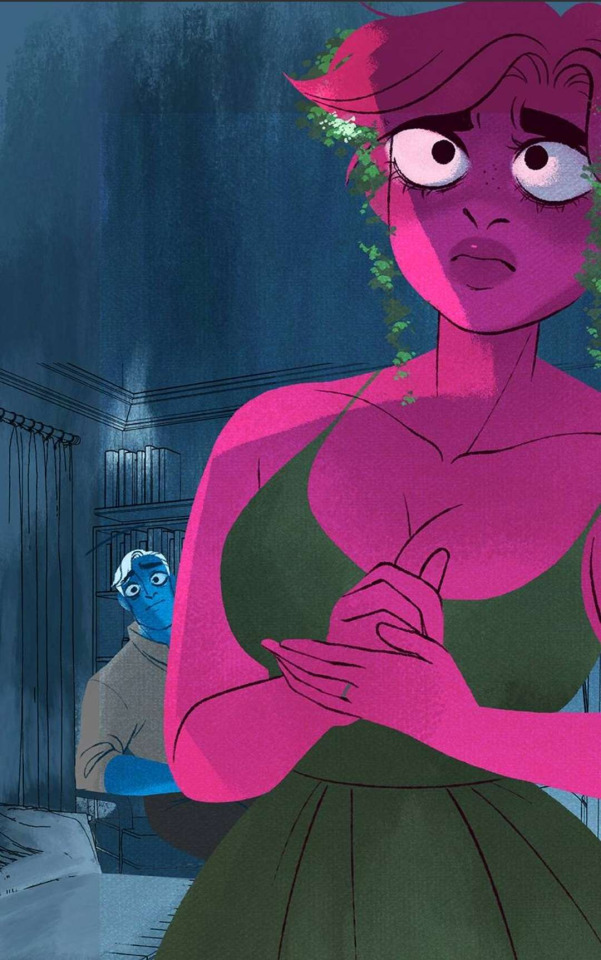




It's VERY obvious in this last panel of Hades, look along the back of his shirt, you can clearly see the color warping from the texture block overlaid on top of him.
Now, I have a few theories for this on its own, it really depends on what drawing program these assistants are using. Some of them use Clip Studio. Others use Procreate. There is no consistent requirement in workstations or software among the team, which is Rachel's first mistake. There's a reason why the animation and film industry requires everyone to be using Adobe products whether they like it or not - because it keeps things consistent across the board. It doesn't matter how good you are at Clip Studio or how much you like Procreate, you need to be on the same software and hardware as everyone else to ensure that you can access the same tools, brushes, and workflow as the rest of the team. No one wants to have someone working primarily in Clip Studio who can't access the same brushes or files as the people working in Adobe. As much as I personally hate working in Photoshop, if I were to get an industry job, I would be expected to work in Photoshop, no questions asked. It's part of the job.
Moving on from that, this led me to wonder which assistant was doing these panels, because it's clear that this texturing problem is mostly at the end of Episode 242 during the Persephone / Hades conversation. There's also one stand-out feature that tells us it's the same person making these panels - the bobblehead necks.
Bobblehead necks have been a very noticeable feature in the comic's art decline over the past while. They typically happen when a character - especially a female one - is being drawn from the front. They're usually also defined with noticeable jugular and collarbone lines.

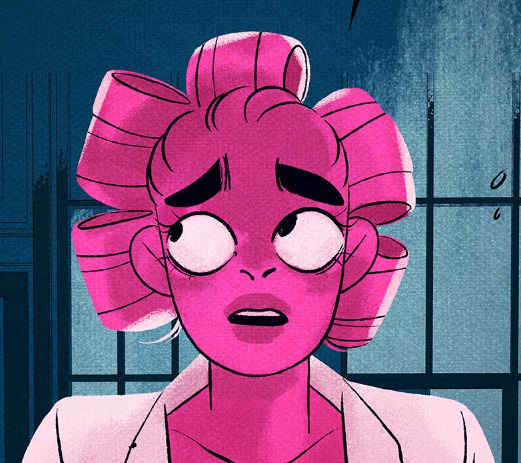


So, which assistant is it drawing the bobblehead necks?
Rachel's art team switches up a lot. Sometimes she has 3, sometimes she has as many as 8. Some assistants tag in, others are consistent.
So far the most noticeably consistent assistants in terms of participation since S2.2 (i.e. post-time skip S2) are Dnaeri, HardHeadedWoman, AmyKing89, and HeyItsJaki (as credited on their episodes). They're the usual team credited at the end of episodes, with the exception of maybe one artist not being present or an extra artist tagging in.
Upon checking their Instagrams, I am becoming way more certain of who does what and how Rachel does her process.
Let's start with HeyItsJaki:

Very thick lineart, distinguished collarbones, defined fingernails/fingers. Thick shading underneath the neck. Sometimes pouty lips if the expression calls for it.
Now let's look at HardHeadedWoman:

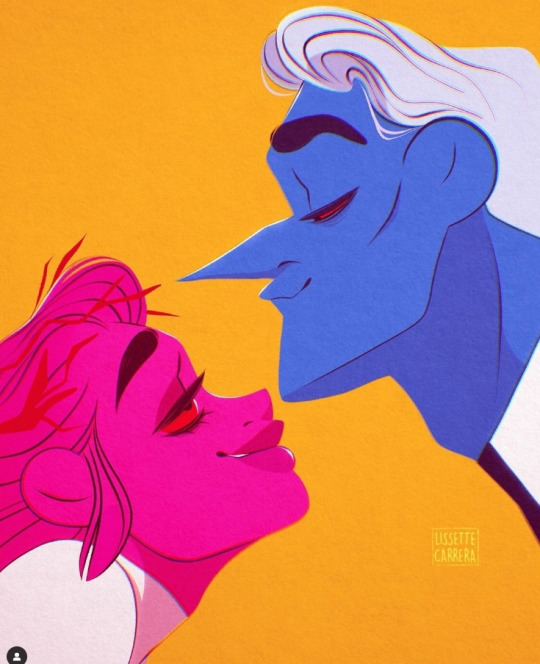
Very Disney/Warner Bros reminiscent art, with most notably, thick necks and distinguished jawline features on guys and hourglass figures/thin wrists/thin fingers on women.
And then we have Dnaeri:

It's harder to pin down her style because she seems to just draw whatever she's feeling like, but most notably are how she draws hands and collarbones, very similarly to Jaki, but with one noticeable difference - softer and rounder lines and shapes.
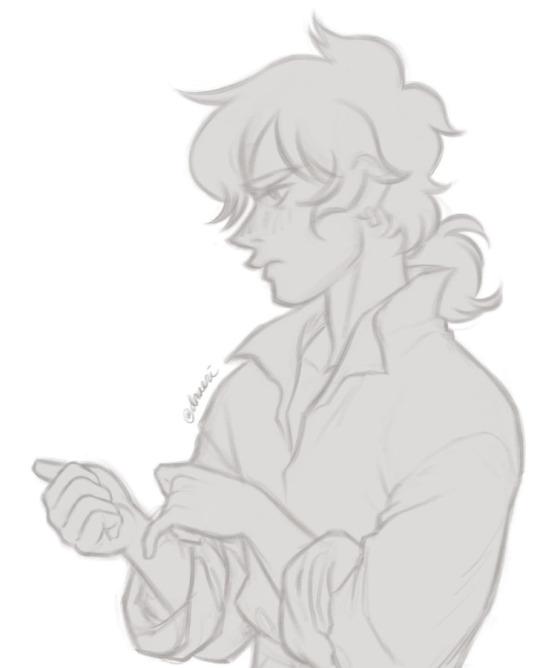
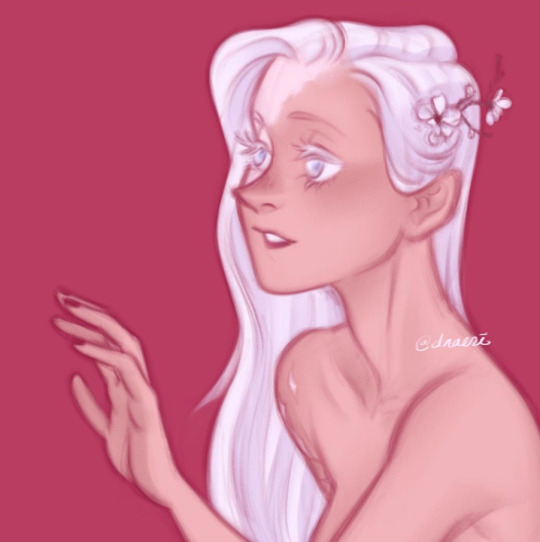
The irony is that Dnaeri and HeyItsJaki both have the same name - Jaki - so them having similar tells in their styles is just something I wanted to point out. Just a funny thought.
That said, Dnaeri DID post a drawing of Persephone once in her own style/interpretation, and there are definitely things to note here.

The collarbone distinction. The anatomy of the fingers and toes. The lighter lineart. The little 'dip' along the edge of the smile.
Moving on. Let's talk about the last assistant who I feel deserves a specific mention - AmyKim89.
You see, Amy is what I'm going to call the smoking gun. All thanks to this post:

Recognize that panel? That's the flat of Dream Persephone from Episode 204.
And this is what the final panel looked like.

Now, Webtoons cropping aside (don't mind the seam running through Persephone's chest) this confirms multiple things for us.
1. AmyKim89 was not the one to shade this panel.
2. The assistants are working purely off Rachel's sketches.
3. The assistants can be in charge of their own lining, which would explain the inconsistent lineart throughout each episode.
4. There are no backgrounds present meaning someone else is in charge of the backgrounds.
5. Flats can be changed and added to after the assistant has already done their job.
To talk about #5 first, notice the pantyhose that were added that make her legs disappear into her cloak. The baby's face changing. The added flower and necklace. Her eyes changing direction.
Regarding #1, look at how the shading makes the art so much more dull. The previous version of this panel with just the flats genuinely looks so much better than the finished piece.
This was, as I'm sure you can imagine, a pretty big find. While I'm sure Amy would probably not be happy to see me using her innocent post as proof for my hyperfocused ramblings tearing apart Rachel's process, I'm glad she posted it nonetheless because it finally shows us a smidge of what the process might be like during production.
Going back to the shading really quick - Amy was not the one who shaded that panel. But I did notice that out of every little inconsistent thing in LO, the shading is some of the most consistent, and it's consistently awful. Dull muddy tones, lack of consideration of space or lighting, clearly the multiply tool being used even when it really shouldn't be, placement of shading primarily under the eyes even when it makes the face look too dim to look good.
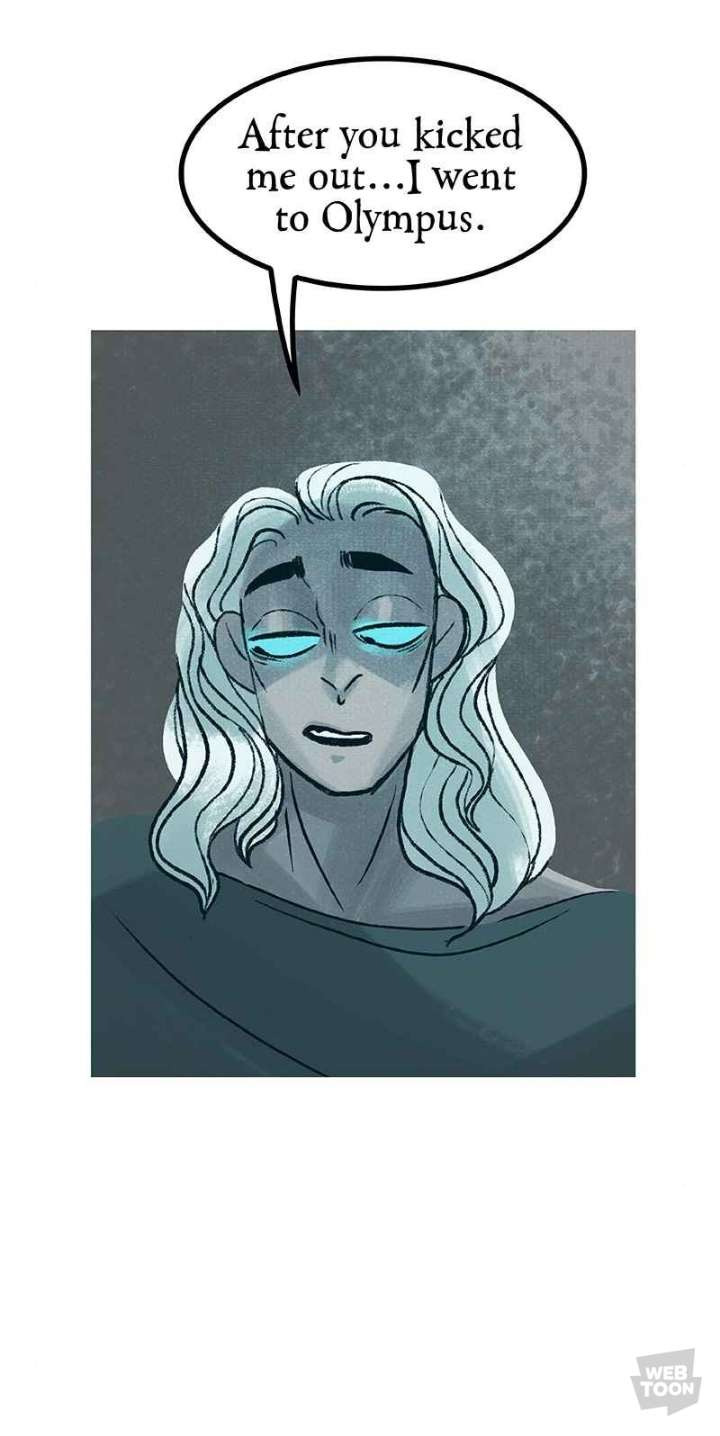
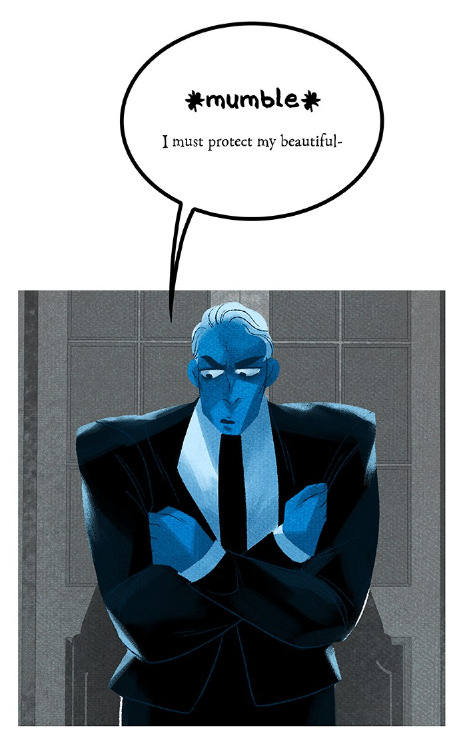
It's always being done with the same watercolor-like brush, with the same multiplied tones, and the same 'edges' along where the shading hits the light.
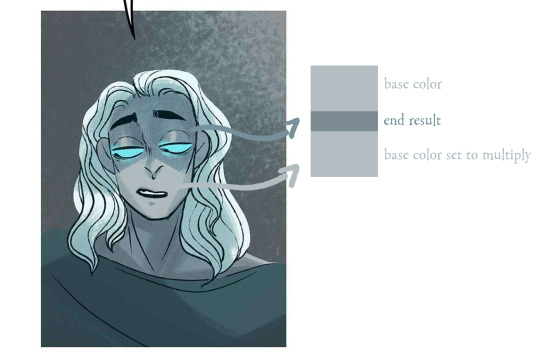
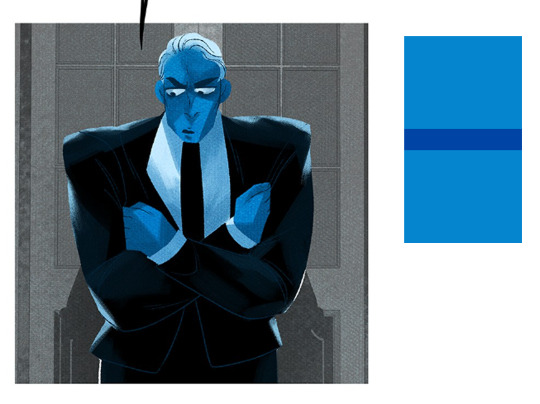
We also know that Rachel eyedrops her colors.
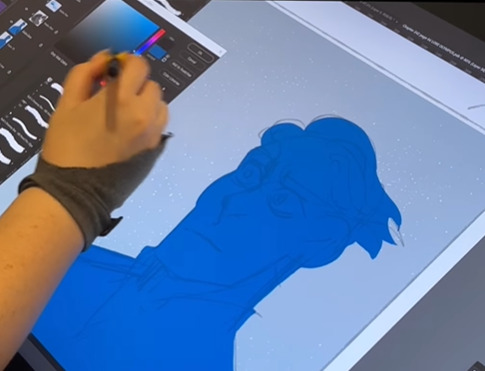
I don't think it's farfetched to believe that her assistants likely do too to a degree. Or they're working off color palettes from previous episodes they've done before which is resulting in this color dissonance where characters change colors, sometimes in between panels.
Considering the constant muddy shading, and the fact that the assistants may not be doing it, I believe it's Rachel doing the shading in the post-production. If you need more proof, here's a reel of her shading in Hades with the exact same techniques seen in finalized panels.
instagram
Otherwise, if it's not Rachel doing the shading, it could very likely be Dnaeri, as they're one of the longest-running assistants on the team (they came on during S1).
Moving on from that, let's circle back to AmyKim89's drawing of Persephone. She specifies she did the flats and lines for that panel, working off Rachel's sketches. But one noticeable thing is that there's no background.
This lead a bunch of us in ULO to speculate that Rachel is also the one throwing in the background and throwing PNG's of the characters on top.
Proof? How about the fact that there are panels out there with crunchy characters and pristine backgrounds?
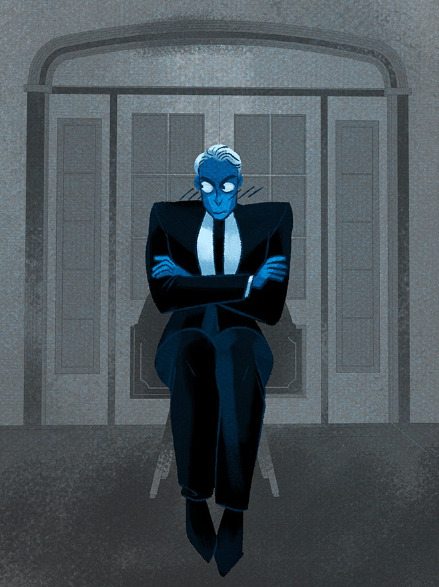
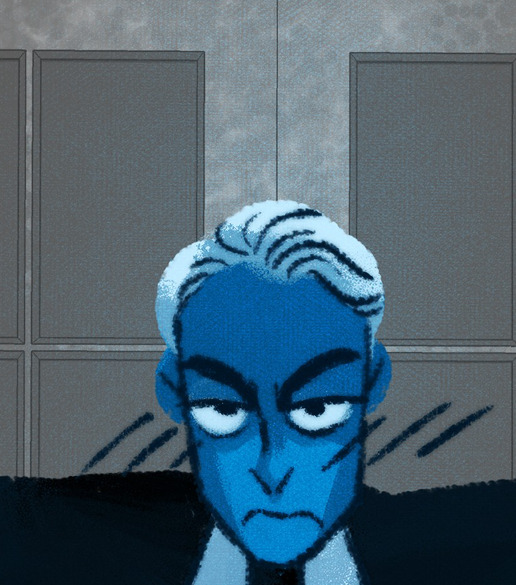
I already suspected that the character was zoomed in and the background wasn't, but Amy's post confirms more than that - that the assistants are essentially drawing PNG's which don't get backgrounds until Rachel - or another one of her assistants - adds them.
Here's another panel that I strongly suspect was done by Amy judging by the colors (but the lineart feels like it could be Jaki):

Look at how she's floating in empty space. This wasn't drawn background first and Hestia second, this was drawn with Hestia first and they slapped a background behind her.
It would also explain why we get panels of characters missing their bottom halves or their limbs - because the backgrounds ended up being larger than they were anticipating in the final shot.

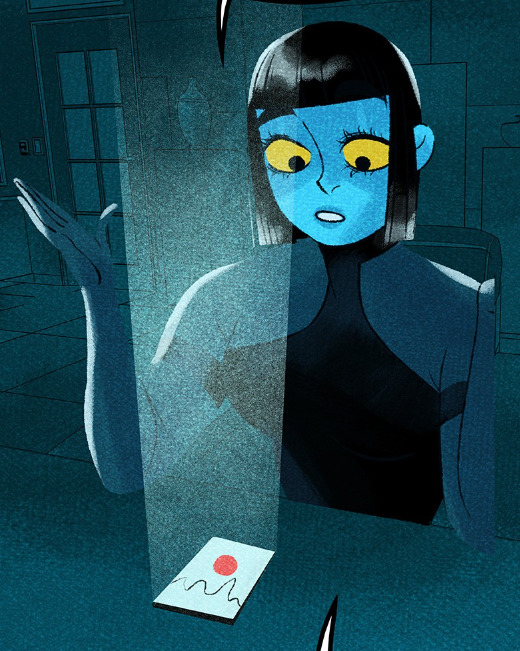
There are a whole bunch of things we can speculate on here knowing what we know from past essays and what I've laid out here.
Rachel may only be involved in the beginning and end of these episodes. She does the roughs, hands the sketches out to her assistants, which they flat and line, and she puts in the shading, dialogue/speech bubbles, texturing, and last details after they're all handed in. This would also explain why there are so many typos - lack of time to edit/proofread - and why sometimes there will be characters speaking but their mouths won't be open.
Rachel hands out the sketches to her assistants individually who flat and line it and hand them back. Sometimes they're handed individual panels, other times they're handed entire pages with a few panels on them. This would explain why we can go an entire scene with a character looking one way and then looking completely different by the next.
Think back to all those previous essays. Everything we've learned so far - that Rachel's buffer is miniscule, that she's shading with the multiply tool, that she's clearly only contributing the roughs and few panels that she makes from random drawings she did on a whim and waits until she can find a chance to shoehorn it into the comic.

Rachel started off drawing this comic just on her own. When she took on assistants, there were only two - AmbitiousIcarus and Madd_Joey.
But eventually, she took on more and more. Two became three, three became five, and nowadays, she maintains a consistent art team of 4-6 people per episode, not including herself or the rotating artists who come and go every now and then.
This has been happening steadily since the Episode 50's range of S1.
The summer when Lore Olympus' licensing rights for animation were sold to the Jim Henson Company.
I'm not gonna sit here and tell you that the assistants were the downfall of LO. I think they're all amazing artists, each in their own right - but their art is clearly failing to shine through in the wake of Rachel's poor management and organization. Rather than delegating single people to single roles - lines, flats, shading, texturing, etc. - she's handing things out panel by panel as she sketches them out... and considering how poor her time management is as we've all seen, it's not hard to come to the conclusion that these assistants are all being put in positions where they have to rush out lower quality work. Rachel is haphazardly dividing up the work between more people all the while contributing less and less on her own end in pre-production, post-production, and quality checking as time goes on. The final episodes weren't immediately noticeably bad as soon as she started taking on more assistants, but it's clear Rachel's involvement in the comic and its quality control has been declining rapidly since the Jim Henson purchase.
Again, this isn't to point fingers or assume the worst of anyone, but it really is food for thought. I hope that this was, at the very least, informative for those of us who've wondered over the years what Rachel's process is like. It definitely seems messy from what we can tell on the surface and frankly, if I could be in the same room as Rachel, I'd be using all this as an example of why she needs to manage her team and her time better. But that's not my place to do so. All I can do is speculate on it and spend way too much time writing an essay about it LMAO None of what I've written here is 'proof' of anything, as I'm not in the position to be able to do such a thing - that's reserved solely for Rachel and her assistants - but it's becoming plainly obvious what the workflow looks like and why the comic looks shittier and shittier every week.
All that said, I don't feel like her assistants get nearly enough credit for the work they do for Rachel. She can't even be bothered to remember the name of the guy who edited the books for her (it's Edwin, by the way) and you never see her bring up her assistants when she talks on interviews about how hard she works or how difficult it is to make a webcomic. At this point, Rachel may as well be the Queen of England - all the pomp and reward and credit, with nothing to show for leadership or actual work ethic.

It's not your work we're seeing each week - it's the work of people who are rushing to meet your deadlines, win your awards, and do your homework.
You are the sum of the parts you utilize in your workflow. You are not here purely of your own efforts. It can barely be called 'your work' at this point. Lore Olympus has become the Ship of Theseus - barely recognizable for what it once was after being haphazardly pieced together by the efforts of others.
And that's all I'm gonna say on that.
340 notes
·
View notes
Text
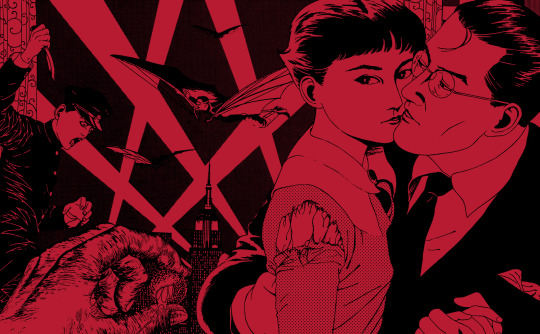
The Post-Futurist Fossils of LITCHI HIKARI CLUB
In a somewhat recent research tangent, while considering the possible “genealogy” of the Tokyo Grand Guignol’s themes and aesthetics, I made an interesting personal discovery regarding Litchi Hikari Club. Specifically some distinct thematic parallels that the play shares with the Italian futurist movement, less in relation to the art of the movement itself, but rather the ideologies of the movement’s controversial founder, Filippo Tommaso Marinetti, and his relation to the Italian fascist party. This is all of course in the context of understanding Litchi as a transgressive/dystopian horror story.
This is less of an absolute statement than it is a sort of open train of thought, so take things with a fair grain of salt. This is more or less just my own personal analysis of all the materials I could gather of the original play. Beyond inspecting the play as a possible allegory for futurism, there's also just a lot of general analysis of the play in relation to Ameya's overall body of work, both with the Tokyo Grand Guignol and also as a performance artist. I rarely put a 'keep reading' tag on these things since I'm an openly shameless product of the early days of blogging, but this one's a doozy (both in the information but also just the gargantuan length). Hopefully others will find it just as interesting.
The full essay is below...
The futurist movement itself was nothing short of an oddity. In their time, the futurists were pioneers of avant-garde modernist aesthetics, with their works ranging from deconstructive paintings to reality-bending sculptures and even early pathways to noise music with the creation of the non-conventional Intonarumori instruments of Luigi Russolo. Russolo’s own futurist-adjacent manifesto, The Art of Noises, would go on to influence such artists as John Cage, Pierre Henry, Einstürzende Neubauten and the openly left-wing industrial collective Test Department. When visiting the MOMA in New York City as a child, I was fascinated by Boccioni’s Unique Forms of Continuity in Space, a sculpture that appeared to be a spacetime malformation of the human figure encapsulated in a continual state of forward motion while in total stillness.
Despite this, the futurists were also a social movement of warmongering misogynists, with their own founding manifesto by Marinetti describing the bloodshed and cruelty of war as being “… the only cure for the world”. Their manifesto would also feature quotes such as “We want to demolish museums and libraries, fight morality, feminism and all opportunist and utilitarian cowardice”. They would originally pin anarchism as being their ideological ground in the manifesto, but shortly thereafter Marinetti would pick up an interest in fascism along with the politics of Benito Mussolini, going on to be a coauthor for the Italian fascist manifesto alongside the futurist manifesto. In consideration of how throughout most of World War II, modernist and post-modern works were considered “degenerate” forms of art in contrast with traditionalism, a whole avant-garde movement founded from fascist ideals is paradoxical. But for a period of time, that parallel wasn’t only in existence, but backed by Mussolini himself with there being a brief effort by Marinetti to make futurism the official aesthetic of fascist Italy.
One of the draws of futurism for Marinetti was an underlying sense of violence and extremity. According to Marinetti, his initial inspiration for the movement was the sensations he felt in the aftermath of a car accident where he drove into a ditch after nearly running over a band of tricyclists. He conceived his works to be acts of social disruption, intending to put people in states of unrest to cause riots and similar bouts of violence. “Art, in fact, can be nothing but violence, cruelty, and injustice”. He sought to destroy history to pave the way for a rapid acceleration to futuristic technological revelation.

“As shown in Edogawa Rampo’s Boy Detectives Club, young men like to hide from a world of girls and adulthood to form their own secret societies.” - June Vol. 27
In Litchi Hikari Club, a group of middle school-aged boys are faced with a crisis on the brink of puberty. At the twilight of their childhoods, they form a secret society known as the Hikari Club (or Light Club), a collective that’s devoted to the active preservation of their shared youth and virginity. The boys naively mimic an authoritarian organization and its hierarchy as they seek a means to preserve their boyhood, which they see as being idyllic in contrast to adulthood, a dreary state of existence that they call old and tired in the Usamaru Furuya manga version of the story. Similarly, in the Litchi Hikari Club-inspired short manga Moon Age 15: Damnation, the boys go on to liken their hideout with the paradisiacal garden of Eden. In said story, Zera would directly name the poem Paradise Lost in reference to the discovery of their hideout by adults (arriving in the form of ground surveyors) and the wide-eyed daughter of a land broker, with their contact to the virgin industrialized land being an ideological tainting of the sacred lair.
In their mission, they seek refuge in technological inhumanity by having their penises replaced with mechanized iron penises, symbolic devices of power and violence that can only procreate with other items of technology. Working in absolute secrecy, they collectively manufacture a robot known as Lychee. The purpose of Lychee, previously only known to Zera, isn’t revealed to the other club members until its completion. It’s when they unveil their “cute” robot in a scene that parallels the 1920 German expressionist film The Cabinet of Dr. Caligari that Zera tells the other members of Lychee’s purpose as a machine that would kidnap women for them. The robot's efforts are assisted by the girl capturing device, a strange rice cooker-shaped mask that’s laced with a sleeping drug. When questioned about the fuel source for the robot, Zera explains how it will run off the clean fuel of lychee fruits rather than an unsavory yet plentiful substance like electricity or gasoline as a means to further match the robot’s perceived beauty.
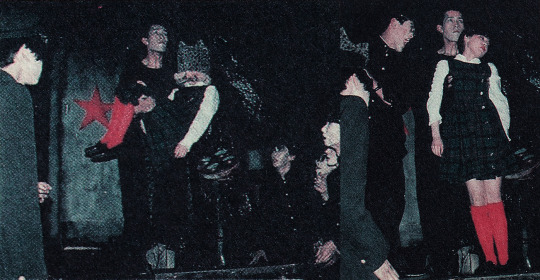
While the club share a general disdain for adulthood, they hold a special hatred to girls and women. Going off the dogmatic repulsion to sexuality that Kyusaku Shimada shows as the teacher in the Tokyo Grand Guignol’s prior play, Mercuro (1984), it could be assumed that the Hikari Club hold a similar dogmatic viewpoint about the vices of sex. In this context, it’s likely that they would’ve perceived women as being parasitic by nature as spreaders of the “old” and “tired” adult human condition through pubescent fixation and procreation. Sexual thoughts are inherent to aging for most people, given the process of discovering and exploring your identity throughout puberty. It’s that exact pubescent experience the club seek to eradicate.
Further insight is given to the Hikari Club’s dystopian psyche through their open allusions to nazi ideology. While Zera travels out to gather lychees from a tree he planted, the club get a special visit from a depraved elderly showman known as the Marquis De Maruo, performed by none other than Suehiro Maruo himself in the 1985 Christmas performance. Despite the club’s disposition to adults, they hold an exception for the Marquis for his old-timey showmanship and open pandering to the children’s whims. He always comes with autopsy films to show the young boys, and as they watch the gory videos he hands out candies that he describes as being a personal favorite of the late Adolf Hitler. He was said to also be the one to convince the boys to name their robot after the lychee fruit. It isn’t until Zera returns that the Marquis is removed from the hideout on Zera’s orders. Just before his exiling, he foretells to Zera the prophecy of the black star as both a promise and a warning to the aspiring dictator. It should be noted that there is a fascist occult symbol known as the black sun.

Suehiro Maruo as the Marquis De Maruo. On the right side is a caricature of Maruo as drawn by a contributor to June magazine, excerpted from an editorial cartoon in June Vol. 27 covering Litchi's 1985 Christmas performance.
In addition, the Marquis’ role alongside Jaibo’s appearances in the play (which I’ll get to later) show distinct parallels with the presence of the hobo in the Tokyo Grand Guignol’s first play, Mercuro. In Mercuro’s case, the hobo (performed by Norimizu Ameya, who would go on to also act as Jaibo) visits the classroom in secrecy to lecture the students his depraved ideologies. Whilst the hobo in Mercuro was a figure of perversion that existed in contrast to the teacher’s paranoid conservatism, in Litchi both Jaibo and the Marquis are enablers of the club’s fascistic leanings, with the Marquis being a promoter whereas Jaibo is a direct representation of the underlining perversions of fascist violence.
Though completely omitted from the Furuya manga, the element of the autopsy films shines a unique light on Zera’s death at the end of the story. In both the play and the manga, Zera is gutted alive by Lychee when the robot undergoes a meltdown after being forced to drown Kanon (Marin in the original play) in a coffin lined with roses. In the manga, Zera appears deeply unsettled when realizing his intestines resemble the internals of an adult. It’s unknown if this aspect is present in the theater version, as the full script remains unreleased to this day. It would fit however knowing not just the club’s repulsion to adulthood, but also how they retreat to technological modification to eradicate the human aspects they associate with adulthood. What is described of Zera’s death in the theater version has its own disquieting qualities as, from what’s mentioned, when confronted with his own mortality he appears to regress to a state of childlike delirium, a demeanor that’s drastically different from his usual calm and orderly presentation. Upon seeing his intestines, one of the responses he is able to muster is “I’m in trouble”. He says this as he questions whether or not he can fit his organs back inside the cavity before eventually telling himself that he’s just tired, that he “need(s) to sleep for a while”.

While never directly stated, it’s heavily implied that the club’s ideologies and technological fetishism ultimately root back to Jaibo, an ambiguously European transfer student who secretly manipulates the club’s actions from behind the scenes. Referred to by Hiroyuki Tsunekawa (Zera’s actor) as the “true dark emperor” of the Hikari Club, he was said to haunt the stage from the sides, closely inspecting the Hikari Club’s activities while keeping a distance. The iron phallus was first introduced by Jaibo through a monologue where he reveals how he fixed one to his own person, carefully describing its inner mechanisms and functionality before demonstrating its inhuman reproductive qualities by using the phallus to have sex with a TV. A television that he affectionately refers to as Psychic TV Chan, in reference to the post-industrial band fronted by Genesis P’Orridge. In the same scene, he promises the other members that they would all eventually get their own iron penises just like his own.
In a subsequent scene, he reveals the iron phallus’ use as a weapon when, arriving to the club’s base with a chained-up female schoolteacher who accidentally discovered the sanctuary, he uses the device to brutally kill the teacher through a mocking simulation of sexual intercourse. Just before raping her, he likens her to a landrace, bred for the sole purpose of reproducing and being processed into meat for consumption. He menacingly tells her that he will make her as “cut and dry” as her role in society before carrying out her execution. While there was some confusion on whether or not the iron phallus was a machine or solely a chastity device, it was found in bits of dialogue that the iron phallus at least shares the qualities of a pump with a described set of rubber hinges. The teacher’s death gruesomely reflects the death of Kei Fujiwara’s character in the later film Tetsuo: The Iron Man (1989), with the iron phallus mangling her insides as blood splatters across the stage. While the club treats adult sexuality as a plague, they manage to find through the iron phallus a way to convert their own states of chastity into a form of violence, stripping all humanity away from the penis and rendering it to a weapon of absolute power through desolate mechanized cruelty.
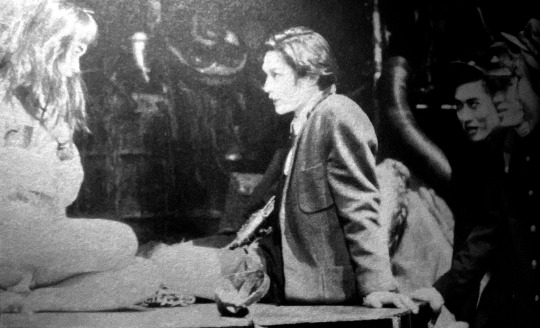
JAIBO: “Length, 250 mm, with a weight of 2.4 kilograms. Arm diameter, 30mm. Cylindrical thrust, 170mm… With pins, plates and rods of die-cast alloy. And hinges of rubber… the rest is pure iron. It is the iron phallus.” - June Vol. 27
In the same interview, Tsunekawa would go on to recall how the members of the Hikari Club were effectively Jaibo’s guinea pigs. In both the play and the manga, an after-school night of the long knives ensues with the slow collapse of the Hikari Club as Jaibo influences the exiling of certain club members, with Zera left ignorant to the social engineering as a mere extension of Jaibo’s elaborate puppeteering. Left embittered by a chess match where he lost to Zera, Tamiya is easily tricked by Jaibo into burning the lychee field as a way to get vengeance. Upon being caught, Tamiya is castrated of his iron phallus, resulting in his exiling from the club as a traitor while also being mockingly likened to a woman in the process. In another scene, it’s recalled that Jaibo and Zera exchange a conversation about the Hikari Club’s loyalty to Zera as they observe the outside world through their periscopes.
By all contemporary recollections, Jaibo was the club’s puppet master. He would’ve been the likely source of the club’s ideologies, the underlining hatred to women and fixation on technological violence, replacing mankind with a race of humanoid weapons. Zera would be a shell without his influence.
The presence of futurism could arguably even be rounded down to Lychee’s presence in the story. Beyond his theoretic work, Marinetti was also a playwright. He would be most well known for his futurist drama La donna è mobile, a story riddled with similarly perverse renditions of sexual violence. The play notably featured the presence of humanoid automatons a full decade before the term “robot” would be coined by Czechoslovakian author Karel Čapek in the play R.U.R., with the French version of Marinetti’s script referring to the machines as “puppets” for their visual similarity to humans.
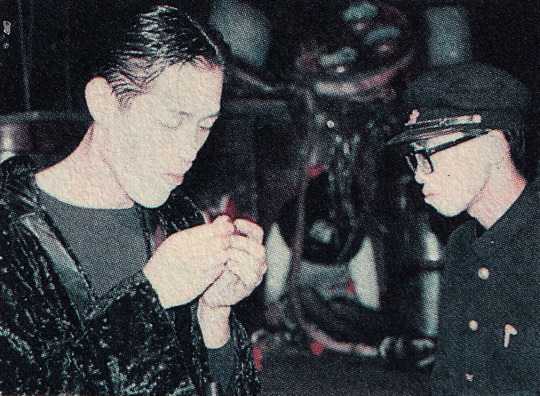
All of this plays out over a soundscape that’s dominated by unnatural electronic frequencies and synthesized percussion. The sound design was arguably one of the most important aspects of Ameya’s plays, with Ameya at one point describing the Tokyo Grand Guignol productions as being an ensemble of his favorite sounds. The setting further compliments the atmosphere, made to resemble the internal of a junkyard or factory warehouse where heaps of technical jump decorate the stage around the monochrome cabinet that would eventually birth Lychee. Some of the featured artists in the play’s first act include Test Department, The Residents, 23 Skidoo and Deutsch Amerikanische Freundschaft. The play’s opening, which depicts the capturing and subsequent torture of a student named Toba through a so-called “baptism of light”, is underscored by the S.P.K. song Culturcide, a grim primordial industrial dirge that paints the image of a dystopia where the genocide of ethnic cultures is likened to the infection of human cells by parasitic pathogens. Instead of being hung with a noose, Toba is suspended by a meathook, left as a decoration amidst the heaps of mechanized excrement. He would eventually be joined by the lifeless bodies of various women the Hikari Club abduct as they’re steadily gathered in a small box at the back of the stage.
“Membrane torn apart, scavenging with the nomads. Requiem for the vestiges. Dissected, reproduced. The nucleus is infected with hybrid’s seed. Needles soak up, the weak must destroy. Cells cry out, cells scream out. Culturcide! Culturcide! Culturcide! Culturcide!” - Culturcide (from S.P.K.'s Dekompositiones EP)
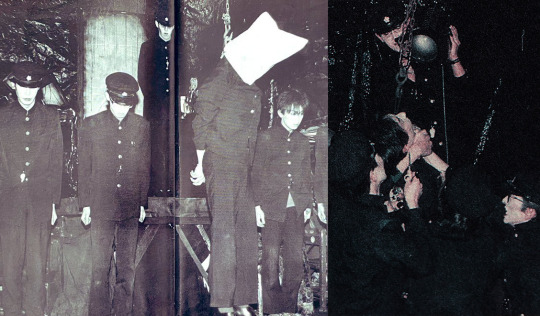
“We are now entering an era which history will come to call ANOTHER DARK AGE. But, in kontrast to the original Dark Age, defined by a lack of information, we suffer from an excess of information, which has been reduced to the repetition of media-generated signs. Through this specialization, it is no longer possible for an individual to attain a total view of society. Edukation is struktured to the performance of a limited number of funktions rather than for kreativity.”
“Kommunications systems are designed for the passive entertainment of the konsumer rather than the aktive stimulation of the user’s imagination. Through the spread of the western media, all kultures come to stimulate one another. By the end of the millennium, this biological infektion will have penetrated the heart of the most isolated traditions - a total CULTURCIDE.”
“Yet in every era, a small number of visionaries rise above the general malaise. Those who will succeed, will resist the pressure to become kommercialized “images”, demanding identifikation and imitation. They will uphold their principles in the face of impossible odds. By remaining anonymous, they will be free to develop their imagination with maximum diversity. For this is the TWILIGHT OF THE IDOLS, - the end of the proliferation of the ikons and the advent of a new symbolism.” - From the back cover of S.P.K.’s Dekompositiones EP (released under the moniker SepPuKu)
Over the course of the play, the story undergoes a drastic tonal shift as the focus moves from the Hikari Club’s hierarchical order and internal conflicts to the relationship between Lychee and Marin. Marin (performed by synthpop musician Miharu Koshi) was the first girl the Hikari Club successfully kidnap through Lychee after implementing the phrase “I am a human” in Lychee’s coding so it can understand the concept of human beauty. This small implementation causes a full unraveling in Lychee’s personality as it quickly forms a close bond with Marin, convinced that it is also a human like Marin. The soundscape changes alongside the overarching atmosphere, going from cold industrial drones and percussive electronica to ambient tracks. Some of the major scenes play out over moving piano-focused pieces and music box tunes from Haruomi Hosono’s soundtrack for Night on the Galactic Railroad. Originally created a weapon like the iron phalluses and the girl capturing device, Lychee is eventually defined in how he transcends from being a weapon to a conscious being with feelings. In this context, the play can be read as a juxtaposition of human emotion against inhuman futurist brutality.
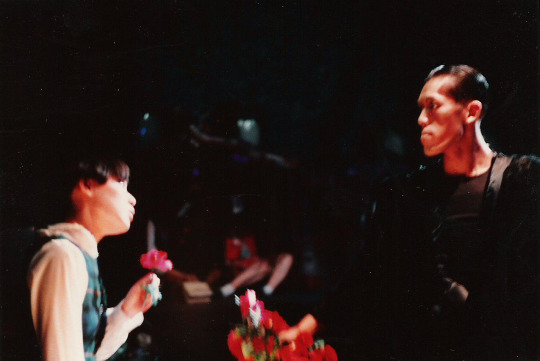
This split was likely the product of the radically different creative ideologies of Norimizu Ameya (the Tokyo Grand Guignol’s founder and lead director) and pseudonymous author K. Tagane (the playwright for the group from Mercuro to Litchi). Ameya had come into the group with radical intentions, holding Artaudesque aspirations to transgress the literary limits of modern theater to achieve something deeply subconscious. Meanwhile, Tagane was a romantic who was known for their poetic and lyrical screenplays. Ameya purportedly sought out Tagane’s screenplays specifically to find a literary base he would “destroy” in his direction, deconstructing the poeticisms in his own unique style. He describes it briefly in an interview regarding the stage directions of Mercuro, stating how he took elaborate descriptions of a lingering moon and ultimately deconstructed them to the moon solely being an illusion set by a screen projector, mapping out the exact dimensions of the projection to being a 3-meter photograph of the moon rather than a “fantastic moon”. It’s believed by some that the Tokyo Grand Guignol’s formation and ultimately short run were the product of a miraculous balance between Ameya and Tagane’s ideologies. It’s possible that Litchi could’ve been a last straw between the two artists. After Litchi, Tagane left the group, with Ameya having to write the troupe’s final screenplay on his own.
LYCHEE: “Marin is always sleeping… all she does is sleep. She doesn’t eat anything. Why does Marin sleep all day?”
MARIN: “When you’re asleep, all the sadness of the world passes over you.”

"The second half of Litchi was predominantly driven by the sounds of Ryuichi Sakamoto and Haruomi Hosono. During a scene that featured a piece from the Galactic Railroad soundtrack, Miharu Koshi sang to Kyusaku Shimada while dancing like a clockwork doll to the sounds of a twisting music box. The scene lasted for a while and was very romantic, the interactions between Lychee and Marin were all very sweet and cute. The second act of Litchi was all a product of Tagane’s making. By the time of the following play, Walpurgis, I was told by a staff member that Ameya had written the screenplay by himself because Tagane had left.”
“… While the first half was filled with repeated mantras and the unfolding aesthetics of an aspiring militia, the second half was immersed in the world of shoujo manga. It did appear that through the intermission, much of the junk and rubble around the podium was sorted out.”
“… The Tokyo Grand Guignol’s plays were always defined by a strong nocturnal atmosphere. But in Litchi’s second half, it wasn’t a dark night, but a brightly lit one under the moonlight and plentiful stars in the sky shining through an invisible skylight. Marin doesn’t forgive Lychee immediately for his actions, responding to him harshly in a way that would confuse him and make him sulk. It came across as a somewhat bitter reimagining of a French comedy like Louis Malle’s Zazie dans le Métro or Jean-Pierre Jeunet’s Amélie, it was different that way in how it wasn’t only Maruo’s inferno.” - From a Twitter thread by user Shoru Toji regarding the 1986 rerun of Litchi Hikari Club
Some questionable qualities do exist in the relationship between Lychee and Marin. What should be a peaceful retreat from the dystopian corruption still has a sinister undertone in the disparities between Lychee’s cold masculine features in contrast with Marin’s childlike girly innocence. It doesn’t help that Zazie dans le Métro (one of the mentioned films in the recollection) was directed by Louis Malle, who while known for such films as My Dinner With Andre and Black Moon was also responsible for the infamously discomforting Pretty Baby. Then again, Litchi was the product of a confrontational transgressive subculture, so the sinister undertones could be intentional. Keep in mind the contents of Suehiro Maruo’s prolific adaption of Shōjo Tsubaki and how it unflinchingly depicts abuse and manipulation through the eyes of a confused child.
It could be possible that Lychee himself was intended to be childlike in its mannerisms. Throughout the existing descriptions, Lychee was shown as speaking in fragmented sentences while struggling to understand basic concepts. Zera was mentioned to also use certain phrases like “cute” when referring to the robot when it was unveiled. And it’s through Marin that Lychee learns morality like a child. The robot’s masculinity could be passed off as the cast all being adults. Hiroyuki Tsunekawa for instance shows distinctly sculpted features from certain angles when performing Zera.
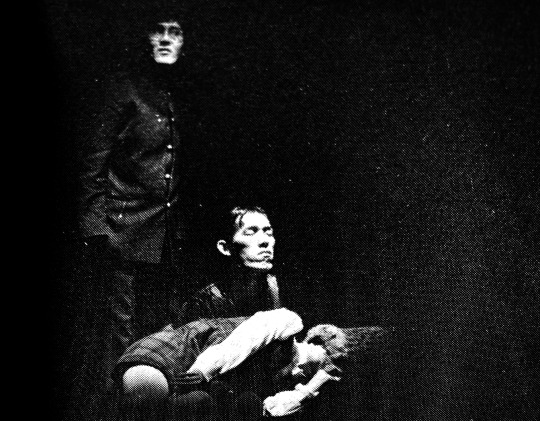
In his aspirations to become a human, Lychee eventually “dies” like a human. With the burning of Zera’s lychee tree, the robot is left with a finite limit on its remaining energy before it totally loses consciousness. After his rampage, Lychee attempts to reunite with Marin, but he runs out of fuel. Before what should be a moment of resolution, things are cut short as the stage goes black, eventually illuminated to show an unpowered Lychee cradling Marin’s corpse in his arms. Zera reemerges to observe the remnants of Lychee and Marin. He speaks of how Lychee will crumble into nothingness alongside Marin for foolishly giving into human emotion, further implying the club’s views on humanity. After this, recollections of the play’s final lines differentiate somewhat. It was said that in the original Christmas performance, Zera calls out to Jaibo, posing the corpses of Lychee and Marin as being his seasonal gifts to Jaibo. Whereas in most popular recollections, it’s described that after his monologue, Zera shouts “Wohlan! Beginnen!” (German for “Now! Begin!”) before prompting the decorations across the stage to collapse, revealing a set of stepladders from behind that the remaining previously deceased club members stand, all drenched in blood with spotlights illuminating their faces from below.
ZERA: “And with that, our tale of a foolish romance between woman and machine reaches its conclusion. It ends before me as I stand here, watching. Lychee, the machine, will rust away into dust. And Marin, a young girl, will rot away leaving behind only her bones, which too will crumble…”
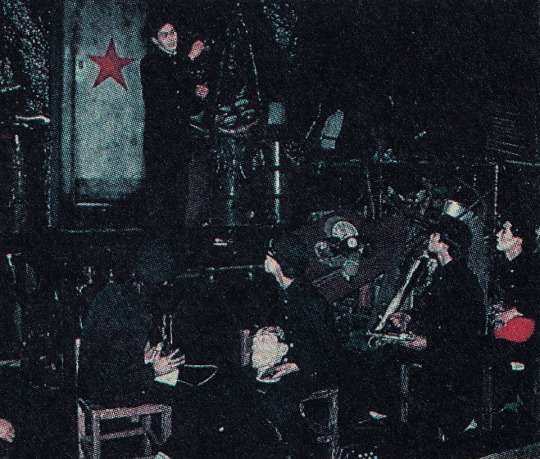
Multiple readings can be deciphered from this conclusion. The most established theory is in relation to the Hikari Club’s aspirations for eternal youth, with the members technically achieving their goal through the stagnation of death. They will remain eternal children since they died as children, unable to ever grow into adulthood. In the context of futurism and mechanized fascism however, it could be read as a bitter observation of a lasting dictatorship. With how the Hikari Club members had rendered themselves less human than their own robot, they survive death to continue their work, seeking to one day eradicate humanity in favor of a race of sentient childlike weapons.
“To admire an old picture is to pour our sensibility into a funeral urn instead of casting it forward with violent spurts of creation and action. Do you want to waste the best part of your strength in a useless admiration of the past, from which you will emerge exhausted, diminished, trampled on?”
“… For the dying, for invalids and for prisoners it may be all right. It is, perhaps, some sort of balm for their wounds, the admirable past, at a moment when the future is denied them. But we will have none of it, we, the young, strong and living Futurists! Let the good incendiaries with charred fingers come! Here they are! Heap up the fire to the shelves of the libraries! Divert the canals to flood the cellars of the museums! Let the glorious canvases swim ashore! Take the picks and hammers! Undermine the foundation of venerable towns! The oldest among us are not yet thirty years old: we have therefore at least ten years to accomplish our task. When we are forty let younger and stronger men than we throw us in the waste paper basket like useless manuscripts! They will come against us from afar, leaping on the light cadence of their first poems, clutching the air with their predatory fingers and sniffing at the gates of the academies the good scent of our decaying spirits, already promised to the catacombs of the libraries.” - from the 1909 Futurist Manifesto by Filippo Tommaso Marinetti

I forgot what exactly first caused the parallel to cross my mind. I do recall it being reignited when having a closer look over the poster and flyer for Litchi’s Christmas performance in December 1985. The flyer in particular is really a wonderful thing to look at. Predominantly featuring an art spread by Suehiro Maruo, a suited man with Kyusaku Shimada’s likeness is shown caressing a girl in front of a modernist cityscape with spotlights shining up to a night sky. Other suited men in goggles fly in the air with Da Vinci-reminiscent flying apparatuses between the beams of the metropolis’ spotlights. A student in full gakuran uniform flings himself into the scene from the far left side of the image with a dagger in hand, and a larger hand comes from the viewer’s perspective holding a partially peeled lychee fruit. While not based on any direct scene from the play, it perfectly instills the play’s atmosphere with an air of antiquated modernity, like the numerous illustrations of the early 1900s that show aspirational visions of what a futuristic cityscape might resemble. The bizarre neo-Victorian fashions of the future and its post-modernist formalities. The term futurism came to mind somewhat naively from this train of thought. It was a movement I recalled hearing about, but my memory of it was hazy. It wasn’t until I went in for a basic refresher that I felt the figurative lightbulb go off in my head. That was when the pieces started to come together, but then also strain apart from each other into tangents.
Granted, many of these parallels could be read as coincidental. Many of them can even be passed off the play being a work of proto-cyberpunk, knowing how Tetsuo: The Iron Man would subsequently explore similar themes of cybernetics and human sexuality. It should still be noted however that in contrast with many of the Japanese cyberpunk films, Litchi was explicit in its connotations between technological inhumanity and fascism, with the machinery itself being the iconography of a dictatorship rather than a product of it. In addition, with Tetsuo the film has strong gay overtones, with the technology being an extension of the sexual tensions between the salaryman and the metal fetishist. For a period of time, efforts were made to make futurism the official aesthetic of fascist Italy, and modern fascism as we know it is in the same family tree of Italian philosophy as futurism. The Hikari Club are explicit in drawing from German aesthetics rather than Italian however, speaking in intermittent German and predominantly using German technology. The spotlight that they used when torturing Toba in the first act, for example, was a Hustadt Leuchten branded spotlight. And if that isn’t a German name I don’t know what is. It was also said that Jaibo’s outfit in the play was modeled after German school uniforms. Though then again, the Tokyo Grand Guignol’s works were a bit of a cultural slurry. Jaibo’s name for example is Spanish (derived from Luis Buñuel’s Los Olvidados), while the character is implied to be German.
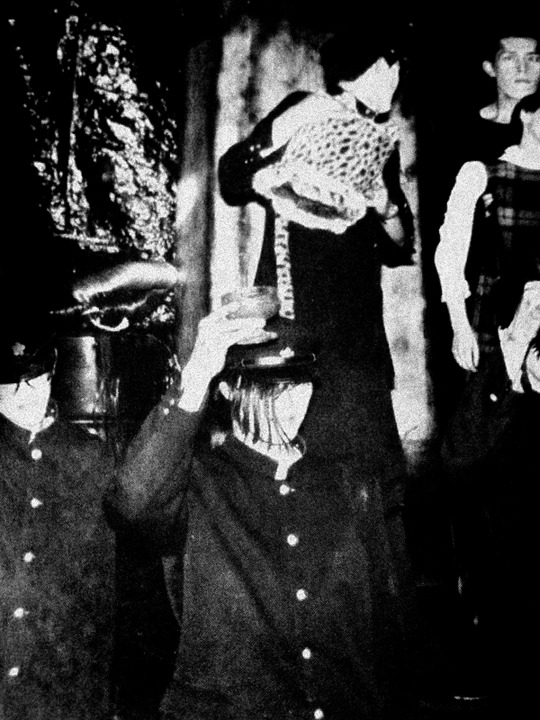
Similar to the cited origins of futurism, Ameya stated in a 2019 tweet regarding the June 9th, 1985 abridged Mercuro performance on Tokumitsu Kazuo’s TV Forum that in the following August of that year, an airplane accident occurred that led to the conception of Litchi’s screenplay. The exact nature of the accident was never specified, but the affiliates he was communicating with all appeared to be familiar with it and expressed concern when it was brought up. This was however one of an assortment of influences that were cited behind Litchi’s production, with the two more established theories regarding the then-contemporary mystique around lychee fruit in Chinese cuisine along with the play being a loose adaption of Kazuo Umezu’s My Name is Shingo.
For what it’s worth, the themes of Litchi, along with the Tokyo Grand Guignol’s other works, were closely tied with certain concepts that Ameya personally cultivated throughout his career. A frequent recurring topic Ameya would bring up in relation to his works was the nature of the human body in relation to foreign matter, need it be biological or unnatural. With Mercuro the students taught by Shimada are made into so-called Mercuroids by having their blood supplies replaced with mercurochrome, a substance that is referred to as the “antithesis of blood” by Shimada while in character. In an interview for the book About Artaud?, Ameya cites an interest in Osamu Tezuka’s manga in how certain stories of Tezuka’s paralleled Ameya’s observations of the body. He directly names Dororo and Black Jack, observing how both Hyakkimaru and Black Jack reconstructed their bodies from pieces of other people, going on to bluntly describe Pinoko as a “mass of organs covered in plastic skin”.

A section from June Vol. 27 highlighting some of the more established performers from Litchi's 1985 Christmas performance. The actors from left to right are Norimizu Ameya as Jaibo, Naomi Hagio as the female school teacher (best known in cult circles for her role as Kazuyo in the 1986 horror film Entrails of a Virgin), Suehiro Maruo out of costume and Miharu Koshi as Marin.
During his temporary retirement from theater, Ameya would take up performance art, with some of his performances revolving around acts with his own blood. While my memories of these works are a bit hazy, I remember one action he performed that involved a blood transfusion, with the focus being on the experience of having another person’s blood coursing through your veins. While I didn't have much luck relocating this piece (probably from it not being covered in English), I did find on the Japan Foundation’s page for performing arts an interview where Ameya discusses being in a band with Shimada where Ameya had blood drawn from his body while he played drums. He would also describe an art exhibition where he displayed samples of the blood of a person infected with HIV.
“After 1990 he left the field of theatre and began to engage himself with visual arts - still proceeding to work on his major topic - the human body - taking up themes like blood transfusion, artificial fertilization, infectious diseases, selective breeding, chemical food, and sex discrimination, creating works as a member of the collaboration unit Technocrat.” - Performing Arts Network Japan (The Japan Foundation)
There are still an assortment of open questions I’m left with in regards to the contents of the original Litchi play. One of the most glaring ones is Niko’s eye. In consideration of Ameya’s interest in the body, the detail would fit perfectly with his ideologies. A club member who, to show his absolute loyalty to the Hikari Club, has his own eyeball procedurally gouged out to be made a part of the Lychee robot. Despite this perfect alignment, none of the contemporary recollections mention this element. While Niko does have an eyepatch in certain production photos, it never seems to come up as a plot point. He isn’t the only one to bear an eyepatch either, with Jacob also being shown with an eyepatch in flyers. More questions range from Jaibo’s motives in causing the dissolution of the Hikari Club to the true nature of Zera’s affiliation to Jaibo. While Tsunekawa has stood his ground in the relationship between Zera and Jaibo being totally sexless, in the cited volume of June the editor playfully refers to Jaibo as being Zera’s “best friend” in quotes.
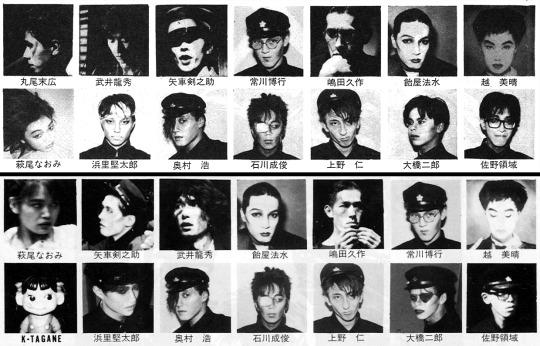
A side-by-side comparison of the cast listings on the back of the flyers for the December 1985 performance of Litchi Hikari Club alongside its 1986 rerun. The 1985 run's lineup is at the top while the 1986 run is at the bottom.
Much speculation is naturally involved when looking into the original Litchi Hikari Club since it is in essence a cultural phantom. There’s a reason I used the term genealogy in relation to my research of the Tokyo Grand Guignol’s works. It is an artistic enigma as while its presence lingers in subculture, the original works are now practically unattainable due to the inherent nature of theater. As Ameya himself would acknowledge in another interview, theater is an immediate medium that can only be perceived in its truest form for a very short span of time before eventually disintegrating. So with the Tokyo Grand Guignol’s plays, you are left to scour through the scattered remnants and contemporary recollections alongside the figurative creative descendants of the plays. You analyze the statements of both the original participants and the people they openly dismiss, as even those people were original audience members before reinterpreting the plays to their own unique visions. Despite the apparent differences, I still feel that Furuya’s manga gives a unique perspective to the story when viewed under dissection. That is if you want to see it in strict relation to the play. Outside that, I feel it firmly stands on its own merits. I like the manga no matter what Tsunekawa says, that’s what I’m trying to say. Ameya approved it anyway.
It took me a full day to write all this out, and like the first time I went down this train of thought, I’m pooped. During that first excursion, after excitedly spiraling through these potential connections, I noticed in passing mention something about Marinetti’s cooking. You see, later in his life Marinetti aimed to apply futurism not just to art and theater, but cuisine also. As an Italian, Marinetti openly despised pasta, seeing it as being an edible slog that weighs down the spirits of the Italian people. Just further evidence that I would never get along with the man, no matter my liking of the Boccioni sculpture I saw at MOMA all those years ago. Well, outside of him being a fascist and all obviously. I like pasta. Either way, he was on a mission to conceive all-new all-Italian cuisines that would match the vision he had of a new fascist Italy. Nothing could prepare me though for when I saw an image of what would best be described as a towering cock and ball torture meat totem. It is exactly as it sounds, a big phallic tower of cooked meat with a set of gigantic dough-covered balls of chicken flesh on the front and back where you have to stick needles through the thing to hold it together. Words cannot express just how big it is. The thing was damn well near falling apart from how unnatural its shape was, and you’re expected to eat it while it has honey pouring from the tip of the tower. I genuinely winced watching its assembly, I instinctively crossed my legs somewhat when it was pierced by wooden sticks and then cut into sections to reveal the plant-stuffed interiors. As a person with no interest whatsoever in cooking shows, I was on the edge of my seat watching a PBS-funded webisode of someone preparing futurist dishes. Seek it out for yourself, it’s an excessively batshit culinary freakshow.
That is more than enough talk about penises for the rest of the week. I’m going to spend the next few days looking at artistic yet selectively vaginal flowers to balance things out, equal opportunity symbology.
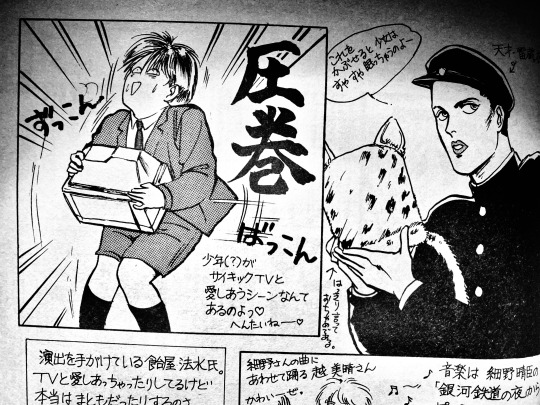
133 notes
·
View notes
Text
Medic is a character I feel people agree is often mischaracterized in fanworks, but nobody can really settle on why that is or how people get to that assumption. What makes him mischaracterized? Does he care too much about his team? Too little? What even is his character to begin with? Does he even have one? Why should we even care since he's a comedic character designed to make you laugh first?
In other words, hi! I'm a fanfic writer who is extremely abnormal about Medic TF2. Those two things are going to be pretty central to the topic of this analysis piece of sorts. This right here is an essay that details the characterization of the Medic from Team Fortress 2 from the character's inception in development all the way until the final comic. Yes. The one character.
I'm doing this mostly as a way for a) me to comb through canon material and study this character so I can remind myself over and over again how he acts and b) me not-so-subtly venting about how much of a nightmare it is to find a fanfic that writes Medic in a way that aligns with his characterization in canon. It 100% is because I'm a picky whiny bitch who can't help but constantly read like a writer and overanalyze everything, but I think I'm not that alone when I say that the fandom's perception of Medic is...warped.
But why? Why do people seem to not exactly understand or get him? Why is it hard to find common ground on what aspects of Medic are in-character or not? Why do so many people have wildly different interpretations of it?
Short answer: Medic's character has shifted pretty drastically from his original inception in 2007 to the last released comic in 2017, retconning him from a cold and calculated dominating doctor to a silly and goofy mad scientist to make him more funny. There is no real proper true characterization and everyone can have their own interpertation.
Long answer? Well...let's get to that.

I should probably preface this with a couple main interpretations of Medic's character and how I think it's fascinating to understand where they come from. They also set the groundwork as to how these different characterizations of Medic come from.
There's what I like to call "Game Medic". Game Medic is the most common interpretation amongst players of the game. Redditors and the like point to this interpretation of Medic and hail him as the "true" characterization of him. Honestly? I can't blame them. Have you heard Medic's voice lines?? A lot of them are him barking orders at the others and hissing at his fellow mercenaries about their incompetency. It gives him the aura of a man driven to madness by having to take care of his teammates, reflecting that of what a lot of Medic mains feel.
Game Medic characterizes Medic mostly as a sadistic man who does not care for the other mercenaries. He's dominating and demanding, ordering around the others. He laughs maliciously when there's death and, famously, he believes that healing is not nearly as rewarding as harming others. People generally believe that Medic would experiment on the mercs against their will and torture them for his own amusement. It's not uncommon in these circles who believe in this characterization for theories and suggestions of Medic once being a Nazi to crop up.
I don't believe this is an accurate characterization of him, at least not anymore. I'll get into the details of why later, but the basic summation is that Medic had a rather different personality in 2007 that was later shifted and changed to be more comedic and silly as the years went along.
The next most common is "Fanfiction Medic". It's the Medic you see in those TF2 x Reader stuff, in the sense of Medic being reduced to a caring and compassionate man. It takes more aspects from the comics but does still miss the point of his character in favour of making him easy to sympathize and identify with. He can have aspects of his in-game portrayal, with him being overly critical of the one he loves. He's affectionate, sweet, and generally really caring and loyal, if possessive and easily jealous. In fanfic, he ranges from being dark and intimidating in a sexy and dominating way to a generally nice guy who just loves his partner.
It's the inverse of Game Medic and is often mocked and made fun of. You'll see memes that compare an overexaggerated version of Fanfiction Medic, with him being extremely submissive and soft, to Game Medic, who oftentimes acts in a more dark and violent way, perhaps bringing into his utter disregard for life and his obsession with experimenting using animal organs.
This interpretation should go without saying that it's also not exactly true to his character. Flanderizing him to the point where he doesn't even really identify with any traits or qualities from the game or comics. And for what? To make him more appealing? Or perhaps can people not fathom him acting in a more mean and rude way?
So...how did we get here? Why is Medic and his characterization such a divisive topic? Characters like Scout and Engineer seem to have pretty consistent characterization through and through all subspaces of the fandom. Why Medic? And, even still, why do most people have a hard time replicating his voice? His personality? Anything?
That's what we're going to talk about here today, folks.
Pre-MtM
Let's start with pre-TF2 days: Invasion. The concept art of Medic was very much in line with the whole orderly doctor archetype. Serious expression, clean pristine white clothes. There's a sense of authority and dominance to him. This is a man of reason and science. He is a mercenary. A Medic who heals his team from the brink of death.
This characterization I feel lasted until the style shift, where TF2 became more of a comedic and light-hearted game. This is where I believe the whole "disgruntled angel of death" stuff comes from. Medic retains that order and dignity, which leads into the game.
His voice lines, as previously mentioned, are aggressive and accusatory to his own team. I wouldn't blame you if you assumed he hated his team entirely. He claims that his skill is wasted here, that they're all useless idiots, so on and so forth. It characterizes him as having a grudge towards his fellow workers, only doing this because he enjoys the thrill of bloodshed and violence. It definitely paints him more as being a sadistic madman like the rest of them.
It's a characterization I've already covered, so for the sake of not sounding redundant, let's say that in 2007, the inception of Medic as we know, was predominantly portrayed as a somewhat sane, albeit sadistic and authoritative man of science. He is violent and generally looks down upon his coworkers, viewing them as half-wits who only get him killed over and over again. From his body language, he's a lot more rigid and straight than the others. It gives the impression that he's a proper, well-mannered serious character.
A major moment of characterization that could've happened was the scrapped original Meet the Medic video. I believe this would've come out in 2009 alongside the other Meet the Team videos like Meet the Heavy, Meet the Sniper, Meet the Soldier, etc and etc. While it isn't canon per se, it's still a topic worth mentioning and talking about.
Around this time, TF2 was becoming a lot more comedic than its original inception. Saxton Hale and Mann Co. had been invented, two things that would be a sign of what the game and property would eventually become. It's light-hearted and silly now! In the Classless Update of 2009, there were newspaper clippings showing a saga in which the King of Australia waged a war against a hill. The Spy VS Sniper Update added Jarate, a literal jar of Sniper's piss. Hats!! HATS!! The games were changing quite noticeably from how they originally were.
Which brings us to the scrapped trailer. A basic summary is that Medic is being interviewed on a train and talking about how he invented the medi-gun. It begins with a cold opening of a BLU Sniper bleeding out while a Soldier of the same team calls out for help. They are then promptly run over by a train, the exact one that Medic is on as the next shot is of him putting away luggage as the gore and guts from the run-over Soldier and Sniper splat onto his window. Again, comedic cold open played for laughs. It sets the tone of Medic as being a serious character with a streak of silliness to him. It also helps that there is a chessboard there, further characterizing him as an intellectual.
Medic then begins his story. It's a dark and terrible sight to see. The team is losing and the Heavy is bleeding out. He seems overworked, having to fend off against a Spy all by himself and quickly trying to save the Heavy. The rest of his team are useless, just standing there screaming as they're in pain. Again, further characterizes him as a savior to them. The only competent one.
Then, something quite new happens. Medic slaps Heavy in frustration once he flatlines. He...slaps Heavy. It's on impulse and clearly done in irritation, but that's quite different. Before, we've seen Medic as a somewhat calculated individual. He's not prone to rash choices out of emotions. He loves bloodshed and violence, but he's fairly contained and controlled.
I think the slap is one of the first examples of Medic's character really beginning to shift. It's done for laughs, yes, but it shows him as being emotional and prone to getting physically violent and angry. I can practically hear him saying: "Live damn you! Live!" as he slaps him.
Then, chaos erupts in the room as a stray rocket blasts into the room. It knocks over Medic and he's left to lie on the ground, watching as his teammates do nothing more than scream and flail around. Yet, through a series of events, everything falls into place to create a naturally healing liquid. He watches on in fascination and amazement before then scrambling back to Heavy, pumping more blood into the puddle of Healing Juice. Eventually, the Heavy is revived.
Then the Spy head is resurrected and begins screaming for death. Again, characterizing Medic as being morbidly comedic. Medic screams (startled by the dismembered head coming to life)(reasonable reaction) and begins shooting it. Again, impulsive and acting on instinct.
Once realizing that the Spy's head is invincible, he shoots it one more time, giggling after it. He GIGGLES. Do you understand me when I say that this is important? Look at him as he does that. Tell me he doesn't do a little "hooh!!" after that final shot.
Medic's laughter is a rather large part of his later characterization, as it goes deeper into the whole eccentric mad scientist archetype instead. It's when Medic is beginning to break away from that only characterization and become...silly. He's sadistic, but he enjoys it with whimsy and intrigue. He is fascinated by the Spy head.
Medic then begins work. It furthers his sadistic characterization by him using the Spy head as a means to hold nails and such. Something that we don't see too much later on from this is that Medic builds the medi-gun. Strange since most of the time the one who's characterized as building things is Engie. This is probably done to give a sense of competency to Medic. He's a man of science capable of doing anything.
The video ends on what would later become the scene of Medic walking out with angelic light behind him and doves flying out. Still has that whole angelic feeling to him AND also when his doves first come into play. Him being seen as a holy saviour feeds into his characterization of him having a god complex. He sees himself as a man who makes gods out of men.
So, what have we learned from this video? Well, Medic's commentary is quite proper and professional. In canon lore, he would've been interviewed by the Director. His characterization would be a man of science who views himself as the only really competent person on the team. However, he's prone to fits of impulsive rage and doesn't seem to feel any remorse for his outbursts. He is an inventor of sorts, who experiments and finds it fascinating to work with science.
I also believe this is when it's first shown that Medic likes experiments. Beforehand, he was just a doctor. Now? He tests and experiments and enjoys it. He's still a sadistic madman who loves violence, but all in all, he seems a little more comedic than he did in 2007.
The original idea was scrapped as the team believed that the short didn't exactly show who Medic was. It didn't comply with what players had when they thought of "Medic". Even back then, I think they wanted to have Medic's character be something else. Something more grandiose. Also, it doesn't really touch on Medic's gameplay. It just introduces the medi-gun.
Medic's characterization would slowly grow more and more comedic as time goes on, moving away from the idea of him being a serious doctor and more of a mad scientist. What with new cosmetics and taunts.
But...this isn't enough. No, not enough. He's still not as goofy as, say, the Soldier, Scout, or Demoman. Does he need to be? No, but he could be. He could be something more.
In late June of 2011, the Über Update happened. It was a large-scale content update that not only made TF2 free-to-play, but also added several new cosmetics, weapons, and maps. But that's not what we really care about here, is it?
You already know what it is. The bombshell that changed Medic's character forever.
Meet the Medic
The short opens up with an action scene of Scout and Demo running away. Both are heavily injured and are trying to escape from enemy fire. Scout gets blown away and is then hit with three different rockets, sending him flying into a window where he calls out for Medic before cutting to the title card.
Instantly establishes Medic as a character who the others turn to for help. Good introduction to the character and his general role and premise as well as a neat prelude that catches the attention of the audience. But enough of that. It's time for the man himself.
Immediately we are hit with an iconic line of dialogue that establishes that, no, this is no serious and stoic character. This is a different, more interesting and developed version of Medic.
"Wait, wait, wait, it gets better! When the patient woke up, his skeleton was missing, and the doctor was never heard from again!" [Mad laughter] "Ahh... Anyway, that's how I lost my medical license, heh."
Do you see me here? I am gripping my screen here in some attempt to grab you by the shoulders and shake you. Do you understand what this means in terms of characterization? How different he is? How much sillier he has gotten?!
Okay, let's start off by describing this. Medic is performing surgery on Heavy. Based on the bullet wounds, it's suggested that this impromptu surgery is happening mid-battle. Medic is talking to Heavy incredibly casually-- he's TALKING to Heavy. He should be under anesthesia considering he currently has his entire chest open.
This already characterizes Medic as casual when it comes to surgery. He's doing medical malpractice and, not only is he completely unbothered, but so is Heavy. It could imply that this is regular behaviour and Heavy is not worried.
This surgery is just as normal to Medic as a barber cutting somebody's hair. He's telling stories and generally having fun. He's having fun he'S HAVING FUN-- He's laughing and just generally enjoying himself! Being silly!!
Not to mention the story itself is dark. The punchline is that "the doctor stole a patient's skeleton and ran away". Medic laughs hysterically after this. He finds it hilarious. Not to also mention he follows it up with that little "that's how I lost my medical license :)"
Not only did he steal a man's skeleton, managing to keep him alive as implied with him saying that the patient woke up and noticed his skeleton was missing (so he managed to extract the man's skeleton and leave his nervous system in place), but he finds it funny! It's a comical story he finds enjoyment in telling others. He even seems proud of it and doesn't regret it in the slightest.
He doesn't even seem to really pick up on Heavy's face drop or that maybe he shouldn't be telling this story when he's got somebody on the operating table. Perhaps a little socially unaware? Eh, could just be headcanons bleeding into analysis.
He doesn't have his gloves on either. Just handling Heavy's heart without any gloves or anything. Again, casual medical malpractice that he does not seem bothered by in the slightest. This idea of Medic doing surgery and or experiments with his gloves off while putting them on for literally anything else also pops back up in the comics, but we'll get to that soon.
Let's not also forget that this man laughs. Like straight-up laughs like a mad scientist. Before, we had gotten voice lines of him are evil, malevolent cackles. He's mocking the ones that he kills. Here's?? It's a lot more whimsical and silly. It's something that'll be something he does a lot more later on: laugh when he's just generally happy or nervous.
But enough about that one line of dialogue. We have the rest of the short to watch!
Archimedes pops out of Heavy's chest cavity. Medic scolds him and shoos him away. He glances over back at Heavy. For a frame or two, his eyes are wide and his expression shifts. He realized that, y'know, maybe it's not too great from Heavy's perspective to have Archimedes digging around in there. He shrugs it off with an anxious laugh. Not to also mention he absentmindedly wipes the blood on his clothes. Again, very unprofessional and not very concerned about it.
Quick note about the symbolism of doves. Doves are seen as a sign of peace and whatnot, usually combined with angelic qualities. A dove with blood on it would imply that its original meaning is perverted in some way, especially if the dove is going out of its way for the blood. It's a harbinger of peace, but finds infinite more enjoyment indulging in the bloodshed and violence of the destruction it's meant to oppose.
Medic grabs what I like to call a über implant. It's what gives the heart the ability to be übercharged. He sticks it into Heavy's heart, saying that, while most hearts cannot withstand the voltage, he believes that Heavy's heart will be able to take it.
He puts it near the beam of the quick-fix and it instantly explodes.
Medic overestimates the abilities of Heavy's heart, thinking it was strong enough. It was not. This characterizes Medic as being somewhat optimistic and believes his own theories based on no previous data or evidence. Throwing caution to the wind and hoping for the best.
However! He adapts. He thinks for a second. This is no setback. He quells Heavy's concerns saying that, no, this is the sound of progress, mein Freund. This shows that he is quick with improvisation and is completely fine with deviating suddenly whenever a new problem arises.
He digs into his mini-fridge, where he gets more characterization. He's got a collection of animal organs in here. He likes experimenting with them, so he keeps them on standby. He does not care if Heavy doesn't want an animal organ in him. This is a life-or-death scenario. Either he goes on out there without a heart or he takes the mega baboon heart.
There's also beer, implying that he likes it enough to keep it nearby. He also keeps one of Heavy's sandwiches, perhaps either for himself or for Heavy.
There's also the head of the BLU Spy, a cute callback to the scrapped Meet the Medic video. It's there with a battery keeping it alive as well as an ashtray. Medic dismisses its request to Die without a second thought. He's got more important business to attend to.
He attaches the über implant and holds it under the quick-fix's beam. Here, again, he laughs maniacally. It makes Heavy uncomfortable, but eh who cares about him this is the Medic essay. Medic is clearly enjoying the beauty of experimentation and playing god here, harking back to the idea of him having a god complex.
Finally, it's done. It glows. "Oh, that looks good," Medic says as he drops it haphazardly into Heavy's chest cavity. He doesn't even really know if this is a good sign or not. It's just glowing and beating in his hands. It's fine. Everything's all good.
Heavy asks the completely reasonable question of whether or not he should be awake. Medic laughs anxiously, a nervous tic it seems, and says, "Well, no, but as long as you are, could you hold your rib cage open a bit?" He's fully aware that Heavy shouldn't be conscious, but because of the continuous healing from his quick-fix, he doesn't really care.
Medic being aloof and generally disregarding the rules of proper medical care is a constant piece of characterization with him. Whatever works best he does. Headcanon territory here, but I believe that he finds the rules and restrictions to hold him down. Prevent him from doing what's best with such nonsense things like "ethics" and "moral codes" and "being a doctor doesn't mean you get to play god".
Heavy moves his hand to open his rib cage a bit, letting Medic push in the heart. However, Medic is too rough and goes too deep, snapping one of Heavy's ribs in the process. Medic's eyes widen, but he quickly recovers. "Don't be such a baby." He grabs it and pinches Heavy's cheek. "Ribs grow back." He tosses the rib aside and turns to Archimedes. "No, they don't."
He lies to make Heavy feel better. It also displays that Medic is physically affectionate of sorts when doing surgery. I personally headcanon that he's a very touchy-feely person who generally doesn't care what other people think as he grabs them by the shoulder or cheek, but, again, headcanons. Also! Ribs do grow back, which implies either a) Medic doesn't know this or b) the TF2 universe works a bit differently.
The surgery is complete. Does he check to see if any of the valves, arteries, or veins line up? Nope! Grabs the quick-fix and heals Heavy back up. He grins wickedly while doing this, still enjoying the art of surgery and experimentation.
He helps Heavy up and smiles, saying the: "Let's go practice medicine" line. He likes those quips.
He suits up (putting his gloves on for once) and comes out of the base. Quick note here about the soundtrack. I neglected to mention how much the three songs attached to Medic perfectly reflect his character, from Archimedes being plucky and a little silly, to A Little Heart to Heart being more sinister and perverting the more light-hearted tune of Archimedes, to Medic! being a full-on jazzy piece of glory (and also the best song). I could go further into all three tracks, but let's just do some basic analysis of the first bit of the song here.
The song begins with an angelic choir, which, again, paints Medic in the light of a holy figure that saves and protects the others. Then, it devolves, getting darker and more menacing before the saxophone, trumpets, bass guitar, and drums kick in, going back to the usual TF2 style.
Medic is a mad mercenary like the rest of them. He puts on a facade of being proper and angelic, but he's no different than the others.
It all comes together with him walking out, a radiant white light behind him as his doves fly out. Combined with his steady expression, he seems like an angel who's come to save them all. At least until the song shifts, where he grins and begins to heal the others.
So on and so forth. The next part isn't as character-defining, mostly just a display of Medic's role in the game because, like healing. It does a better job of showing what his class does than the scrapped version, I'll give it that. He heals Scout and Demo before shifting focus back to Heavy.
An onslaught of BLU Soldiers are closing in on them. Heavy glances back, asking if Medic is sure that this plan will work.
Medic laughs, saying that he has no idea. Again, he doesn't know. He doesn't care. He's having fun and is just experimenting willy-nilly without a clue as to whether it'll actually work. He just hopes.
He flicks the switch and, lo and behold, it works. Heavy is übercharged and they march on to victory. The short ends there, with a small epilogue showing the rest of the mercs getting their own über implant surgery. Again, the final scene shows Medic's lack of care as Archimedes is implied to have crawled into Scout's chest and been sealed up when it was over.
Whew!! Two thousand words of analysis on one four-minute short. But, I assume you can understand why, no? This short is monumental when it comes to characterizing Medic. He's not stoic. Quite the opposite! He's careless when it comes to following proper procedures and order. He is a giggly mess who chuckles and laughs at almost anything, nervously or not. He's concerned when Heavy shows anxiety and uncertainty. He's generally a lot more goofy and silly here, you know?
He now instead mostly mirrors the eccentric mad scientist archetype. Laughing, experimenting without a care, and generally being a couple screws loose. Instead of the cold, calculative bloodthirsty character he once was, he's a lot more close and emotional here.
This characterization becomes the basis of what the following taunts and voice lines would be about. His Halloween voice lines are a lot more silly, with him laughing a lot. His Medimedes cosmetic is him screaming in agony and laughing maniacally about his new predicament.
If I may, I want to quickly talk about the Sec-Op cosmetic lines. Sec-Op I personally interpret as a fabricated evil dark side. I don't think of Sec-Op as "Medic's evil secret thoughts" and more of a force that's attached to him that acts like how a typical normal evil dark side thingymabobber works. The joke with the cosmetic is that Medic is as evil as Sec-Op, but is more casual about it. Of course, other people can see it as something else, I just think of it like that.
What I particularly want to talk about are two curious lines. Sec-Op questions whether or not Medic worries he's going mad. Medic doesn't mind. He doesn't care. Even if he is, it's not the end of the world. However, he gets extremely offended when Sec-Op suggests that the other mercs think that Medic is crazy.
Medic gets insulted when others think of him as mad, yet he himself is fine with it. Why? I think Medic himself cares a lot about how he's perceived. He claims he doesn't. He does. If he's thought of in a way that he doesn't want to be thought about, he gets upset. He doesn't care about what other normal people think of him since any conversation they have will come out as negative, but with the mercs? Nah man. Nah...
The ego of this man is a central part of how I view him. He likes being praised and admired. He likes being lifted up and viewed as a god amongst men. He wants to defy the laws of nature just because he feels like he's better than anybody else. He's a little goofy that way, y'know?
Then, of course, we have Expiration Date. I promise I'll try to be a little less exhaustively wordy here since a lot of his characterization is still the same.
Medic and Engie have been experimenting with the teleporters and bread. When Scout, Soldier, and Heavy return from their own trip to get the intel, the pair break the bad news. Here, Medic exhibits characteristics of his in-game self. It could definitely be because of how dire the situation is (they're all going to die in a matter of days), but it's worthy to note.
They don't entertain Scout and instead get straight to telling them about it. When Engie teleports the bread in, Medic tears it apart, proudly showing off the disgusting insides. He tells them all that these green blobs are tumours with a wide, grin. He seems somewhat amused by it, contrasting with the rest of them being confused or mournful.
When asked about how long it'll be, he quickly calculates in his head that they have roughly three days to live. He says it pretty dramatically too. Prissy drama queen.
Engie and Medic then curiously enough spend the next three days experimenting with the bread. Apparently, they were so busy as to not even attend Spy's bucket list meeting. Curious bit of characterization. Engie and Medic both care enough about the team to spend their last few days trying to find some sort of reason for these tumours and possibly a cure. They care about their team (or at the very least their lives) on some level.
Engie teleports bread. Medic grins as it appears in front of him, still humoured by seeing teleportation in action. Or, perhaps he notices it changing and shifting. Regardless, the bread attacks him. Not much to note here other than he's screaming loudly and dramatically. Again, prissy drama queen. He's only having a big bread monster lunge directly at his jugular. Get a grip.
Engie and Medic return to Spy and the rest of them, telling them that, no, they aren't dying in three days, but rather that it's only bread that gets the tumours. Instead, as Medic puts it: "It's some form of self-aware beauty mark that only metastasizes in an environment of pure wheat" before then shaking around the bloodthirsty monster and showing it off. He's just happy and excited to be alive and show off that, no, this is just a bread problem. Everything is all great.
Until Soldier says that he's been teleporting bread non-stop for three days.
Medic tosses the jar aside and rushes towards Soldier, shaking him around. Again, harking back to that moment of physical frustration in the scrapped Meet the Medic short. Him being impulsive and prone to sudden mood shifts is still a part of his character.
They fight the bread monster, they win, Medic corrects Soldier when he says that they'll live forever, and then he rejoins Engie as the both of them inspect the bread monster. Looks like the two of them will get to keep on experimenting.
And there we are. I could touch on the other shorts, but this is already long enough and those shorts are just repeating the same information. Meet the Medic is vital to the characterization of Medic now. Everything in the comics and shorts with him happens because of what Meet the Medic set up.
And, well, speaking of the comics, why don't we talk about those?
Comics
The comics notably do not feature a lot of Medic, at least the ones previous to the mainline comics. The comics are much more entertained with the stories of Soldier in particular. Understandable, Soldier is an almost entirely comedic character (until the comics decide to randomly throw in ideas of him being repulsed by the idea of being a civilian and can only really function in a war setting). However, it does leave the others lacking in a lot of characterization while we get a bunch of Soldier trivia.
But enough about me quietly complaining about the comics, let's talk about the issues where Medic appears!
He appears in A Fate Worse Than Chess, but doesn't do much other than watch the TV playing Saxton's message and then prepare himself for battle. In Shadow Boxers...also not too much. Just sorta dismisses the meeting and says goodnight (??? it's like midday???) before heading off. Nothing really to write home about.
Gargoyles & Gravel is where he actually gets some proper screen time again. He's experimenting on a jack-o-lantern with Engie. As far as characterization goes, he's repeatedly shown to have connections to Heavy and Engie. I'll get to Medic and Heavy soon enough, but with Engie, Medic seems to enjoy experimenting with him. They collaborate on projects and work together.
This is no different. Medic has implanted a brain into the pumpkin, one that belonged to a criminal who tried mugging him. This also implies that Medic has zero qualms about just incapacitating and experimenting on people. Personally? I like headcanoning that he cares more about his team than he does the average person, so he doesn't really feel any sort of guilt or remorse when just grabbing somebody off the streets for a healthy amount of medical malpractice. If he is performing on the mercs, he cares a little more. A Little.
Regardless, Medic is dressed up as Viktor Frankenstein, a matching costume for Heavy's Frankenstein's Monster costume. Again, comparing him to famous fictional mad scientists. Also quite cute.
Medic is again not wearing his gloves. He also declines Engie's offer for a beer, saying that he doesn't drink during surgery. Well, at least he cares enough to not drink during surgery, but y'know. Curious how this is the only real thing he seems to care about. They revive the person's consciousness, having them possess the pumpkin. Medic then says that the pumpkin could "scare the children straight". Does he not like kids or just find them hooligans? Perhaps he just likes seeing people scared. Or maybe it's just Halloween dialogue.
Anywho, Engie takes the pumpkin away and Medic reappears at the end to hold his bonesaw with a wicked smile.
So, now, time for the actual comics.
For the first couple of comics, Medic is nowhere to be seen. He's one of the characters shrouded in mystery for a while. Pauling wasn't able to track him or Engie down. Where could he be?
Then, we learn that he's still alive and well, but now working with Gray Mann as the new Medic for the TFC BLU team. But wait, those are the bad guys!
Medic's introduction scene in the comics establishes a couple of things. One, he's still the same ol' medical malpractitioner who's been busy sewing baboon uteruses into some of the team members. He's excited to work with them. Literally. He brings up how they're "blank canvases", saying how their previous Medic must not have experimented on them.
Secondly, he's still pretty lax with morals. The comics definitely make it more clear how he's unaware that maybe people don't want animal organs sewn into them, whether they know it or not. If asked about it, he brushes it off and says: "Eh, it's not like it's hurting you in any way that we know of yet" before quickly switching topics.
Another thing of note is that he explicitly lied to the TFC Scout. Interesting. He told him that he was going to fill a cavity, only to then sew three baboon uteruses into him. He's a lot more careless and reckless with the TFC team. Or maybe he also was with his previous team. Again, personal headcanons bleeding into analysis, but I don't think Medic cares nearly as much about the TFC team as he does with his main team. But, again, disregard that if you will. Medic simply just being a lying little prissy bastard is also equally as valid.
The ending panel of the scene has Medic consider and bask in the glory of his "latest triumphs" going toe-to-toe with his "earliest experiments". The phrasing implies that he doesn't particularly care about his previous team. Again, Medic likes his bloodshed and violence. He doesn't play sides or really care. He just wants to see how his newest cadavers fare against the older ones.
Medic then shows up again in the next comic at the very end, smiling wickedly after Sniper is shot by the TFC Sniper. This is then later explained away cause Joke and Funny, but we'll get to it soon.
In Old Wounds, Medic is shown to work on Sniper's body. By his own accord and will, he decides to bring Sniper back to life. Why? Well, number one this is TF2 and death is ultimately meaningless when it's done to the main cast because they're our main characters. Secondly? Well, we soon find out.
After Sniper has his little moment, he wakes up to find Medic there. Medic is less concerned with Sniper's state (both physical and mental) and is more obsessed with the idea of Sniper not being able to witness his crowning medical achievement. Ego! Look at that right there. He's concerned with how he's perceived, probably for just personal pleasure.
Also, the return of the god complex. "It's like I've always said! There's nothing wrong with playing God, so long as you are good at it!" It implies that he's said it several times before, that he's playing God and it's perfectly fine and okay because it works out in the end. He likes the idea of playing around with the laws of nature and God's will.
However, while he's gloating, Sniper attacks. This surprises Medic. Medic was either caught up in his own personal victory to notice Sniper being upset or he never once considered that Sniper would be upset, but rather congratulate him over it. Both? Yeah, probably both. He says this when Sniper says that he killed him. "It's okay though cause I brought you back to life, ja?" basically. He also then explains why he was smiling: it's just how he normally looks. He just looks like that! Smug and evil!
Medic then also elaborates on his reasoning for why he joined the TFC team. He was bored mostly. Medic loves his experimentation. He would've felt bored and as though his talents were being wasted if he wasn't able to be a mercenary. The TFC needed a Medic, so what then? Join them! He needs the funding.
Again, when explaining he still brings up how it's his greatest triumph, bringing back another person from the dead. Medic in the comics is quite boastful it seems. However, he does seem to care enough about Sniper's physical state to try and stop him from going straight back to work (killing people) before they're then interrupted by Cheavy. Ohhh Cheavy...
Cheavy is rightfully pissed that Medic revived Sniper. Why wouldn't he be??? Medic just revived the guy they killed. And for what reason? Just to say: "Haha!! I brought a man back from the dead?" Cheavy makes it known how upset he is. In a rage, he kills Archimedes.
Medic flips. Perhaps in the only real time that Medic is deeply affected by death, he screams and rushes over to his feathered little friend. Something I've brushed over until now is that Medic really loves his birds. It's a strong big of characterization that his birds, with Archimedes in particular, being something he loves deeply. He cares more about them than he does with anything else. When Archimedes is in Heavy's chest, Medic cares more about Archimedes getting dirty than he is with Heavy having a bird in his stomach.
As Medic is trying to revive Archimedes, Cheavy barks at him. Medic apparently managed to coax the team into buying him a bunch of animal organs. Guy just has a certain charm to him. Or he's just extremely adamant about it. Regardless, Cheavy isn't too pleased with him.
Even while Cheavy is nagging him, Medic STILL tries to boast about his crowning medical achievement. He seriously does not understand that now is not the time to go all: "Yeah!! I brought him back to life!! Isn't that so cool? Aren't I just the best?"
He gets yelled at, but Medic still seems unphased. Perhaps he's either used to it considering that Cheavy just yells at everyone or he's still riding the high of bringing Sniper back to life. He's excited to go out and help the TFC team, saying that he'll be right behind Cheavy. That mirrors exactly what he says to Heavy.
But Cheavy swipes him away. Cheavy doesn't want anything to do with him (which is quite frankly the most reasonable thing to do right now). Cheavy orders Medic to stay in the infirmary and get out of their way, which Medic doesn't like in the slightest. Another headcanon, but I like the idea of Medic being extremely stubborn and constantly wanting to be in a dominating role. He likes ordering people around as shown with his personality in-game and the idea of him having to submit to another person just pisses him off.
And so, he betrays the TFC fully, rejoining the TF team.
In The Naked and the Dead, we open on Medic scrambling to get Miss Pauling blood. Again, improvisation shows here as he manages to figure out that if he just pours blood back into the bodies they'll live. Who cares if blood clots happen because of contradicting blood types?
He also says a curious line. When Miss Pauling expresses skepticism about this tactic working, he just goes: "I know, ja? Why do people even go to medical school?" Some people interpret this as him never even going to medical school. Personally? I like thinking that he's just mocking the need for a proper education when something as simple as pouring a bunch of blood into a person can bring them back to health.
It's a joke, but he's shown to be dedicated to bringing them back to life. He says that he's been soaking their blood using his own underwear for. some reason. Again, joke, but also like...that's some dedication right there.
The next time we see Medic is when he's tending to Demo's wounds. Again, small talk ala Meet the Medic. Medic is catching Demo up on all of the drama. He STILL BRAGS ABOUT BRINGING SNIPER TO LIFE HERE TOO. I genuinely forgot how many times this man brings up Sniper's revival. Oh my god I know that you're proud of bringing the bushman back to life but it's so comical seeing him constantly bring it up like: "Yeah!! And I was super cool and smart and able to do it, ja?" He's so silly.
More jokes here about Medic being able to replace Demo's eye, but because of Monoculous he can't keep it forever. Not much to comment on other than Medic is still rather dismissive of his procedures perhaps causing others genuine distress. Also, him just doing random things for no reason, like scooping out part of Demo's brain because he just got exhausted of hearing Demo ask for his eye back. Also implanting a brain into his leg because he just wants to see what happens. What a goofball.
Something to note is how Medic isn't really intimidating at all during these comics. Evil? Sure, but he's not exactly a looming figure who makes you quiver in your boots. He's casual, silly, and just kinda does what he likes to do. It makes me think about all the art of him with his hands clasped behind his back and with a creepy and unsettling expression. Looking at how Medic is shown in the MtM video and comics? He's...not really like that.
Then, Cheavy reappears. Something to note is that Cheavy doesn't call Medic by his name (or title I should say), but rather by nicknames (and slurs). Frankenstein is his most common one. Medic wouldn't like that.
Again, headcanons, but I think Medic and Cheavy bumped heads a lot considering how hostile Cheavy is to Medic. Because of this, Medic would despise Cheavy more than anything. What's worse than an annoying nagging beast of a person is one that won't even acknowledge his greatness and sees him as little more than a pest that Gray brought on cause they needed a Medic.
So, Medic attacks Cheavy. He reaches for his bonesaw, slashes him across the face before stabbing him in the abdomen. Revenge for killing Archimedes. But, Cheavy survives, reefing the blade out of him and then going out for blood. They both fight before Heavy interrupts.
Blah blah nothing too notable. Medic is a little bit of a sopping wet cat here. He's scared of Cheavy. By all means, he was previously being choked out by him, but c'mon Medic get your shit together bite his ankles. (/j /lh)
Heavy for?? Some reason throws aside Sasha because Cheavy wanted a "good death"?? I know it's coinvent for the plot since it gets Sasha out of the way so that Cheavy can kill Medic and piss off Heavy even more, but still. Maybe I need to do another analysis piece for Heavy to see if he's the type of guy to care about this, but I doubt I could drag it out nearly as long as this.
Regardless, Medic is shot and killed. He's then sent to hell. YAY!!!
FINALLY back to some interesting new Medic characterization. Medic has made a deal with the devil. What for? We don't know. Whatever works best for your fanfic. It doesn't matter what he sold his soul for in this scene though, as Medic is now damned to hell for everything. Oh no!
Until...a loophole. He reads the fine print and points out that the contract says that his soul is only owed to the devil if they own the majority stake in it. Well, Medic just so happened to have grafted eight more souls into him. 100% from the other mercs as he confirms later on, but again, he's just like that.
So Medic has zero qualms about stealing the souls of his teammates. Pretty much in line with what we know about him thus far.
He convinces the devil to sell another one of his souls so that he can go back to earth. In exchange? One of the pens on his table. He acts all surprised and shocked when the devil accepts, clearly revelling in his victory, before then being brought back to life.
If I may break away from the analysis for a bit and go into rambling: I do think Medic should've been slightly more unhinged here. By slightly I mean feral beast of a man, but y'know. Headcanons that alter and shape the way I see him, so I look at this scene and go: "He would NOT be that normal after tricking the devil and seeing the man who killed him" but it is what it is.
Then, the scene we all know and love. Medic toots his horn a little bit as he monologues about planting the uteruses into Cheavy, having him believe that the pen will activate the birthing process and three baboons will explode out of him. Again, he's enjoying himself. He likes seeing Cheavy being scared and afraid.
But, it's all a ploy, and Heavy tears the life-extending machine out of Cheavy. Heavy and Medic reunite, Medic finds the actual inductor and grabs his new baboon child, and...yeah that's the end of the comics. Uneventful, eh?
Conclusion
So, what a character, huh? I like him a little, can't you tell? Props if you actually managed to sit through this mess of an essay. It's mostly just for personal use and reference anyway. Writing about a character and taking notes helps me learn, and I just wanted to try doing something proper, y'know? I've only been writing about Medic for over a year now.
He's a bit of a mixed bag of traits and characterization. You can probably grab the parts that make up the core of his personality plus a couple other traits and then probably shape it into a rough form of who Medic is. It's how I think I write about him, to be honest.
The way to write Medic I feel is just trying to make sense of all of these little bits of character tossed at you, cause, yeah, you call say all these things, but how do you make it work? How do you make a character out of it? How do you rationalize all of these things being possible all at once?
Honestly? It's through trial and error. Soon enough you'll figure it out. Just keep in mind of what his character is. Look at his dialogue and thought process. Would he fucking say that? Would he fucking say it differently? So on and so forth.
Everyone can interpret him differently. Some may look at the things I say and will rebuttal that I'm giving him too much credit. Perhaps he's lying about certain things and is just manipulating them all. That's fair. It's perfectly valid.
Medic is a comedic character first and foremost. Everything he says and does is meant to be funny. It's just that diseased fanfic writers like me have to overanalyze everything cause we're writing gay yaoi melodrama about murderers. A character who just constantly lies and manipulates I find isn't one I really want to make a protagonist out of, so I don't do it.
So, how do I write him? Well...
I take the aspects that I find most central to him. There's a lot, but I'll list the ones most imporant. His eccentricity is a core part of my enjoyment of him, so I cram it into him as much as physically possible. He's a giggly madman who unabashedly does what he likes to do. Him being apathetic to ethics as well is vital. He clearly does not give two shits about whether or not any of this is legal or moral. He does what he wants to do.
His ego is another big part. He loves attention and he loves being with people who think of him as some smart, grand guy. He's got a complex and has a constant need for others to validate him. If anybody tries taking him down a couple pegs, he lashes out.
That's another thing as well: his emotions. I think Medic wears his emotions on his sleeve and doesn't care to hide them. He's blunt, says exactly what he means regardless if it's nice or not, and generally could not care less over what is socially appropriate. If he doesn't care about a person, he won't make a single effort to even pretend to be interested in what they're saying. If he's excited, he'll laugh and make it known to everyone just how happy he is. Blah blah blah, you get it.
His mood swings and constantly shifting attitude is another thing too. All six of his emotions (neutral, afraid, happy, irritated, unbridled mania, overwhelming hatred and anger). It's easy for him to shift between them very rapidly and whatnot. All that sorta stuff.
The original characterization and voice lines I believe still hold water. I personally like interpreting them as coming from a place of genuine frustration that he only has when fighting. He's an emotional person who snaps and yells and gets annoyed and agitated very easily. His mood fluctuates between mania and seething hatred when fighting. I think it's as to be expected. He's on a battlefield. If you like respawn machine stuff, then it's implied that he's died numerous times and is completely sick of it, lashing out at his teammates for not protecting him.
There's several more aspects of Medic's character to which I write about in my own works, namely him being neurotic about constantly being in control, him being outwardly hostile to people he doesn't know and more close and caring to ones that he likes, and him generally being a lot more fond of his own team than he'd like to admit, but that's all sorta fanon stuff. Only I really care that much about it.
With that being said, Medic is one of the characters ever. Truth be told, this would've been less infuriating to write than, say, a Soldier analysis piece. Writing about my silly goofy middle-aged murderer is nice sometimes.
Now, if you'll excuse me, I need to stop procrastinating and get back to my fics.
57 notes
·
View notes
Text
Fragaria Memories - Ever Red Visual Analysis Essay
"I still remember, the sun, the memories, and the lack of guidance, shown in this cross section of this red pieces/fragment. Truth/reality, even in time, you can't take it away. Forever certain, this is something I will not forget."
(Duration of Analysis: December 2023 - April 2024).
A. Wiki (Intro Tab: Overview of the story section).
The mains of each bouquet is shown through little fragments with the colour of their respectively bouquet. Though, note that Cielomort and Badobarm's fragments are showcasing their entire face, this shows that they're a whole, complete, untouched by the corruption of the anxiety brought by the seeds.
Now, look at Hallritt's fragment, a part of his face is cut-off right across the surface of his fragment, "Cross section of this piece/fragment". His purity - something so precious to him was taken away, not only that, but it was reversed. He was reversed, giving birth to his alter-ego, this evil Hallritt. Additionally, the part that was taken out matches perfectly with the "evil" part shown in the mv - this being a little clue for what is to come.
B. Music Video (Analyzing frames that feel important).
From what I've noticed while watching the mv, it has this margin that maintained throughout the mv, which is rather reminiscent of a camera, befitting the line "I still remember", 0:55, that would pop up along the intro. The connection here is that he's recalling these memories as if he was watching them through an old videotape. Though since his and his friend's memories don't align, it felt like an error in his mind (think of a movie where you told your friend about a certain scene and they disregard it, saying that it didn't happen in the movie and told you about a completely different scene instead), therefore causing the glitches we frequently see in the mv.
Another connection to the glitches is this shot of the Fragaria crest with impeccable lighting, I may add, making everything look oh so great before the "camera fell" and the lenses shattered (shown in various scenes throughout the mv but it's more prominent in this scene), the everything became lone, corrupted and gray, 1:05 - 1:11.
Who was holding the camera you might ask? Hallritt. After all, the ones who get to hold the camera are those who get to tell the story (quote pointed out by my best friend).
This is due to the reason that 1.) This is Hallritt's pov and he's the main character and 2.) He's too optimistic - Merold, 2024.
He's always excited whenever he's given the chance to help, he's passionate about fulfilling his duty that it feels like his joy and love for his job and the people around him is overflowing. This is why he's holding the camera, the one who got to tell the story. The one who caused all of this.
The next scene needed to be taken into account is the overlapping clocks 1:28 - this may symbolizes the, as the name suggests, overlapping of timelines. - As we know, there are two separate timelines, told by the voice dramas and the songs. The latter somewhat foreshadowing what happened in the past timeline.
Other than that, I have a feeling that maybe, just maybe, there might be a timeloop in Fragaria.
Now, why do I think there's a possible timeloop?
CLOCKS. While yes, the clocks may mean that time has passed and they can no longer turn it back, they could also mean that they are running out of time before the loop restarts.
I'll assume that it's the seeds' corruption on Hallritt that allowed this timeloop to start. And this aligns with the seeds' form of corruption as well, anxiety.
This timeloop theory is more on a figurative and psychological sense rather than a literal and physical one. This will be in relation as to how Hallritt was feeling upon being corrupted.
Since the seeds bring anxiety, I believe we should take a look at that. -Many people have repetitive anxious "thoughts" that trigger fear responses and believe they will never be able to get rid of them. - AnxietyCentre.com. "Can't take it away." "I still remember."
This is where the timeloop theory comes into play:
Hallritt's been corrupted, and is now having these anxious thoughts (memories), about causing the destruction during the first timeline. And now in the current timeline, he's once again having these thoughts because he still remembers what he has done, and while he's trying to make a change, he's also anxiously counting down the minutes until it's gonna happen again.
When corruption shall resurface.
After all, the current world is already corrupted, shown in this close up of the Fragaria crest now rusty (shown in various clips). The knowledge and sight of this may be Hallritt's trigger, causing him to have a fear response.
That response being the glitched out image of him and his friends, 3:29, that paired with the margin, makes it look like an actual videotape that one could watch (as pointed out earlier). This may contribute to the next scene where the words "Live in memories" appear, as well as when the color of the background went from, red to white, the red again, only for the transition to take place (which looks like the opening and closing of the eyes, most probably Hallritt's), switching to white once more, then a blur, then gray, with each of the other knights' crest orbiting around Hallritt's before disappearing one by one.
What I would like to pay attention to is the thing is, despite Merold's crest being flashed first, his crest disappeared last, giving the impression that he knows something. Given that earlier, 1:27, him and hallritt were together in the middle of the line "Can't take it away". Other than that, later on, 2:43, he transitioned from his usual color palette to black and white. (Your Melody may give us some insights as to what that may be).
The transition from red, to white then black represents how Hallritt vies the current timeline, how every was so vibrant, rendered to black and white. (This, I believe, is where his repetitive, anxious thoughts is shown).
Other than that, my bestfriend also pointed out that the mv is basically just red, gray, then glitch and repeat, which gives way to the timeloop theory pointed out earlier.
I would also like to point out that in the second timeline, it's not Hallritt that is corrupting the world, it's the world that's corrupting Hallritt. Let me explain; the overlapping of timelines I've mentioned earlier plays here: It is because of that fact why the seeds are still having power over the world, why the Fragarian crest is already rusty, because despite the fact that the timeline restarted, the overlapping caused it to be corrupted by default, further triggering Hallritt's thoughts, leading him to think this will only last until the "end" of time.
"Ever Last".
He can never forget it, he will always be tied down by the ribbon's hold as if he was on a leash, bring everyone down with him, 3:42 - 3:45.
But he doesn't want that, no.
He doesn't want to hurt people, especially since it was all his fault, because of his "lack of guidance".
So he'll just glitch himself out of the picture, just so he'll not cause any more problems, 3:49. After all, that's what he is, right? A glitch?
But if there is one that's certain, "this is something I will never forget".
~~~~~~~~~~~~~~~~~~~~~~~~~~~~~~~~~~~~~~~~~~~~~~~~~~~~~~~~~~~~~~~
"The knights ask for nothing in return for their love."
#fragaria memories#fragaria sanrio#fragmem#hallritt#why are there so many clocks?????????????#theory#time loop#sanrio#merold#tumblr stuff#analysis#fan theory#discussion
27 notes
·
View notes
Text
The Micolaurence text post ever.
Shoutout to the people in my replies, I blame all of you in the most positive way possible.
Poorly formatted “essay” about the connections they have that make my brain spin because yes :} new years is a time of lawlessness impulsivity: keep in mind I don’t own the actual game to confirm some things, most of this is compiled from item descriptions, cut content, reading the wiki over and over, and my own analysis. I could be totally wrong about some things + this is just my own analysis/interpretation**, have mercy upon my soul 🙏
The biggest thing about them, and the thing I simply do not shut up about if you happen to hear me talk about them, is that both Micolash and Laurence’s respective obsessions/virtues/main associated game mechanics (Insight and Blood respectively) directly influence each other. Not only do they influence each other, they also relieve the negative effects of the other stat. Why is this such a big deal to me? WELL:
Beasthood, the negative effect of taking too much blood, scales negatively depending on your Insight. The more Insight you have, the less Beasthood, and vice versa. Contrarily, Sedatives, crafted from blood(yes, Sedatives are stated to be thick ‘human’ blood and will reset your Beasthood as well, but this does not necessarily reduce it- more on this later*)
Will relieve Frenzy as their primary purpose, which is the main negative side effect of having high Insight i.e going mad.
I think this is very intentional outside of just pure game mechanics and design: there is a running theme in Bloodborne, that being that every enemy you face has succumbed to one side too heavily. BSB, the half-beast Yharnamites, Gascoigne, Amelia, Laurence, and all the other beast enemies you face have relied too much on the blood and fallen to its curse. Brainsuckers, Rom, Winter Lanterns, Micolash, and arguably other insight-heavy enemies like the Celestial Emissary are heavier on the Insight side. What makes YOU, the player, different? It is your ability to balance both.
The creatures that have gotten closest to ascension are ones that we can assume have undergone the effects of blood and insight, but still haven’t gotten there all the way. Rom is probably the biggest example, along with other Kin/Great One enemies. They are physically transformed, as the blood will do, but they are not beasts. Rather, they often have the numerous eyes that are granted with Insight.
The ending that allows the Hunter to ascend reads to me as an ending where you have successfully balanced both mediums: using Blood to tame the negative effects of Insight and vice versa. What I interpret from this in regards to Micolash and Laurence specifically is that they could have come SO CLOSE to achieving what they wanted!! If they had just worked together, and the schism hadn’t happened, perhaps Micolash would not have gone insane with steady treatments of Blood and Laurence would not have transformed with the help of his Insight being steadily raised.
Maybe it’s just me being insane but I don’t know, there’s something pretty gay to me about being in charge of/cursed by an obsession with something that only someone equally as obsessed with its opposite can cure.
I honestly think Micolash and Laurence might have even ended up in a sort of prisoner’s dilemma situation: they both think their own method is correct, and refuse to give in to the other’s perspective. In doing so, they actually end up royally screwing themselves over at the same time whereas cooperation would have led to the best outcome. Laurence, the general posterboy for the blood in general(and most other blood related things) is not someone who I imagine would be keen on giving up his faith in the substance. Especially when he’s being told this by a man who’s sanity is hung by a thread. But if only Micolash listened to HIM, his insanity would be relieved and he would go back to the mostly sensible man he might’ve been- only of course, Micolash would not see it that way. Why would he take something that is quite literally killing Laurence? I find it interesting that Sedatives are a hint of insanity(like with Edgar) yet Micolash doesn’t drop any. Perhaps he’s not the type to invest in Blood, especially if he had to watch it slowly chip away at Laurence’s health who was too stubborn to listen to him instead. You see where I’m going with this- around and around they go.
*while Sedatives are stated to be thick human blood, I have three theories about this.
1. “Derived” from Byrgenwerth implies to me that the formula has undergone some modifications. I would not be surprised if holy blood is used as a thickener.
2. I imagine most “human blood”, at the point that Sedatives are distributed more abundantly, is already tainted with holy blood. I mean, come on. This is Yharnam. Blood is the name of the game.
3. Sedatives reset Beasthood, but for you the PLAYER, your beasthood remains at more of a net neutral than your Insight which the game relies on to progress the story. I imagine that for a scholar like Micolash, who does not fulfill the role of a hunter or a soldier, beasthood would be less of a concern.
OKAY THAT ONE POINT GOT REALLY LONG I’M SORRY so I’ll rapid fire some other things about them:
-Micolash seeks to abandon his humanity in his boss form, Laurence seeks to retain it in his boss form. Micolash seeks a blessing from Kos like that which was granted to Rom, you know, the giant very not human spider. Laurence wants his memories and his head back. Neat!!
-while there seems to be clear animosity between Mensis and The Healing Church later in the timeline, I think it is often overlooked that they DID work together at some time. I can imagine The School of Mensis to be research and science heavy: looking for ways to perfect ministration technology, understand the specifics of the blood, and research what else can be made of it to further humanity. The Healing Church distributes it, covers. The School’s reputation(presumably), and uses that research to further their own ideas of ascension. Bloodborne likes to do things in threes: Willem, Laurence, and Micolash are respective leaders/founders of Byrgenwerth, The Healing Church, and The School of Mensis. Interesting note that the latter two originate from the former, who is the only still “living” character amongst the 3 as far as I can gather. He warned those morons and it meant absolutely nothing LMAO.
-There is something so satisfying to me in how Micolash is generally associated with the dark and dim: Kos- a goddess born from the watery depths, an infinite labyrinth of dust and old tomes, and dark robes of Byrgenwerth. Laurence, on the other hand, is associated with all that is bright: fire, a bright pale moon, white and blue robes of the Choir, and the candlelit cathedrals that are more wax than they are pews. Parallels! Beloved!
-fellas is it gay if we both destroy a city for our own ends. YES yes Old Yharnam specifically was destroyed by the Powder Kegs- but I have a complete crack theory that Laurence saw the Ashen Blood poisoning go down, thought “ah, that is terrible for our reputation”, and sent the then-still loyal Powder Kegs to kaboom the issue away. The Powder Kegs then begin to protect the very beasts that Laurence is trying to sweep under the rug(because panic never leads to anything good), so the Healing Church Workshop as a whole denounce them as heretics.
…but also crack theory aside I still hold him half-responsible for the fall of Yharnam as a whole. And Micolash fucking obliterated all of Yahar’gul so. Yeah. Do NOT let these 2 work together, I think they would destroy all of Yharnam if they could.
-Consider: academic rivals that end up side-by-side, foraying into the brand new promising field of human ascension with matching ambitions and stars in their eyes. That is, until a cost that neither is willing to pay(the health of the other) shows up, and they end up splitting apart in a violent schism that brings them right back to where they started. CONSIDER. For me 🥺
-The Mensis cage obscures everything BUT the eyes, the uniform of the Choir allows for mobility (even enough to fight- like with Yurie) but it blinds the user. Also: Micolash, weird crazy guy who was probably not adored, or at least not as adored as Laurence, dies surrounded by people. Laurence, the guy who put Yharnam on the freaking map, dies completely alone in a big empty room. At least, that’s how we find their bodies in the nightmare!
- “We were friends! How could you?” Is tragic to me in any interpretation
-WHY DOES MICOLASH HAVE A CALL BEYOND. That is a CHOIR SPELL TO THE CORE!! And also, iirc, shared only amongst the higher ranks. I understand him having stolen it from Laurence is the general interpretation- but I like to think that perhaps it was a gift. A show of good faith, even? 😏 to wield the very stars in one’s hands seems like a very apt gift for a guy who is obsessed with the cosmos.
-Laurence 100% stole some of Micolash’s homework on contacting Great Ones imo and the effects of insight. I don’t actually have anything to back this outside of speculation I just think it’s very funny. Endless loop of copying homework. Micolash has more insight naturally, Laurence uses this to learn of the ritual, Laurence does his ritual, Micolash copies his ritual. No credit in sight.
-Micolash has an interesting line of cut dialogue where he claims he “was the head…of this treatment church”. I don’t have the original Japanese text, but I wonder if perhaps Micolash was meant to be an NPC, still fulfilling his role as both the headmaster of Mensis AND the main scholar overlooking all scientific and arcane research on behalf of the Healing Church? If he was the head of the healing church, did an earlier version have Laurence fulfilling his theorized role as a re-incarnated hunter?
-Micolash’s ritual, which I gather(and this is where my knowledge is the most shaky so BEAR WITH ME) summoned the blood moon, seems to be a direct copy of Laurence’s ritual to summon Flora. Whereas Flora took Gehrman as a host, Mergo took either Micolash as a host, or sacrificed the rest of the school in his place. Keep in mind: The Moon rune(found at the bottom of the stairs in Micolash’s boss arena, also eerily similar to the Communion Rune that I imagine would be a big hit with Laurence) DIRECTLY states that the Great Ones are sympathetic in spirit, and answer when called upon. I don’t think Mergo nor Flora are intentionally malicious. I just think these two idiots didn’t know what they were bargaining for, or with. Fellas is it gay if we both change the sky, both sacrifice something we didn’t necessarily mean to, and both suffer in the Nightmare for our sins? Asking for a friend.
-Micolash’s first move is running away from you, Laurence’s first move is to lunge directly at you. Ah, they would have made such a horrendously destructive pairing if the divorce hadn’t happened.
-bonus note!! I have ANOTHER crack theory that the “Moon” and “Communion” Runes have some neat parallels :smear:
Moon Rune is blood red like Micolash’s blood moon, Communion is pale white like Laurence’s pale moon. Moon allows for more blood echoes, Communion for more vials. Moon focuses on the Great Ones answering when called, Communion focuses on Blood Ministration. Moon has the eye in the center surrounded by lines, almost forming another circle(perhaps, and this is a stretch, even the dias that the catalyst is meant to be at the center of?), Communion is surrounded by 3 distinct dots(Laurence, Gehrman, and…Flora? Still not certain who the 3rd dot would be). Reading runes is fun! “Beast’s Embrace” may be closer to Laurence as a character(I mean, you obtain it from him) but since Micolash has no rune to drop as a counterpart(probably because he isn’t a DLC boss), I went with striking parallels between Communion and Moon instead.
-Fellas. Final question. Is it gay if my mild interest in that which lies beyond humanity (POSSIBLY) turns into a rapid obsession/a race against time to save you from yourself and reverse the effects of this poison you so adore, only to realize you won’t hear me, you will never hear me, and it is too late for both of us to turn back? Just wondering. JUST. WONDERING. Maybe trying to stop the other’s descent got too frustrating, Micolash and Laurence both sort of strike me as stubborn pricks in their own ways. Hence the big divorce. “If you won’t see things my way then you can sit with the consequences” (said both of them, equally suffering from consequences). I can only imagine Micolash did not expect for Laurence to prove him right so soon. (It’s funny, because they’re both dead, so really neither was right.)
**(Also I just like relating my headcanons back to canon for fun, I’m not trying to say how ‘canon’ something is should influence how people make hcs. Bloodborne’s not a very romantic game in a traditional sense so this is all mostly me rambling around anyway x,D)
OKAY SORRY IM FINALLY DONE. HAPPY NEW YEARS EVERYBODY. I THINK THEY HELD HANDS MAYBE. I also think they would actually literally maul each other to death if given enough reason.
#bloodborne#micolash host of the nightmare#laurence the first vicar#micolaurence#bloodborne theory#bloodborne headcanons#I could actually go on for pages I may be insane#I dunno me personally I think it is a little bit gay to have an immoral science guy at your beck and call to do immoral science for you#while you maintain a pristine and holy image that also happens to provide him with materials#imagine you’re some guy in Yharnam and now Thing 1 and Thing 2 want your eyes and blood respectively#personal hc: Micolash is anemic af(sickle cell) and Laurence is so so pissed off that he doesn’t like transfusions#I think they hate each other(bonded together by fate)#okay its 5:00 am goodnight
48 notes
·
View notes
Text
Kaveh and Alhaitham, Sumeru Bulletin Board (over)Analysis: Part 2
(This is a reworked excerpt taken from my Haikaveh essay! If you're interested you can check it out here or as a pdf <3)
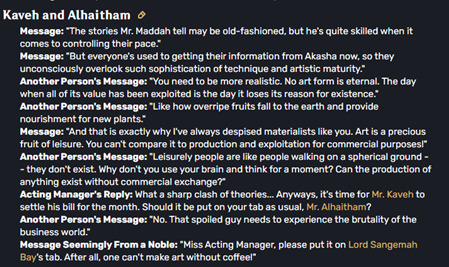
In Kaveh and Alhaitham's discourse on the discussion board of Puspa's Café, the two disagree over the subjective value of art. This topic is of particular significance to Kaveh, as it is a key element of his character design in respect of his career as an architect, being an artist himself, as well as it being highlighted within his Hangout. This is one of the few instances we receive of Alhaitham and Kaveh discussing the arts with each other to such an extent, so it is interesting to gauge Alhaitham's viewpoint.
Alhaitham holds a pragmatic view of art as a recourse, aligning it with any other material good to be produced, whereas Kaveh's viewpoint aligns with his sensibility, in that it is the meaning of art that trumps its material price and market demand. This makes sense considering their mirroring perspectives, in which Kaveh is described to be the opposing sensibility to Alhaitham's rationality, and in that human feeling is contrasted with practical knowledge.

The idea of correctness is alluded to here with the 'clash'ing of theories and Alhaitham refusing to pay for Kaveh's tab due to Kaveh disagreeing with his 'materialist' perspective. Since there is no definitive answer to their debate, there is no objective correct opinion offered. This idea of 'correctness' is a extremely relevant to Alhaitham and Kaveh's relationship, being a reason for their past argument and the misalignment of their once seemingly harmonised views, manifesting in their joint thesis of language and architecture. Now, however, the two are on differing wavelengths and appear to assert their opinions as the objective truth over the other (which is further discussed here). This ultimately acts as a detriment since Alhaitham asserts in A Parade of Providence that sometimes correctness can mean 'nothing at all'.
Not only is this particular board post interesting in regards to the differences in Kaveh and Alhaitham's characters and their approaches to life, it is also relevant in establishing their rapport with each other.
On a surface read, Alhaitham and Kaveh’s relationship can be simplified as “terrible” (as described by Geoff in A Toast To Victory), as in the two do not get along - but this in itself is a contradiction to Alhaitham’s inconvenience-avoiding nature, as by this he would gain nothing by allowing Kaveh to live with him.
Alongside their situation as roommates, it is revealed here that Alhaitham usually pays for Kaveh’s tab in Puspa’s Café, as well as buying crates of wine for the two of them from Lambad’s Tavern (as established in the Mahamata Bulletin Board). Whilst this is established, what is not established is what Alhaitham receives from these actions in return.
The implication is that Alhaitham does so without any expectations of reciprocation – as follows with his ‘rule’ of not keeping “track” of favours, so long as they do not inconvenience him. Alhaitham offering to buy Kaveh drinks in reference to a hypothetical furniture shopping excursion is referred to as a “loan” by Alhaitham, however, this does not mean that his paying off Kaveh’s tabs counts as the same.
When Alhaitham declines paying for Kaveh’s tab, it is because they have disagreed over their philosophies, and Alhaitham does so to ground Kaveh’s perceived idealism – referring to Kaveh as “spoiled”. Since Kaveh having to pay for his own tab is seen by Alhaitham as a sort of retribution, this shows that Kaveh typically does not have to pay Alhaitham back. This implies that the other “usual” instances of Alhaitham paying Kaveh’s tab are not loans, and are actions that are performed without expectation of reciprocation. Even within the proposed hypothetical scenario of Alhaitham buying drinks for Kaveh as a “loan” (as established in Alhaitham's story quest), he does not turn down Kaveh’s offer to go furniture shopping, and instead chastises Kaveh for pretending he is not in debt and having to live with Alhaitham.
These voluntary actions Alhaitham performs for Kaveh demonstrate the lack of inconvenience Kaveh imposes onto his life, and therefore rebuke the argument that Alhaitham actively dislikes Kaveh.
This discord of viewpoints and the lack of compromise demonstrated here as present within their two other bulletin board messages, albeit in different ways. The question ultimately posed ties in with the core question of their character design, most accurately put across in Kaveh���s Character Story 5, can their mirroring viewpoints ever align? Can they restore the harmony once established between them? Can the two ever understand each other?
#haikaveh#kavetham#alhaitham#kaveh#haikaveh meta#genshin meta#i think about the bulletin board messages too often#do you think the devs have forgotten about them? yes!! <3#this whole exchange just makes me think of nilou's story quest#and everyone called that guy lonely and touch starved#an incidental alhaitham parallel?? i think so!!
27 notes
·
View notes
Text
Tbh? I think the radiant emperor duology deserves more critique than it gets in its tag, so after stewing it over for a couple weeks and also discussing it with my friend, I have decided to do it myself.
So. Spoilers for She Who Became the Sun and He Who Drowned The World ahead.
First off, so nobody accuses me of hating the series, I liked the series. I'd say I'd give the first book a 4.5/5, I thoroughly enjoyed it, and I like both books. I truthfully skipped the fisting scene, it triggered some dysphoria that I wasn't comfortable with personally but I don't have problem with it existing in the book, it's good where it is, no changes.
No, my critiques come mostly from the second book, hwdts. Which sucks because I absolutely loved Baoxiang in it, it's a well known fact that my ideal type is pretty, really mean, characters. ('What about Madam Zhang?!!!???!? Shes mean and pretty!!' I hear you ask. Give it a second cause i will get to my beloved madam zhang) So, my critiques are mostly organized as 'The first part I didn't like in Hwdtw that signals the thing that became my biggest issue, the bits in the middle that i did like along with the bits that I felt didn't really work well, and Act 3 which is where my issues really were exacerbated.'
By the end of book one, I had a general annoyance but acceptance that Ma Xiuying was a bit of a weak character, and not weak as in 'dang shes a woman and cant fight' or any other sexist way you may interpret that, but weak as in structurally, she didn't really have as much depth as other characters. I thought she didn't have as much time put into her character as others. And yeah you could have a million character analysis essays over Ma and her place in the story and etc, but for me, her setup for the next book as potentially having conflict with Zhu or her own morals was the most interesting part of Ma. In general I think a lot of people tend to overlook this flaw partly because Ma is a cis lesbian character and the main 'love interest' in a book that is usually marketed to people as sapphic, which yeah there is certainly a sapphic relationship in the book but I think saying it's a major part of the book is really giving the relationship a load bearing wall ot isn't strong enough to carry. The Radiant Emperor Duology is not a romance, first and foremost. To describe it as a wlw romance is gonna leave people who read ot specifically for that reason kinda dissappointed by the end of book 2.
My big critiques didn't start until book two, and a particular scene, though. Ma, at the start of book two, was generally filling the niche of 'nagging wife' to zhu, which yknow, is a fine place to start from. I was a little disappointed there was no further discussion of Ma's disapproval of the morality of Zhu's actions, and in fact the dead child was pretty much entirely forgotten by Ma in favor of being Zhu's wife. Which, yknow, sure.
The Scene I had issue with happened (Spoilers once again) after Zhu finally captures Ouyang and imprisons him at her base of operations. Ma, dressed in her empressly regalia enters his room with the intention of being the bigger person. She walks in, looks at the stripped down and humiliated general who killed her father and famously is also really a women hater, and tells him she forgives him for killing her father. And then she gets upset and cries when the prideful general who hates women gives her a dressing down and taunts her and is like 'I'm glad I killed your father'? She nearly cries because Ouyang was mean to her (notably only cause he was mean to her and didn't gracefully accept her forgiveness, not because he killed ehr father) and runs off to Zhu. And Zhu responds with 'Wow, he's just a weirdo, everyone likes you and everyone in existance immediately knows you're a good person and you change people.' Which, my friend suggested before she finished the book, was a case of Zhu placating Ma and dismissing her feelings which would be an interesting dynamic.
Really my hangups with this scene come from multiple parts.
1. Ma' few character traits including being observant and reading people really well (a thing she's praised for in book 1) and having good social intuition are completely thrown out by her thinking being alone with ouyang and forgiving him would be a good idea and then her being shocked and upset when he spat on her forgiveness. And
2. Zhu's response is never once treated by the text as her dismissing Ma and placating her, and Zhu's statement despite never being shown to be true before and that moment being the first time it's ever mentioned, ends up becoming Chekov's moral purity by the end of the book, where the plot hinges on Ma being able to magically heal a damaged character's mind enough for Zhu to win in the end. Which I will get back to. There's a lot of other stuff happening between here and the end.
So, before I get back to Ma and her role in the story, I'll address some other bits from after this scene. Both problems and things I enjoyed generally.
Madam Zhang and her parallels to Baoxiang and her being the absolute queen of dissociating really was interesting (before act 3). She was a very compelling character who I completely understood and felt positively about. She had a way more interesting relationship with gender imo than Ma did, especially in book 2. I didn't really like that she was overwhelmingly shown having sexual villence done to her, that felt weirdly like a punishment. But, I did like her a whole bunch, and I liked the look we got into her head. She was probably my second, maybe third, favorite character in the whole book until Act 3.
I really, really liked Ouyangs dynamic and relationship with Zhu. The weird sexual tension between them, their weird kinda nonsexual but also kinda very sexual S&M relationship. It was somehow the most sensual, sexual part of a book that featured Madam Zhang having sex with multiple people, and Zhu going down on Ma, and a lot of other mentions of sex or scenes involving sex. Tbh I feel like, in a way, Ma was left to the sidelines for most of the book because Ouyang became the primary 'love' interest for a hot second there and the only reason Ma could get her spot back was Ouyang and Zbu's separation. Also, from what I've seen when people talk about this book, they always kinda try to express Zhu and Ouyang's dynamic as very nonsexual and nonromantic, as platonic mostly. And there is no inherent superiority of romantic over platonic, but I think to insist that it is only platonic, and not a strange swirl of romantic, platonic, sexual, frustration and relief, and a swirl of familiarity and vulnerability all wrapped into one, is doing the dynamic a bit of a disservice. And ther is, imo, very clearly a subtle hint of romantic intent and interest on Ouyang's part before he realizes Zhu has a body he hates.
Which is also another point I didn't like. Ouyang and Zhu's relationship end felt off. The entire bit with the pirates felt off, but especially how Ouyang found out about Zbu's body, and how Zhu reacted. I think Ouyang finding out second hand, from a combination of being suspicious and from Jiang saying it, was a poor way for that to be revealed. I think there was a better way for that to happen that woyld have felt more like a betrayl to zhu than this did. The fact that Zhu and Ouyang were so in tune and could see each other perfectly, but this one thing was a blind spot for both of them because of how unaffected by gender Zhu was compared to how overaffected by gender Ouyang was is a really interesting thing to explore, an interesting disconnect between two character's whose entire basis for their relationship is 'like recognizes like'. I think Zhu seeing it as a betrayl would have been more impactful if she had presented this informatuon to Ouyang herself and been rejected than how it went down. And, I think her not realizing Ouyang would be disgusted that he felt connected and felt a sameness to someone with a body he found grotesque and that he feared would have been more interesting for zhu, who views herself outside of womanhood and didnt really think that other people would not see her outside of womanhood, if she was the one who told ouyang herself.
Also, less importantly, think going into Ouyangs annoyance that zhu kept moving his target further away was a good move but it wasn't expanded on as much for my taste. I also really liked it when (spoiler) Xu Da dies, and that entire part despite some minir bits, was extremely good in that Zhu finally has tasted loss. She had, up until that point, been riding a wave of positivity, she was the underdog who won over and over again despite all the odds and despite her own reckless choices. So I did appreciate that everything went wrong for her at least once. that would have been, imo if other things were changed, a good place to end a book two in a three book series. Which will make sense as to why I mention it im a bit.
I also didn't like how Ma was nonexistant unless the plot was like 'ok we need to remind people that Ma exists.'
And there's of course other stuff but those are the main points of acts 1 and 2 that i wasn't fond of or that i liked.
Act 3 is a wholely different behemoth which can be encapsulated with 'I wish it was longer but also different' (courtesy of the convo my friend and I had).
My friend and I both agreed that we liked this kind of courtly drama game it was playing. My friend doesn't tend to like the structure or writing style of a lot of the chinese wuxia, danmei, or courtly drama translated books i read, so it was nice to know that the genre content isn't the issue for her there.
The biggest problems I had with the ending though was 1. I think Baoxiang and Ma had an interesting dynamic despite it being really rushed and how distasteful I found the entire concept of Ma being such a good wholesome goody good good person that she could change Baoxiang, quiet his demons and fix him in some way. That was annoying in an otherwise interesting dynamic. And 2. I think Madam Zhang's character traits and cleverness and all that were wiped away to make her inexplicably jealous of Ma in a way that I don't think fit her character and just served to fit a trope of jealous empress who hates the favored concubine.
So, here's my major proposed changes.
1. Ma gets sent to Khanbaliq extremely early on. Like, act one maybe after ouyang is captured early. This serves three purposes. A. Ma has something to do and is more present in the story. this could be a good xhance to let her actually feel frustrated or upset at Zhu in some tangible way that needs to be resolved or talked thru eventually. B. she gets more time to build a relationship with Baoxiang, whose entire defeat hinges on him having a strong connection with her. and C. Her absence in the other parts of the book feel less like she's being ignored or forgotten. It makes Zhu's lack of haste more than just a way to annoy Ouyang, and turns it into an interesting moral choice. Should she rush to Khanbaliq to save Ma or trust that Ma will be ok in favor of gaining power? Her lack of haste means Ouyang leaves, depressed, and she loses Xu Da, all while she doesn't even have the assurance that Ma is ok, she is truly at her lowest point with nobody with her. If Ma is in Khanbaliq and that's explored, then Zhu and Ouyang can also explore their dynamic without Ma feeling a bit like she is battling for Zhu's attention.
2. Madam Zhang is suspicious of Ma, or feels actually tangibly threatened by Ma. In act 3, Madam Zhang's anger towards Ma feels really out of place. She got exactly what she wants, she is empress, her emperor isn't interested in removing her from her position and her position isn't threatened by anyone. Baoxiang won't get rid of her, he won't demote her, he has shown zero sign of ever even considering it. So, why is Madam Zhang jealous of Ma? Imo, especially since she very clearly has dissociated into oblivion and has no love or affection for anyone anymore, and no real desire or motivation to secure her position further aside from maybe producing an heir to make sure shes taken care of after Baoxiang dies, there's no reason for her to be inextricably jealous of Ma. It kinda just erases all of Madam Zhang's political savvy and cunning into jealous, petty woman, and that sucks. If she was suspicious of Ma's intention, or Baoxiang genuinely expressed spmething that actively threatened her position, her hatred of Ma would make sense, but instead she hates Ma cause Ma is ugly and spends every night with Baoxiang. She hated rice buckets concubine cause that concubine used a lot of funds and competition genuinely made her position less stable. She needs better motivation for hating Ma.
3. As I mentioned earlier, Zhu needs to be the one to tell Ouyang that she does not have a dick. That's just all around better, it feels more like a betrayl to bare your secrets and be rejected, etc etc.
4. The duology should have been a trilogy, with book 3 starting when Zhu is at her lowest, ouyang is dead, ma is in khanbaliq, Xu Da is dead, a new guy is the emperor. This is where a book three should have started. in a series that has so many important characters, i feel like it needs more space. she's in a 10 gallon tank when really she needs a 30 gallon tank. Lots of it, especially towards the end of book 2, felt rushed and the extra book will absolutely push that back a bit and make it less rushed.
Anyways that's my critique of The Radiant emperor duology. Once Again, I liked the series, its one of my favorites i've read all year. I don't dislike it, and having a critique or opinion about something doesnt mean I didn't like the book or understand the book (because obviously if i understood it i would understand why its flawless). I liked it, there are things I wish were different, that's it.
#radiant emperor#he who drowned the world#she who became the sun#radiant emperor spoilers#spoiler#i wrote this in like 2 hours at 4 am and i got lazy halfway thru editing it so if theres typos rip#i just needed to get it out of my brain#organized in text somewhere other than jamies discord dms#thank you jamie also#i have a lot of opinions on this duology#some i didnt even mention cause its 6:30 and i forgot#i think shelley parker chan wants to write nblm or mlm books tbh#i dont think they really wanna write sapphic books#and tbh im ok with that i think there should be more books about transmascs#the tiktok/tumblr habit of describing a book with tags really also doesnt help this book also#i think to say 'sapphic enemies to lovers' for this kind of book gives people the wrong impression#especially since once again i wouldnt really describe it as sapphic in the genre way#anyhow again so nobody kills me#i did like the books#i enjoyed them i loved them i did not hate them at all
79 notes
·
View notes
Text
ERICSON'S WALLFLOWER
or bpd as a twdg fandom essay, & violet's analysis
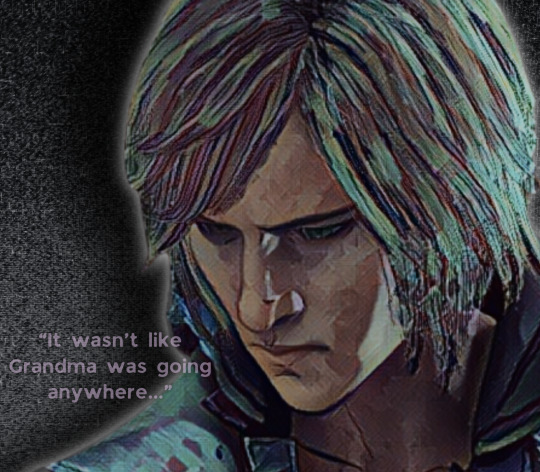
[Mar.26-29.2024 | 27,991]
Throughout my time spent within the TWDG fandom—since late 2019, early 2020—, Violet as not merely a love interest but a character exists as the fandom’s staunch polarization. And the funny thing?
I get it. A lot.
Much of what I’ve read into this character has been extrapolated from my own experiences, and those experiences speak to an inherent, polarizing chaos. It’s something that’s quite honestly a purgatory to try and articulate—I have tried—, and another bane to hope that people will get it. At least, enough to not just sweep my words under the rug. This essay is ultimately a trial to see if I’ve done enough work with myself, both emotionally and in writing, to be able to explain this to those none the wiser, or to the some who feel the same things, but have yet to hear it spoken with absolute clarity.
Through a fandom essay, no less. Specifically about a video game character who grows on people—Louis promises so.
Borderline Personality Disorder.
Nobody really likes to talk about it. Too many times in my life, I’ve had people sweep it under the rug because it is not a pretty thing, in times where I was pleading for help; often, in presence of the wrong crowd, it feels like a target nailed to my back.
It’s intrenched within stigma. And what’s difficult about that is…, yeah. I get why. There’s no mystery to it.
…yet there is so much people do not understand because not talking about it is so much easier, and the joke is, talk therapy is quite literally BPD’s primary treatment.
And so let’s talk about it. Allow me to pull away the confusion this disorder brings, and lay it out—as best I can—in a more digestible manner, through a deconstruction of Violet. I’ll have a little fun with it. However, if this essay reads in a more…straightforward tone compared to the couple others I’ve written now, it should. I’ve attempted to write this in a more lighthearted language before, but it didn’t really get the message across well, I would slip to this anyway, so. Yeah. I will still be conversational, just less so.
With that, however, this is another long essay. I hope you enjoy. :)
[Given the subject matter & the inclusion of my own experiences, take heed. This discussion is sensitive. W/ my experiences, I assure you I'm fine. I speak from a place where I’ve worked through my experiences.]
[Also, to stop-breaking-my-heart-telltale: I reference Louis and one of your essays about him, hence the @. But this thing's real long and about Violet, and stuff. Lol.]
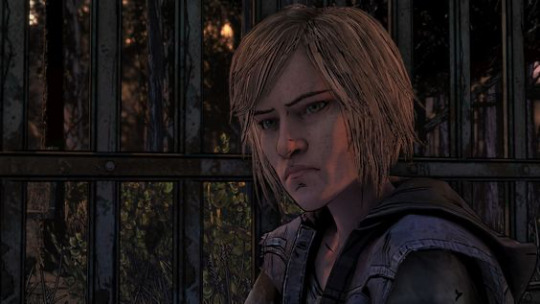
[Briefly, but Exhaustively, to Clarify]
Before any discussion of BPD, then Violet’s deconstruction, a few things.
One. No, I’m not outright diagnosing Violet with BPD. She isn’t diagnosed in the game. I’ve not heard anything by Telltale or anyone associated remark BPD either. None of the schoolkids, for the matter, are diagnosed because it’s not that kind of story. The most we’re given is a narrative that explores their patterns in behavior, and then one…“diagnosis” with Willy. That being the, uh, chronic masturbation. (No, I did not think masturbation would be included in this discussion, but here we are. Thanks, you bug-eyed child.) Even then, however, that was likely a symptom of a larger issue with Willy.
Instead, I like this character. I see a lot of myself in this character, recognize the patterns she exhibits, and I’m hardly the first to associate Violet with BPD—since though she’s not diagnosed…, she is a little bit textbook. I’ve also seen a lot of the fandom misinterpret, preemptively judge, Violet for the things she does.
And I don’t mean the confusion and betrayal players feel should they save Louis over Violet. That reaction is normal. Yes, feel confused and betrayed. Because that’s the intention. What I take issue with, and part of why I’ve wanted to write this for a long while, is the…undertones beneath what is generally said. The opinions, too, that go along with it. All of which, ultimately, feed into the stigma that BPD is so intrenched within. The ignorance, and the refusal to understand both why and how.
So I do this through Violet because I adore TWDG, I’m in a TWDG mood, and, she is actually a phenomenal example to use for discussions around BPD. No, she’s not canonically diagnosed, but, it is better to explain a character by using a researched concept, just as much as it’s easier to explain said concept through a fictional example.
…and myself.
This essay will have a lot of commentary based around my experiences. A lot of this disorder’s stigmatization makes it difficult to find good information to understand what it does—specifically from the perspective of the borderline personality, not observers—, because…it’s just not the same as ADHD or depression, which have been big talking points within the recent years. I also have ADHD—runs in the family. That said, conversations in mental health has its fair share of stigma regardless, it’s just that BPD…does not help itself, largely due to the concepts I’ll be going over.
Also, I am very similar to Violet, down to how we dress, but also in personality. We’re not the same, but there’s enough where I feel like I can explain a lot of this character in relation to BPD. Because it’s a personality disorder. In similar personalities, the disorder will—more often than not—present itself the same way.
This does lead me to a third: as much as I’d like to say that this discussion will be the absolute, universal truth, the reality is no, this discussion will likely have blind-spots. It won’t be universal. For a myriad of reasons.
BPD is, again, a personality disorder. Its expression is entirely dependent on the personality, and the experiences established. So anyone who is not an indifferent/apathetic person, who is more extroverted and not the marginal recluse that I am, there will be aspects of this that won’t align. The rudimentary concepts may apply, but the expressions and emotional processings behind these concepts may not.
This also bleeds into the fact that BPD overlaps with many conditions, and traits of the disorder can be found elsewhere. Which, quite frankly, is fairly standard for most disorders, because it’s about the expression and amalgamation of the traits, not the traits themselves. So, as I discuss BPD, you’ll likely find yourself relating to certain points.
Do not take this to mean that you yourself have borderline.
Well, okay. You might. There’s nothing wrong with doing research, and to evaluate all of your resources. Keep in mind, however, there is a difference between one condition relating to another, and one BPD relating to a likewise diagnosis.
BPD overlaps with many conditions (like ADHD); it shares many traits in others.
The reasons for it includes how BPD is developed, where the development will be alongside other conditions—like, say, PTSD—, or other conditions may predispose the condition—ADHD—, or, or, both.
And then, some of this relatability is due to language. There are limitations in the words I choose, especially when this essay is intended for a wider audience. When I say, I go from 0 to 100, you may know precisely what I’m putting down, or, your 0 to 100 is my 0 to 10. And there will be that barrier in understanding because…we’re different people, with different experiences, living alongside different conditions.
Some of you reading will just never understand what it means to get whiplashed by your emotions at the drop of a dime, where you’re perfectly fine one minute, and then you feel like you’re about to have a heart attack the next because someone said something, and you don’t understand why it hurt you the way it did, but it did, and you’ve already lost your shit, but you don’t want to do anything, but you can’t trust that you won’t… All…with the guilt that it is happening again, and you should have known better, and it’s all your fault…
Yeah. It’s okay if you don’t understand what that’s like. And to be quite blunt, if you don’t, be grateful. BPD isn’t fun for anyone. There are slight blessings, but those are gravely overshadowed.
Given that I do expect a lot of people reading this won’t understand, this essay will be exhaustive. I don’t really want to cut corners, even though certain aspects of my experiences will be kept to myself, and not everything about this disorder can be related to a video game character.
I do want to give it its due. The drafts before fell into the trap of not articulating precisely what I wanted, with the transparency I needed.
…hence why it’s long, but with that, let’s start with understanding BPD at its core.
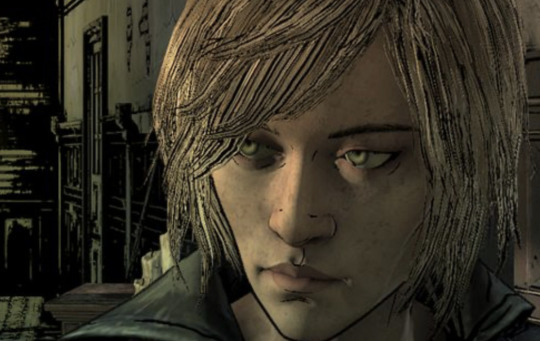
[BPD, in Experience, as an Introduction]
So. Borderline Personality Disorder.
Boiled down, it is purely the complete lack of, or, the severe impairment of emotional regulation.
That’s it.
That is literally all it is. And in understanding that, it explains (in part) how and why many of you may relate to certain aspects throughout this essay—emotions, and the (dys)regulation thereof, are integral to each and every one of us.
However, BPD is distinct, and I will comb through the how and why in this section. It is quite simplistic when boiled down, but this synopsis implicates everything about a person.
It is also. Not. Bipolar Disorder.
(Yeah, let me just kick this out of the way.)
Bipolar Disorder is about the brain chemistry, and is defined by manic and depressive swings.
Borderline Personality Disorder is a disorder of the personality. It’s systemic to the person. Could someone with BPD also have bipolar? Well, yes, which doesn’t help in the confusion, but to be the least bit informative, those instances often imply a specific BPD type (comorbid).
[Further resources will be linked at the end, for the BPD types, relationship with bipolar, and additional elements to come. For the sake of the essay, I won’t delve into this in-depth.]
This nuance—comorbid-BPD and bipolar—illustrates how complicated of a conversation BPD is. Again, it’s why this essay will be exhaustive, but also selective in what it covers.
Including, but not limited to, this kind of nuance.
To embark what a severe impairment/lack of emotional regulation means, it’s important first to establish the working definition of what emotions are—the definition, at least, which this essay utilizes.
Emotions are the reactionary senses of the body. Where sight, smell, touch, taste and hearing are the immediate feedback from the environment to the body, the emotions are the immediate responses to the stimuli, to prompt our actions thereafter.
Our relationship to our emotions is a very complicated one, because…we physically feel our emotions, which can be conflated with the feedback from our environment. Comprehension is also required to understand what, exactly, these emotions are signaling to us, because an environment isn’t just physical. Social, cultural, and psychological environments are included.
If you ever wonder what, exactly, a dog with the intelligence of a 3-year-old actually means, it’s their comprehension level of their emotions. These dogs are feeling the same emotions as a 3-year-old, and a 30-year-old. But there’s a catch: dogs don’t do the whole language acquisition thing like we do. Language acquisition being the learning process we undergo in our youth, because we are wired to speak and derive meaning through vocal, then visual, patterns.
I say this because a lot of emotions are, physically, perceived the same way, but we use language to distinguish one from another because contexts do matter. And they matter a lot.
Like, what’s the difference between lust and common excitement? They both feel similar, don’t they? But, lust is specific to a defined context.
And in this way, language absolutely contributes to the complexity of emotions.
But ultimately, emotions are just there to tell you what comforts you, and what doesn’t. It establishes what kind of environment you feel safe within, or at risk; the gradient within that establishes what you prefer, what you can tolerate. So the places you go to. The people you surround yourself with. Your interests. Activities. How you want to present yourself. Your morals, and ambitions. Identity and sense of self.
All of it is prompted by emotion, and your comprehension of that—ultimately through language—establishes how you respond.
How we actually navigate this is through regulation. Or rather, the process of self-comprehension, where an individual has to evaluate a situation, their internal reaction to such stimuli (both in thought and feelings), and the appropriate behavioral response. Dysregulation, then, is where that process is faulty.
So as we mature into adulthood, and our learned behaviors are set in stone (more or less; old dog, new trick or something), we’ve ideally learned how to comprehend these emotions, how to use language to articulate them and relay them to others, and find what is comfortable and what isn’t.
People get in the way of themselves, however.
For some fucking reason, we think we’re so fucking smart because we can talk, and we got thumbs, and we, like, stand on two feet. Or if we don’t got two fucking feet, we can build a wheely chair to sit our asses down.
And? We like to convince ourselves that we know better than our emotions, to the point where they’re disregarded. Of course, social contexts, understanding how your actions may impact others—those are all nuances which, yes, our emotions may not respect, but we do.
In regards to when people refuse to acknowledge emotions for what they are…
Piece of advice, from someone with BPD, emotions run like rivers. You do not decide what that river’s water is, how much there will be, and when it will flood. What you can decide is what canals to dig to retroactively contain that river, when to do that, and to establish how to treat the different flooding waters. You will drown if you think you can just ignore them.
Because the funny thing about water? If you fall high enough, land the wrong way, you might as well have hit stone.
In this way, emotions are devastating, and the mind and body has many mechanisms to deploy should an individual be constantly bombarded, and there is a need to prioritize our primary senses—touch, smell, sight… To prioritize a survival.
Take DID, for instance, where often it’s the mind “divorcing” itself into several identities in order to protect and shield the host from further trauma. There are many, many disorders like this where the brain deploys its failsafe, but that failsafe comes at a price.
BPD is, effectively, what happens when one of these mechanisms deploy, but the cost cripples an integral function to the human experience. It cripples the capability to dig those canals, redirect those rivers, and it can even imply a blindness to what kind of water is flooding.
…in many respects, this implies that BPD is, inherently, a disorder rooted in other conditions, just set to the absolute extreme. But when I say “absolute extreme” to someone who has never experienced emotional turmoil, the wrong impression may be impressed. Again, much of what I say may relate to your own experiences, and it’s why I have to take great care in articulating precisely what I mean because…it can be easily misinterpreted. Everybody has had moments where they are not in control of what they feel, and they do things. However, while the instances may look the same, the mechanisms, patterns and history behind them…are not.
Hence why BPD and bipolar are so often confused, because at the height of those disorders, it can very well look the same. I have had manic episodes that look identical to someone in a bipolar episode within one moment. But the differences are the mechanisms, patterns, and history. For these two disorders, it’s what’s actually going on in the brain, what stimuli we’re actually reacting to, and then timeframe. Mania in bipolar can last months; in me, I plummet into mania for minutes, or hours, or days—a week at most. And I can rocket right back out of it, back to an indifference, or into some other extreme.
And those mechanisms, and patterns, and histories are what make BPD, well, BPD.
We now get to how BPD happens. And though there is some debate, BPD is a developmental disorder. It’s created.
Through a number of factors. Genetics (like a family history), accompanying conditions (such as ADHD, autism, due to the predisposition to emotional dysregulation), past experiences of trauma, and, the environment.
And that’s the footnote version. Because this disorder, while there are strong patterns observed across diagnosed individuals, again has its nuances. Going into what causes BPD will lead you down a steep rabbit hole—in part because it’s dependent on the person, history, and environment, and in part because…, well, there is stigma, and there’s a lot of unknowns. Borderline, as a name, is not telling of what the disorder is. There’s a long misogynistic history to the disorder’s criteria, despite the fact that there’s a lot of men out there that have stunted their emotions, will fly off the handle when their egos are slightly bruised, call themselves alphas, are vehemently loyal to that alpha identity…
Hm.
That’s a discussion for another day. Point being, I cannot indulge this essay into every kind of way a person can land themselves with the disorder. It’s never ending. I have other priorities to indulge. Such as:
What kind of abuse is commonly attributed to BPD?
The answer? For such a volatile personality?
Neglect.
Funny, isn’t it? How neglect—the absence of—is what often causes BPD, of all things. Most would likely scoff, because our world has groomed the idea that the other kinds are worse, and are what creates monsters. Because it doesn’t make good tv, does it? Like the times where I was sat in time-out for…some reason or another, on a bench beside a chalkboard. Upwards to 10 hours of the day—which is a long time at three years old. That doesn’t make for interesting scenes, does it?
No. And because it doesn’t, and stories like their spectacle, media relies on the other kinds. To the point now where it’s necessary for our idled attention spans.
To be clear, this isn’t to demote abuse types outside of neglect, nor is it to insinuate that they cannot coexist within one circumstance. The fact of the matter is, different traumas with different people in different environments will lead to different conditions. There is no worth in proving to each other which trauma is worse or better, because it’s entirely dependent on the people and environment(s) involved.
What I will demote is the common, ignorant insinuation that neglect doesn’t destroy a person.
It’s why it is ironic, how BPD—an explosive thing—is often born from neglect.
How it does such a thing is…complicated. Lucky for this essay, I’ve lived it.
Within the first handful of years in my life, there were many things like sitting on that stupid bench in my room, for hours upon hours. My parents, at the time, were young themselves and fresh from college. My dad was in the military, so he had been deployed, leaving my mom alone with me, and…her BPD. I suspect postpartum made things worse.
Before you assume, it isn’t that she didn’t love me. Quite the opposite, but it was only through the divorce a few years later was she diagnosed. So, she didn’t have the resources for such a disorder at the time. Which made things worse, because part of treating BPD is being aware you have it.
The thing about these kinds of abuse is that…they come from the people you least want to admit, and for me, it had been my own mother.
And, the thing about neglect, especially mine, is that it’s hard to explain how no…, she was home. It wasn’t like she’d leave me like that. But, even so, I couldn’t tell you what the fuck she was doing when she wasn’t in the same room.
I was left to my own devices. I told myself stories with my stuffed animals to pass the time. I was often hungry too, and there are two accounts from family where, upon visiting, they saw this little toddler know how to work the baby-gate to the kitchen, and start to prepare food—sandwiches for me, and I’d pour food for the dog.
I seldom spoke, was borderline mute. Didn’t really converse until four. But I knew what people were saying before that. I did also pick-up behaviors from my dog as well; I would pant whenever I was happy, and whimper instead of cry.
By the tail-end, as I was getting into kindergarten, my brother was born, the divorce was in motion, and my dad would thankfully win full custody, and my mom, visitation.
You see, through those initial years, those mechanisms deployed.
I had to swallow down the instinct that the parent would be the one to nurture, and I had to find ways to feed myself, then my best friend and true guardian—the dog. Had to learn how to work things like a baby-gate. I also had to be vigilant of her, and know what mood she was in.
It’s these two things, working together, which utterly fractured me emotionally. The feeling of being hungry, truly hungry, is not something I wish for anyone. The realization that it’s not because you’re out of food—not until the separation began, and the weekends with my mom were marked by this hunger—, but because you don’t know how to get that food, and the bigger person is not getting the food, so you try to learn but you are still a small child… It’s even worse. It does something to you. Then, having to sacrifice your own emotional nourishment in order to keep an eye on an adult’s volatility is that final nail.
That was the first stage of my neglect. And it was bad. It was a really, really bad situation. My brother only lived with my mom for a couple years before Dad’s full custody. In that time, from when our mother was the only one to take care of us with my dad helpless in a different country, then to switching every week, he developed OCD tendencies, which are still present.
Twenty years later now, it’s been remarked that I was…kinda the best candidate to survive this out of not just my brother and I, but our cousins as well. And I agree. I’m naturally reserved, and even as a kid, I would push back against my mom. It would ignite her, but the fact that I was confrontation said enough. Meanwhile…, I do not know how the fuck my brother would be mentally if he’d been the one stuck alone with her for those three, four years. I don’t know what my dad would’ve come back to whenever he was allowed to be with his family.
And I would not trade places if given the chance. Because even if I’m a black sheep, my mechanisms allowed me to get away as well-adjusted as I could be.
But… Still. Beneath those remarks…, there is a misunderstanding. When my family says I was the best candidate, it’s because they look at me and see a person who isn’t sick. When I say I was, I mean…my brother would have been worse off.
Granted, now that I’m out of school, it’s slowly dawned on them that…yeah no. There is something wrong.
…as I aged through childhood, I didn’t quite understand what the costs of the mechanisms deployed were, but I knew there was something very, very wrong even back then. And I would tell my family. Every now and again, throughout years, I’d raise alarm because I realized I reminded myself of my mom.
Only to be told that I wasn’t my mother, and that I was overreacting. Told me that, “People like her don’t know there’s something wrong—that’s the disorder.”
Come a mere few years ago, and I am told about times where my mother, as an adult not long before having me, would break down because she didn’t want to be like my grandmother.
There was a family history. My mother knew it. However, she was also diagnosed through the divorce, because she couldn’t take care of my brother and I. Highly doubt admitting her BPD was the reason was because “she didn’t know there was something wrong.”
I was told there was nothing wrong. Meanwhile, I would do things I didn’t understand, and experience the world in a way people around me didn’t, …as it turns out.
For one, which is still true now, I cannot cook for myself, in a kitchen, when it’s dark out. I also cannot cook when someone else is nearby, or already in the kitchen itself. I will wait, because should I cook in those times, there’s a feeling. And I can’t stand it. The feeling of—
Oh. No, the feeling isn’t being watched.
It’s the feeling where someone may be lurking, and I’m about to get caught. This is likely a remnant of times when I was very, very young, and I tried to feed myself, and I…was caught. And she blew up.
There are other behaviors like that, specific to me. Because the body remembers before you yourself.
In the years after my mom, I found myself in the second phase of neglect—the one, I argue, is what actually creates BPD.
And again. For another time. It came from the people I least want to admit.
The neglect, the denial, in every alarm I raised did something to me. Another thing, though given my experiences, it also did feel similar to the first phase. My family loves me, I understand, and I get why they denied. Because they knew about what was happening to me, then my brother, but circumstances had them trapped in watching from afar. A sort of…they didn’t get to me in time.
My mom was also a nightmare for my dad. So…, to see that resemblance is not something anybody wants to admit.
But still. I was in therapy (to socialize me), but that didn’t last forever, and people kinda just shrugged and thought it was good. The therapy did its job. Without noticing what was happening.
The mechanism that deployed was still there, never to be acknowledged. So it festered. It scarred my trauma over, and now, there’s a great blemish on my mental health.
And that blemish has a name, and it’s BPD—the disorder cultivated by the neglect of an aftermath. Where trauma struck, and there was no chance given to process it effectively, and to heal.
All of the nuances I’ve discussed before remain to be true. From what I understand, however, is that the primary reason why Borderline Personality Disorder can look so differently on so, so many people, through a range of traumas is…it’s consequence. BPD has its characteristics, the ones that distinguish, because ignoring the recovery after significant trauma presents itself the same.
Now, I’ll indulge in one of these characteristics.
It wasn’t until recent, as I embarked my adulthood, where I realized the core mechanism I had inadvertently deployed, the one that came with a price:
Alexithymia.
Or, emotional blindness.
This in itself is not considered a disorder, largely because (and for the sake of this essay) it is an associated symptom, a mechanism, of many, many conditions. Depression, PTSD, eating disorders, ADHD and autism (again), schizophrenia, and I can go on, and on, and on.
BPD is included, of course.
There are many ways to be blind. Take visual blindness, where it can be an absolute void, a severe impairment, some colors recognized but not all, or, there’s too much feedback at once, and the light becomes illegible. Being devoid of emotions, or apathetic, is the standard; some people may feel a perpetual onslaught that cannot be deciphered, and others could find themselves in between.
Whatever it may be, alexithymia is characterized as the impaired awareness, explicit identification, and/or articulation of one’s feelings. So, as long as the shoe fits, and the person can’t decipher, convey/express their emotions… That shoe’s not on the wrong foot.
In my case, I fall into the standard.
When I was young, I likely stifled my own emotions in exchange for vigilance. It never left, however. If anything, it got worse the more I neglected recovery. Now, I don’t feel much, day to day. I know I experience emotion, and react to my environment, and have thoughts… Yet, the environment is almost dreamlike. It doesn’t quite register, and the people in my life feel like figments unless I’m right there with them, in the same room. I’m indifferent to most. Memories are a lot like this too—not like I don’t remember anything at all, but in the moment, I kinda just exist. I can think and plan about the future too, but it’s that I’ve realized I have to, not that I feel any kind of urgency.
Because I don’t care. At all.
Or, I do, but there’s nothing in here to tell me that. Because my body, also, is quite null. It doesn’t tell me what I feel. I couldn’t tell you in the moment, so I’ll usually resort to, “I’m fine.” And inside this head of mine? Not much. Kinda like static—the tv is on, there’s a lot of channels going, but it’s just…not there. Beyond static.
So as I write this, and write any of my works, it's less of spilling all the crazy thoughts inside my head, organizing them, and more of me spilling an open wound I don't know how to close, figured I don't really want to close it, because I kinda just like watching it spill across the page and see what I'm thinking, and what I can create.
To be quite honest, being a writer in this way does legitimately feel like I'm a blind sculptor.
If all this sounds like a depressing experience, I'm fine. Genuinely. I am. This is actually quite comfortable for me, and it's also me at my most rational. Plus, it helps that I've developed a fairly strong coping means—this writing thing—that serves to be a therapy in emotional comprehension. Another mechanism, really, that is derivative of what I did as a toddler.
I'm also a hermit. I'm content with being reclusive, and to myself.
And again, I’ve already processed all of this. I wouldn’t be writing this essay otherwise.
So how does alexithymia relate to BPD? In what way is being apathetic mean I can fly off the handle?
What does alexithymia mean for an episode?
BPD episodes vary. Depends on the person, and a trigger, and the environment.
In the traditional a switch is flipped, and the person just loses it, it’s via said trigger. A legitimate trigger, not whatever TikTok is blabbering. Trigger as in to a gun, and it just takes one pull, and you’ve been set off.
When this happens—BPD or not—, it effectively shuts down the reasoning part of the individual’s brain, and sends them straight into fight-or-flight. They are in a very primal state, and will react on emotion alone.
In BPD, our brains are wired to do that in (potentially) a very, very short period of time. Can be literally a blink and you miss it. There’s a look in the eye. If you know, you know. It happens enough times to establish a history of this within the person. Forces people to walk on egg shells to avoid this. Because it’s scary. It can get scary.
Here’s the thing:
It’s scary for us too.
Not too long ago, a lot of changes happened in my life, and on my birthday, I was driving, and I wanted, so badly, to just swerve off the road and down into the woodland—the ditches would’ve been steep enough. Woke up that day wanting to. Didn’t understand why, but I also wasn’t asking because that reasoning part of my brain was switched off. That day, the episode wasn’t explosive, but had I brushed upon a trigger, or someone accidentally said/did something, it would likely have been the case.
I was in an agitated state—straying down the line between stability, and not, where at first glance I’m fine, but…the more you look, there’s something quite wrong.
I was also craving McDonald’s. So I went. I sat myself down on my own, and ate my food.
And suddenly… Literally nothing was wrong. Well, no. I was still mildly stressed from moving from college, but, nothing was wrong that day. I was just hungry, not suicidal. Yet…it felt like I was. Had me believe it for a hot minute.
Had I not had the burger, fries, and McFlurry… I don’t know. Had I had access to something swifter than a car. I really don’t know.
This is what the disorder does. This is why it’s scary for the people around, and terrifying for us.
And in those like me, where everything is null, until it isn’t, it’s terrifying in a specific way. Goes from 0 to 100. Can get to the point where I have pain shooting down my arms, like I’m about to have a heart attack, because everything comes down upon me at once. Or, in episodes like the one I just mentioned, it creeps up on you—that agitated state. To the point where I don’t realize I’m in it, just that I’m suddenly hyperaware of everything, and there is something wrong, but I am not asking why because I can’t. So I just do. Quite blindly. And eat because driving off a road is too much effort.
So it gets scary. In those like me, where emotions just aren’t registering, I can’t tell you what I’m feeling until after the fact, or after considerable thought. Which is also fucking difficult because I don’t rightly know what I’m thinking. But given the situation, that could be too fucking late. And if the situation has me alone, to myself?
With BPD, there are triggers we know to avoid because they are related to traumas. There are things that wouldn’t normally trigger, but somehow did because they were the straw that broke the camel’s back, and we didn’t even know we had a fucking camel. And then. Sometimes. We don’t even know what the fuck the trigger was, and will never know.
The last is very common when we’re unaware of our BPD, but…it also just happens sometimes as well. The world’s big. The shit life yeets is limitless. I dunno.
There’s also a humiliation to an episode. I don't know what's going on. I can't reason like I should, and I don't want you to look at me. I want you gone, especially if I have deemed you the trigger. I want to be left alone. Things will escalate, and escalate, and escalate until that is achieved.
And, there’s a guilt as well. Especially when you know you have BPD, because by then, you should know better, but apparently, you don’t.
This all sounds quite helpless, I realize. However, there’s a reason why talk therapy is the central form of treatment for BPD. Knowing how to communicate does wonders. For those with borderline, learning how to comprehend and articulate emotions, and knowing what triggers to avoid, is a long, arduous process, but it helps. In regulating emotions as best we can, and in explaining to people beforehand what to do—or after the fact, where it’s to explain it wasn’t their fault.
And for those without BPD? Being able to recognize the warning signs on a person is detrimental. Because, believe it or not, there are warning signs. Sometimes they could be the split-second before, however, if there is someone in an agitated state, knowing what that looks like means you know how to avoid an episode, and it gives room to be able to console the person beforehand.
As said. There’s a look in the eyes. I know, because that’s what I spent my first few years of life figuring out.
The arduous process also unveils the…ambiguous sides to BPD. The stuff that people don’t really talk as much, whenever BPD is brought to the table at all.
For this essay, I will spare a glance at identity. No, identity doesn’t have much to do with Violet. However, acknowledging this ambiguous side to BPD establishes just how far this disorder goes, and it tends to crop up when least expected. (It will do so in this essay.)
A disorder of emotional regulation implicates everything, and sense of self is guided by emotion.
So what happens to one’s identity if there’s no guide to that sense of self?
It’s bleak. Or there’s a turbulence. Either way, it’s hard to decipher what exactly you want out of life, and for yourself, because there’s just no good way to tell what makes you comfortable, and what doesn’t. But you still strive to find stability. So you mirror those around you. To blend in and be accepted. By chance, it can extend beyond humans; me mimicking my dog—panting when I’m happy, whimpering when I’m sad—, it was probably so that my dog would console me when my mom wasn’t around. Because my dog (a lovely boxer) was very attuned to me.
The conversation with identity is…just another complicated thing. And this one is harder to articulate, in part because it’s not really discussed by people who don’t have the disorder. As opposed to the mood swings.
All that to say, when it comes to this analysis, the truth is, there’s not a feasible way to explore the nuances such as Violet’s relationship with identity, or alexithymia, because they aren’t spoken aloud to give us enough insight, and by proxy, these aspects of BPD are not what Violet represents. But acknowledging such nuances provides a better understanding in what this disorder means.
Regardless, Violet is a representation BPD in relationships, and the dysfunction of those bonds. How it’s exacerbated within an apocalypse, and then the self-treatment of.
Or, or, Violet has…a tendency to be a wallflower. More or less.
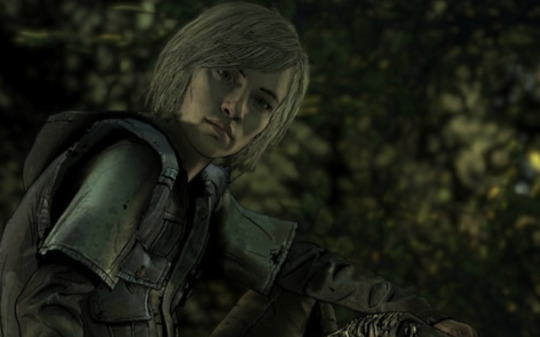
[Ericson's Resident Wallflower]
The Final Season (TFS) is particular when it comes to Violet. It will be evident throughout this essay, the care that the game and the team behind it devoted for her. From the dialogue to her actions, Telltale did well in illustrating this character. I will argue, however, that the quiet intensity in nuance laid throughout is what evoked the need to write this essay.
Because Violet represents something quite thoughtful in regards to mental health—the reality of what a disorder is, and what it can do.
So TFS is particular, and it begins with her introduction, where there’s this need to recontextualize her. Not once, but twice.
Clementine is first introduced to her silently. She follows Marlon out into the courtyard, and Tenn whistles at the wall.
Because on the school’s wall is a girl, and she rises from her lounging at its height. There’s a glance shared between Clementine and Violet, before Clementine speaks more with Marlon. After that, another glance, where Violet turns away—not before the player can spy a bit of intrigue in her face.
Clementine reunites with A.J, meets Louis, before a recontextualization, where Violet (she does talk) snarks about the crashed car, and the walkers that the accident brought to their door.
And it takes Louis to pry a proper greeting from her:
“Ahem. ‘Hello, Clementine. I’m Violet. Nice to meet you.’”
“What he said.”
[. . .]
“Don’t mind Violet. She, uh…, grows on you. I promise.”
[Ep.1 | Done Running | School Gate]
Good job, Violet. Way to be sociable.
Sarcasm aside, yeah, it’s a little rough. Violet is overall dismissive of Clementine, save for the comments. To the point where she has Louis introduce her ass.
Now Louis…is a quiet presence throughout this essay, though he is all the more integral to her character. There will be fewer words compared to other relationships, but those words signify a unique dichotomy between him and Violet, one that the other schoolkids—Minnie and Brody included—do not have with her.
And it starts immediately. That dichotomy. Louis is the one who tells Clementine Violet’s name. He is the one who formally introduces the two. Because he knows how Violet is. Ensures to lingers so that he tell Clementine—promise her—how Violet is worth sticking around for.
It’s just that the girl is troubled. So.
Thereafter, his banter is teasing, and Violet is still sardonic. But, she ultimately does play along. In her own way. When in the woods, and the schoolkids are focused on clearing walkers to have Aasim, Brody and Mitch make a safe return, Louis strikes the conversation, Violet scoffs, but can relent depending on the player’s dialogue choice(s). It is important to note that Violet scoffing doesn’t necessarily equate to her being mean; it’s clear through the card game later that…this is her way of banter, with Louis especially. She takes jabs at him. He retorts. Does the same. It’s on equal footing.
The next true recontextualization presents a taste of what Louis means. After clearing the walkers, and A.J socks Marlon, Clementine is left to acquaint herself with the other schoolkids. Mitch and Willy, Omar and Louis, Aasim, Ruby (where A.J apologizes for biting), and Tenn, right alongside Violet.
And those two are tending to the school’s makeshift cemetery. It brief, but Violet explains they lost the twins, and for the hour, they’re paying their respects.
From the wall, then the gate, then here, at their burial ground, it’s as though TFS wanted to scatter Violet’s introduction across her nuances. First it’s a silent couple glances, with her overlooking the courtyard at a perch, then it’s her being a little prick at the gate, a lightheartedness when mowing down walkers, and then it’s…this, a staunch vulnerability to and for her people. In context to the graves, her people being the twins.
All the moments that night thereafter feed into this. The card game goes back to an apathetic, yet also teasing, demeanor. Her shared conversation with Clementine, as A.J becomes an artist draws, it’s again a vulnerability, this time rattled by the fact that the dorm was once the twins’.
Throughout this first episode, Violet’s standing with the rest is shown to be quite reflective of this almost inconsistent preamble.
Marlon is the most succinct when he remarks, in the rain, after Clementine chooses to ask for Violet’s support:
“Violet being difficult. Why am I not surprised?”
[Ep.1 | Done Running | Courtyard]
It’s such a blunt statement, intended to dig at her.
Though, there is truth to it. Violet’s introduction overall says as much. She admits it herself when in the dorm, and she finds that Clementine is housed where the twins were.
“Honestly, I just miss having someone around to talk to. [. . .] And I’m not, exactly, like…a people person. You know? I know I sometimes have a habit… Have a habit of being a little bit too harsh.”
[Ep.1 | Done Running | Dorm]
Violet is not sociable, so naturally, she struggles to find someone to talk to. But, she is also sardonic—that much we got from the gate, even if it was followed by Louis’ banter which she reciprocates.
But ultimately, it’s Brody who gives the best context to Violet, and really voices what Louis is getting at.
When Clementine goes fishing, Brody begins a conversation, and within that, she can reveal based off the prompts:
[She’s…intense.] “She’s always been a little bit like that. But after the twins died, she really closed up.”
[It wasn’t your fault.] “Still, I was the one that had to break the news to her. And ever since I did, she’s become distant.”
[Ep.1 | Done Running | Fishing Cabin]
There’s two key things here, starting with the unsociability that Violet’s demeanor and Marlon’s slight reference.
Then, the revelation that Violet has closed herself off. She’s become distant within the past year.
…it implies that the Violet first introduced to us is not truly Violet, in a sense. It presents to the player thatmuch of her arc with Clementine will be about uncovering her, and really bringing Violet from this depressive spiral. Romantically or platonically so. And these lines are intended to both explain the character, and to incite enough intrigue for the player to follow Violet down her route.
But it’s rather unfortunate that so much of this character is hidden away from the start, because there's the chance that people glance over her, take this initial Violet as Violet, and decide to spend more time with Louis and follow down his route. Because, for the sake of this essay, it's damn near impossible to really appreciate this character when you don't go with her route.
Same can be said for Louis, of course. But, respectfully...
It ain't about him. So. Moving on.
Playing leader.
When Marlon is shot, Violet immediately jumps into action to protect Clementine and A.J from getting jumped by the rest, and she assumes the leadership role. Regardless of player choice. There is an curious point with her being a leader, though that will be set aside to explore later.
Instead, I’ll side-step, and bring about a piece of conversation upon Clementine and A.J’s return. In this, we gather a very telling side of Violet, one that speaks volumes to her character.
[Clementine] “You’re sitting in Marlon’s chair, aren’t you? You’re their leader now. They’ll listen to you.”
[Violet] “They don’t, though. They only listen when they want to.”
[Ep.2 | Suffer the Children | Office]
Again, we’re side-stepping from the playing leader thing. Violet says that they don’t listen to her—says it like it wasn’t a really a surprise, just a point of frustration. Because, of course, Violet’s difficult. The last leader said so. But also, none of them have stepped up to fill that role. They take issue with her, but none of the schoolkids have really challenged her to take the mantel for themselves.
The silent nuance here is…why is it that she’s the leader? Violet made it seem like she really didn’t want to be at the boarding school—what with the contention between most, then the fact that she’s still in mourning. Tenn appeared like he was the only one keeping her there, but by stepping up in this way, not necessarily.
His presence and her need to protect him is a huge factor. Absolutely. Just not the only one.
We return again to Louis, the one schoolkid with the shared dichotomy. He is the other love interest. Him and Violet are often on opposite sides—especially in regards to everything Marlon.
And yet…, the way they speak about each other when one is taken away says everything about such a dichotomy.
To start, we’ll look at Louis:
“I know I’m always teasing her. Trying to get her to do that one eye roll she does—you know the one. Where it’s like, ‘you’re such a dumbass,’ she has to do a full-body eye roll. I do it because, when I actually do manage to make her laugh, it’s worth it. If I needed her, she’d be there. Meat cleaver in hand, ready to chop someone in half if it meant protecting me.”
[Ep.3 | Broken Toys | Dorm]
He brings context as to why their banter is so dogged to tease. Louis does it because it’s reciprocated once he gets under his skin, and she retorts back with the signature full-body eye roll, but also, because he’s striving to reach another side of her, one where she laughs.
Because Louis is a big entertainer. He craves to draw that out from people, so when he has someone like Violet where it’s not easy to do that, it means that much more when she does, because it tells Louis how despite everything, she is there, listening.
Then there’s Violet, and her words for him:
“You know, when I first got here, I hated him. He was so…much. You know? He walks into a room, and it’s like, ‘Look at me! Watch me perform!’ It’s so stupid. But then I realized, under all that, he… He really cares about people, and he doesn’t just feel it, he says it. He’ll tell you every goddamn day how much you mean to him. Shit, he’ll probably sing about it. [. . .] We’ve got to get him back.”
[Ep.3 | Broken Toys | Dorm]
She nods to Louis being this big entertainer. Says that she hated it, and that it’s stupid. And yet, Violet thinks fondly of how genuine of a guy he is.
And between these two quotes, there’s a mastery in storytelling, because there’s an active dialogue between Louis and Violet. Doesn’t matter if one is on the boat, and they’re not. Their words parallel. Had they been in the room together, this would’ve been a back-and-forth.
Louis says that he teases her. Tries to get underneath her skin. Violet says that hated it, and hated him, for his antics. Yet, she then admits that…there’s a genuine nature there, because Louis does care, and he will say and sing it so. That genuine nature is the fact that he just really wants Violet to laugh, and to find that side of her.
Because Violet’s his friend. He values Violet as his protector, because Louis knows that she will be there whenever he desperately needed her.
And Louis is Violet’s friend. Which is why, without a word from Clementine, she states, firmly, that they need to get Louis back. Because in that hour, he was in peril, and he desperately needed Violet’s cleaver at hand.
It’s a tragedy, really, for both. When the other is taken, the one thing that each praise of the other is what’s stolen. For Louis, his knight is blinded; he has to be the one to protect her. For Violet, a comfort goes mute; she can sing in his place.
After spending a few moments with Clementine in the dorm, there’s Ruby’s hootenanny, and through that hootenanny, Violet can tell Clementine what brought her to Ericson’s:
“I spent a lot of time at my grandma’s house growing up, what with my dad being a drunk and my mom working three jobs. But after my grandpa died, Grandma just kinda…shut down. Spent all day and night rocking in her little chair in the den. I’d sit there at her feet as we both watched tv, mostly cartoons, since she never seemed to care. Sometimes I could hear her crying, but I didn’t look back. I’d just feel really weird and turn up the volume, you know?
“Anyway, one day she left the den and came back with another chair, and a .22 rifle. Set the rifle butt on top of that chair, holding the barrel back to her chest. So, you know…, she had trouble reaching the trigger this way, but she must have known it would happen… Because she took out this really tacky wooden backscratcher—the real long kind with the one end shaped like a hand—and used that to push the trigger in. So…yeah. Bang, right? Her body folded up and just…kept rocking.
“My mom came to get me five hours later. I hadn’t moved. She asked why I didn’t call the police or an ambulance or anything. I just shrugged and told her it wasn’t like Grandma was going anywhere…, and besides, I just wanted to finish my cartoons. She shipped me off to Ericson the next day. I was eleven.”
[Ep.3 | Broken Toys | Piano Room]
Through all of what Violet tells Clementine, there is still that flare to make the story more interesting for, you know, a video game. It’s a violent kind of neglect she shares.
But it is neglect all the same.
Violet was born to an alcoholic and a mom who stretched herself thin to compensate, yet even so, she later can admit that their home was a trailer—so the income of three jobs, all her time spent away from her mom, wasn’t enough. Perhaps there were financial troubles. The money might’ve been all drained away by cans of beer, or bottles. Violet did have an escape through her grandparents, though that didn’t last, and she was trapped to the same neglect. This time, with a better house. Probably.
Until her grandmother went and shot herself.
…with Violet in the room. Right behind the child.
And? There was no consolation; she was sent straight to Ericson’s, where the apocalypse then struck, the adults left, and Violet…was the difficult one, designated as this wallflower, or buzzkill. There were the twins, Minnie especially. Yet, even then… That relationship likely wasn’t reciprocated.
The flare that TFS adds to why Violet found her place in troubled youth—the violence, which could’ve dashed the screen she watched for those five hours—, it hides much of what went wrong with her, but simultaneously, it defines the gravity of her childhood.
It describes a mechanism of hers. One undoubtedly developed from her times alone with a drunk, whenever her grandparents and mother weren’t there. A sense of apathy, and with it, a broken moral compass. To not mind yourself, and not get in the way. To let it happen, and just get it over with, in whatever way that could imply.
And, with the sheer gravity, it begs the question…, how far did that neglect go? All of the abuse, if it wasn’t the only kind. Children aren’t born to sit in one place for hours, with fresh gore rocking in a chair behind.
The question wasn’t answered, of course. She was sent away instead. Then there were the adults. And then, other schoolkids. Violet isn’t…a people person, you know, so it’s only natural for her to be the difficult one as Marlon says.
Still, however, with Clementine as they watch the stars together, Violet denotes for the bird constellation,
“A bird is free. It could go anywhere it wanted to. Up and up and up, and never come back. Go south, east, west, doesn’t matter. You could fly straight into a sunset. And see where it ends.”
[Ep.2 | Suffer the Children | Belltower]
And to that,
[Clementine] “You wish it was you, don’t you?”
[Violet] “Sometimes, when it all feels so heavy down here, I can’t help but wonder what it would be like to be weightless.”
[Ep.2 | Suffer the Children | Belltower]
Violet has struggled to belong, and yet, she remains. Yes, there’s the apocalypse. However, in all the years at the school, she could have left just as well. There’s a version of her, lost in development, where Violet does leave had she not been saved.
So why didn’t she?
The answer to that, quite simply, is one Louis may admit to Clementine, should that version keep his tongue, and the silent nuance behind her playing leader:
Violet is too loyal to her people to leave.
It’s why Louis teases her, to try and find that laugh, and why he knows that if he needs her, she will be there to protect him. Violently, with a meat cleaver.
It’s why she takes charge, because Violet knows none of the others wanted to, but they needed someone to lead. Whether or not they appreciated that it was her.
And, it’s why she acts without thought to stand her ground against Marlon. If she’s asked, the camera doesn’t leave her because it is no surprise that she will stand beside Clementine, as opposed to Louis, where he decides with uncertainty, and the camera has him shuffle to frame; for Violet, the change in her face is immediate. The camera doesn’t have the time to idle in tension. What Louis says is dead-on:
“If I needed her, she’d be there. Meat cleaver in hand, ready to chop someone in half if it meant protecting me.”
[Ep.3 | Broken Toys | Dorm]
Even if she isn’t asked, Violet will then stand her ground once Marlon is shot. She vouches for the outsiders, in the name of reason, and for the twins and Brody.
She doesn’t think when Clementine is in danger—didn’t matter that her and A.J are just exiled. Violet will do as told, trust Clementine—to shoot, or to run.
Takes the helm after Marlon. Backs Clementine every step of the way.
Cannot let Minnie go until she has to, and Violet has seen that the person she clung after is gone.
Violet is too loyal to her people to leave, for her loyalty unbridled.
It’s her strongest quality. It is, also, what marks Violet with borderline.
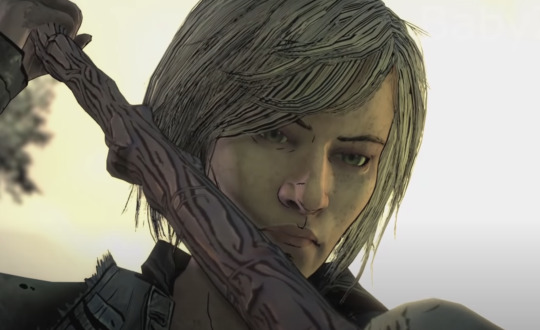
[Emotional Anchorage]
We slip back to describe BPD at large, beyond this essay and character. However, everything of this section has its place with Violet.
And it begins with emotional anchorage.
Emotional anchors are not inherent to BPD. It’s not unique to the disorder because, instead, I’d argue it is a universal experience. These anchors are anything which triggers an emotional response. These can be specific objects—like an old stuffed bear, a photograph, a house—, or stimuli—like a scent, a song. Tangible things like these are indicative of our nature. Humans like things. We like to collect, and tinker, and destroy. It helps if it’s shiny. It really helps when there’s fire or light involved.
Here's another thing about anchors:
They can be people.
They commonly are. It’s how we distinguish strangers from significant relationships—friends, family, partners. Anchorage is present despite the nuances between friends (just a friend vs BFF), and family (siblings vs parents vs offspring). And, partners—emotional anchorage explains how queerplatonic relationships come to be, because the fundamental element of a partner (being an emotional anchor) is present, it’s just the romantic and/or sexual implications are ambiguous.
Emotional anchoring is the process in establishing the anchor, leaving anchorage as this essay’s way to articulate the concept itself.
Borderline Personality Disorder will naturally encourage these attachments.
Within the community, BPD has a term: favorite person (or FP). It is as it reads. There is a designated favorite for us, and this favorite person can be a friend, a family member, or a partner—anybody, really. With FP, we begin to fall down the well in emotional anchoring as it pertains to the disorder.
Because, ultimately, a FP is either the strongest, or the only, emotional anchor an individual with BPD has. (For the sake of this essay, I will replace FP with primary/prime emotional anchor going forth, to be more consistent in word choice.) And the anchoring of this person is generally not intended. It just happens, where there’s a strike of intrigue, and everything follows thereafter.
The moment I anchor a person, it is a stark change from the indifference/apathy I display to I want to spend all my time with you, and I will literally die for you without a second thought. I will remember everything you value better than I remember my own, and I will present those nice things to you, at every opportunity. Tell me your favorite color once, and I will remember it for decades to come. Tell me to break my nose, and I may very well do it on the spot.
Which. Yes. Is intense.
Understanding the disorder behind it, however, allows me to take the precautions to…warn people beforehand. And to tell them upfront, if ever I am encroaching on boundaries, just say knock it the fuck off, Volt. In exchange…, I don’t take it personally. Because, uh, yeah. I can get intense. I understand. I may feel a type of way in the moment where boundaries are made, but that’s the BPD talking in my ear.
But also, I know I value someone being upfront with me more than a passive rejection. Frustration is what sets me off—the not knowing why—, not the rejection in itself. Because if I don’t know why, that’s how I interpret things as abandonment.
I have been rejected many times in life by people I’ve deemed emotional anchors. And it stung. A lot. Far beyond what I could ever articulate, but if I had to try, they are wounds carved to the bone, or with one, where my heart was quite utterly eviscerated.
There’s a deeper conversation there, with an anchor changing before my eyes. And, yes, it’s ultimately this which the essay will discuss in great detail. Through Violet.
Yet, before that, emotional anchorage is one of the few things that borderline has the chance to gift a person, because it’s not all bad. If you’re like me—where everything is null, and blurry, and static—, having a person suddenly there to awaken my body to speak, sharpen the world, and bring chaos inside my head… It’s a lot. It’s demonstrably a devastating thing, but in a very raw and beautiful way.
Demiromanticism, no doubt, is a reflection of how I express BPD. So to realize my demi ass has feelings, whenever it happens, is nice. …it also means I then have to determine whether it’s that, or a crush. And there is a difference between genuine feelings and a crush, and yeah, I prefer one over the other.
But. (And this can be platonic or romantic.) Having someone be that anchor grounds me, and while the relationship will have turbulence—because the boat I sail is on a river I can’t build canals for—, there brings such a confusing clarity to the world. I have a purpose where I didn’t think I did before.
It’s a high. A borderline addiction.
To not a thing, not a habit, but a person.
When it’s healthy, it’s everything, and I can brave all storms. When it’s not, it’s obsession and mania, it’s my boat trapped in a whirlpool with the anchor at the center of it all; I may break away, violently, or I will sink, and it will be the death of me.
…and when there’s no anchor there at all, I and my boat are to the whim of the river—because there are no canals, I have to rely on my boat to guide me and find an anchor. This can be where people turn to destructive behaviors. Substance abuse. Eating disorders. Everything alike.
Why though?
Why is it this way? Why do people like me sink their teeth and set anchorage like this?
This is where identity creeps its way back.
Because though anybody can develop emotional attachments, to the point of anchorage, BPD again does this to an absolute extreme. My personal anecdote may speak to it without debate. Understanding how identity gets itself involved further speaks to that extreme. BPD isn’t necessarily about the traits themselves, right? So rather, it’s how they manifest, and fester, and the mechanisms behind it all.
With identity, it hinges on what you find comfortable, and what you don’t. It’s guided by your feelings on things, and your comprehensive response thereafter. Passions turn into aspirations. Self-perception feeds into expression. And on and on.
So, if someone does not have a stable sense of self, there is a disturbance in identity. There’s no coherence to the person. Few consistencies, if any at all.
The identity is as stable as your regulation of emotions allow, and if it’s dysregulated, so will your identity.
A broken sense of self fractures a person. So we scour for stability. We do so in people. But with that broken sense, it’s easier to just swap out characteristics and emulate the environment, should there be a promise of stability. When this happens, it can be recognized as masking—because, debatably, it is—, but it can also go so far that people confuse this borderline trait with something like DID.
To those none the wiser, yeah, it might as well be DID. Because, like…, they just change so quickly. And if it’s a matter of mirroring different people, it can also imply that the BPD encourages the person to alter their personality depending on who they’re with at the time. Which. Yes. Has the capacity to resemble switching between split personalities from an observer’s perspective.
However. I have outlined (in quite the broad stroke) what DID is: a split in identities, in order to protect and shield the individual from further trauma. It’s dissociative in nature, where the distinct, established personalities will operate the individual at different times—given the nuances which come with DID.
BPD does come with dissociation as well—my personal experience with how I live day to day is indicative of, for simplicity, derealization and depersonalization. However, it’s not a split. What’s happening is this one identity does not have a stable, set personality. With the incapability to regulate emotions, it indicates a level of alexithymia. So how are we supposed to understand what we want, and don’t want, in everything from interests to moral standing? Things that a personality is grown from?
This copycat behavior is in itself a mechanism that BPD deploys. It’s kinda masking, not to purely to hide from and integrate into social norms, but also to find a sense of self through a very, very desperate act of scavenging.
In BPD, the best candidates to copy are the people who make us feel good—get a high from—, and that we want to be around, and whom we fixate upon—to a manic point:
Those emotional anchors.
As we go back to Violet, keep this in mind. Again, no, there’s no feasible way to remark for certain what her relationship with identity is like, so the implications that emotional anchoring has on identity can’t really be applied. But the intensity—the level of fixation—can.
Because Violet struggles in her bonds with other people. There’s an idealization present to those bonds, and a devaluation. Both this good and bad, the highs and lows, are via anchorages.
So we’ll start with Minnie.
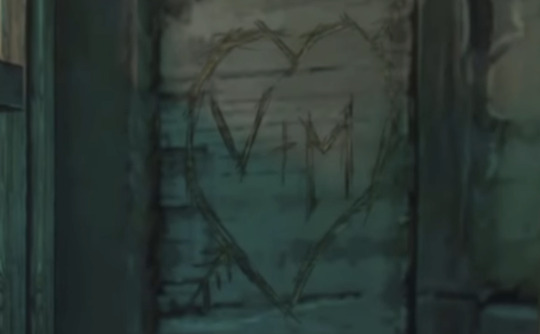
[Emotional Anchorage: An Obsessive Good Memory]
“Sophie was a good friend. And Minnie… Uh… We were close, me and her.”
[Ep.1 | Done Running | Dorm]
When we meet Violet, amongst her introductions, Clementine learns about the twins from the two who still tend to their graves—Violet, and Tennessee. Not long after, there’s a card game, and not long after that, Violet finds Clementine and A.J in their dorm.
The one which was home to the twins.
“Huh. I see you’re, um…, settling in.”
“Yeah. Is that okay?”
“Sure. I guess. I always liked this room. Sophie had, like, paintings and shit on the walls. Lots of color. And Minerva…, she was really musical. [. . .] She had the most amazing voice. Real bluesy. [. . .] That was a long time ago. After they… Afterwards, Brody and Tenn took down all the paintings. And that was the end of it. I shouldn’t have even brought it up. It’s not a good memory. Guess I just lost my train of thought.”
[Ep.1 | Done Running | Dorm]
The way she speaks of Minnie, there’s an adoration, and a nostalgia made bitter by the perceived tragedy.
Of course, those twins (…okay, well—) aren’t dead, they were traded. So even though Violet has yet to see Minnie, she is now a presence to her mind that isn’t nearly as bitter. She focuses on getting the school prepared for a fight, alongside Clementine, but through it all, yeah, Minnie is still there.
And when looking at the stars with Clementine, if Clementine remains quiet for the fish constellation, Violet comments,
“Bright, pretty, good with other people. Always moving, tons of energy. Sounds like anyone we know? The energy one is easy. Good with people, not so much. [. . .] Y’know, it… Well, maybe this is weird to bring up, but it reminds me of Minnie.”
[Ep.2 | Suffer the Children | Belltower]
Minnie is a big part of her, despite their time and distance from each other. They grew up together. They got closer.
Another thing:
Violet never says girlfriend.
The only time where it’s “proclaimed” by the season that Minnie and Violet were girlfriends is through Clementine, where whenever A.J sees the carving in the fishing cabin’s wall, she can say,
“It means they were a couple. [. . .] Violet was Minnie’s girlfriend.”
[Ep.1 | Done Running | Fishing Cabin]
Is it fair to assume that? Yeah. That’s…what carving a heart or potato with initials is supposed to symbolize.
But like.
Let’s be for real. What the ✨fuck✨ does Clementine know? Sure, she’s somehow not concussed after hauling ass in the sky, with a car. But she doesn’t know these people. Point blank.
We don’t know when this heart was carved. Just that it’s V + M (suggesting Violet did it, given the order), it’s out of the way from the school and in the fishing cabin, and it’s just shy from a bed (and alcohol).
Again, Violet herself never says girlfriend.
The heart could’ve been carved with Minnie there with her. Or, Violet was deep in mourning, and decided to brand the cabin—likely because it holds a significant memory.
…and Imma be honest, the cabin has a bed, and it is covered in bottles. Everywhere on the table. Some scattered around. So I will give the benefit of the doubt. Considering the…subtext around the fishing cabin, doing some quick math with my gamer instincts, yeah, if you leave youth (troubled or otherwise) alone, you might get Lord of the Flies, or…exploration. I guess.
It is clear that there was something. There is validity to “[w]e were close, me and her.”
The question then becomes why the ambiguity? Had TFS been made in a different time, and James didn’t have a boyfriend, and Violet and Clementine couldn’t be a couple, yes, it would’ve been Telltale beating around the bush.
Except even in this moment, Clementine outright says girlfriend in reference to a sapphic dynamic.
Because TFS was not made in a different time, James did have a boyfriend, and Violet and Clementine can kiss and hold hands.
The ambiguity indicates something else. That ambiguity is heightened the more Violet talks about Minnie pre-Broken Toys (saved Violet route). Because she speaks so fondly of her, with almost this conviction.
Yet…she still does not say girlfriend.
This is textbook. Given the essay, and what I’ve already exhausted over, it shouldn’t come as a surprise, but it is quite plain:
What Clementine stumbles upon isn’t a mourning over a lover; it’s instead, at its core, a lasting idealization.
With BPD, idealization is as follows:
“[A] way of coping with anxiety in which an object or person of ambivalence is viewed as perfect, or as having exaggerated positive qualities.”
[Verywell Mind | Idealization and Devaluation in BPD]
This tracks.
Violet speaks so fondly of Minerva, with almost this conviction, yet she does not say girlfriend. Ever. Because the conviction is the intimacy, but Violet is a pragmatic individual. Though there’s idealization present, referring to Minnie as her girlfriend (for whatever reason) is too far for even her mental state.
Like she mourned Minnie for a year. She gushed about her to Clementine every chance she got. So…why not say it?
With this all established, TFS then allows us to witness how idealization in borderline often corrodes into devaluation—the inverse of idealization, its absolute antithesis.
“Used when a person characterizes themselves, an object, or another person as completely flawed, worthless, or as having exaggerated negative qualities [. . .] because there is often no middle ground for a person with BPD. Feeling challenged, threatened, or disappointed can quickly cause them to devalue the people they formally idealized. Rather than cope with the stress of ambivalence, devaluing functions to minimize the anxiety caused by ambiguity.”
[Verywell Mind | Idealization and Devaluation in BPD]
This corrosion has a name. It is splitting.
Like with the previous definitions, I will allow my resource to explain this concept, because of everything this essay has to offer, it is this that the everything hinges on.
“Splitting involves an inability to hold two opposing thoughts, beliefs, or feelings. People who have BPD tend to view others in all-or-nothing [. . .] terms.
“This self-protective defense mechanism aims to help people with BPD protect themselves from getting hurt in relationships. By labeling people as ‘good,’ they are able to engage in relationships despite the emotional risks. If they feel threatened, they can then quickly discard the individual or the relationship by labeling them as ‘bad.’
“Like most defense mechanisms, someone with BPD may not be aware that they are engaging devaluation and idealization. Splitting is a subconscious way to protect themselves from perceived stress[, and] reflects the challenges associated with maintain an integrated view of the good and bad in a person under stress. Some researchers suggest that some of the difficulty is rooted in the way the brain, particularly the amygdala and prefrontal lobe, activates in these experiences for people with BPD.”
[Verywell Mind | Idealization and Devaluation in BPD]
…again, this essay has to break away from Violet and TFS to provide an insight, a discussion, of what this means for BPD.
I will start by clarifying that splitting from one end to the other is a bitch to deal with. The catch is not every person with BPD is incapable of reading the world beyond black-and-white. I’m one who can, …when I’m not in the midst of an episode. Day to day, I’m apathetic/indifferent—take your pick—, and because of that, I don’t give enough of a shit to really fixate on what is “good” and what is “bad” to me. I take everything as they go.
Because I really, really do not give a flying fuck.
The moment there is any seed of emotional attachment, or anchorage, it changes things. For me, it’s generally that I really adore this person, but they did something that hurt, and it confused me, so I shut down and close myself off. Namely so that I can have the time and space to breathe and process. Because I feel a lot for these people. I’ve gone over how intense that feeling is. And the last thing I want to do is hurt them.
So the moment I get confused, it boils into frustration, but frustration means ire with me. And that’s terrifying, because I don’t know what I can and will do if I’m backed into a corner. Because I know my brain shuts itself off.
The other thing to this as well is…it’s not always such a violent shift between idealization and devaluation. It really depends on how confused I am, the person, and then the time and distance laid between me and them. If there’s minimal distance between me and them, and minimal time between then and now, then yes, it will be explosive. If, say, a year has passed, and I have not seen this person within that time, then the splitting will look very different—largely because I don’t perceive it as an immediate danger, so my brain never shuts off, and I can process in the moment with reason. There’s still significant emotions there, of course, and given it’s still splitting, I do have that shift between the extremes. Difference is,I am able to regulate myself better.
Take note of this nuance, because it is absolutely present in Violet.
And we resume her relationship with Minnie, where we witness the corrosion from idealization, inching towards its antithesis. The process is best explored if Violet is saved, where it doesn’t taken an age, nor a day. It takes mere morning hours.
When spying upon the boat to get their bearings, and formulate a plan, they find Minnie chopping wood. Or, Clementine does, pulls a knife on her, before Violet intervenes. They embrace. Clementine has opinions off to the side.
Then.
They talk. And Minnie… Um. Well. If Delta was inspired by the New Frontier, Minnie would’ve had a fat branding right on her forehead.
Immediately, it becomes evident that Minerva has no interest in going back to the school. Her loyalty lies with the Delta. And given the prompt, she will have this to say:
[Violet’s in charge.] “Really? The Violet I knew could barely stand to talk to people, let alone play class president. You’re the one who convinced the school to fight back. From where I’m standing, that puts you in charge. Your ‘leadership’ is going to get my little brother killed.”
[Ep.3 | Broken Toys | Forest]
Huh.
Not only does what she say about Violet directly contradict what Clementine sees from her, Minnie is also blatant in steamrolling right through the testament, and tells Clementine that no, you’re the leader, and you’re bad at it because you are a threat to my brother.
It’s a little jarring. Because, one, ouch. That’s mean. Mitch died because he ran into a knife, and it was not Clementine’s.
But two, what?! Violet, whose first line to Clementine is snark about her driving, could barely stand to talk to people? Violet. Who stood up to Marlon, cleaver at hand? The one who Louis says (given the other route) will do just that to any threat?
Our Violet, who Clementine gets to know. The one who immediately took the role after Marlon because nobody else did? Despite the fact that, yes, she realizes there’s no promise that the schoolkids will actually listen?
Violet…is openly sardonic, is she not? Does she not confront people with a weapon?
It’s a little jarring, then it’s…dissonant the more you pick it apart. Because what is Minnie talking about?
I will say, for sure, Violet changed within that year apart. But not to the degree that Minnie implies to us. We have Louis’ words for Violet, and then Violet herself—constantly brings up protecting the twins. And she’s shown she will. Violet will shoot Lilly if told. And Violet, after Marlon’s death, brandishes her cleaver to shield Clementine and A.J from the other schoolkids.
Maybe part of the change was that she vowed to herself that she’d do better after losing the twins. Wouldn’t be surprised.
…but Minnie didn’t like killing walkers, though. Which implies that, yes, Violet probably filled a protector role for her, in regards to the dead.
It’s baffling. I can go on and on and on.
Just as Violet did, between seeing Minnie after so long, and finding Clementine in her dorm.
“The thing is, seeing Minnie… I feel like it should’ve scared me. But it didn’t. The person we ran into in the woods, that wasn’t Minnie. Not really. The way she sounded, and acted… The way she talked about Sophie, and Lilly… I’m…confused, I guess.”
[Ep.3 | Broken Toys | Dorm]
She voices the same sentiment.
But upon various dialogue prompts, the corrosion inches its way to Violet:
[She’s one of them now.] “It sucks, but…I don’t know what else I expected.”
[It’s not Minnie’s fault.] “I never said it was. But it doesn’t change anything.”
[We can save Minnie.] “You saw how she reacted when Lilly showed up. Those are her people now. And we are not.”
[Ep.3 | Broken Toys | Dorm]
I do think it’s interesting that, even if Clementine says to Violet that Minnie could be saved, she says otherwise. Because Violet is pragmatic. Minerva coming back from the Delta is just not realistic.
So through time and distance, and the wake-up call in the woods, Violet expresses an acceptance of this. The fact that Minnie won’t come back. It’s not quite splitting, because…this isn’t a true devaluation here; it’s the idealization ebbing away.
“Minnie…, the real Minnie…, she’s gone. She’s been gone this whole time, and I…have to stop mourning her. I won’t let her take you or A.J. Or anyone else I care about.”
[Ep.3 | Broken Toys | Dorm]
And she admits it to Clementine aloud. Promises her that she, and A.J, along with everyone else, will be protected from the Delta—from Minnie, if need be.
Not only that, if Violet is romanced, she makes a request:
“There’s something I’ve always wanted to try with someone I cared about. And I never have. [. . .] Have you ever danced with anyone before?”
[Ep.3 | Broken Toys | Dorm]
I’ve always taken this line to signal how nervous, and how new Violet is to this kind of relationship. Because it is new to her. This is the first time where her feelings were reciprocated. She always wanted to try dancing with someone, but for whatever reason, never had with Minnie. And she’s nervous because…she wants it to be reciprocated, and Violet here is gaging a reaction, testing the waters.
In writing this essay, another thought occurred:
This is Violet moving on.
She’s nervous because there is a lot of weight to this request. She’s gaging what Clementine says, because Violet is invested now. All-in. 100%.
It’s not about Minerva—doesn’t even outright say that she never had a dance with Minnie.
Because by this point, through this dance, Violet’s realized just how unreciprocated her feelings were, because now, she has the chance to dance with someone who does reciprocate. And not just in the dance. Clementine’s loyalty extends further than that.
Another detail that I noticed is perpetuated throughout every interaction with Minnie is who she always prioritizes, and how it contrasts Clementine. With Clementine, of course A.J is first priority, and Violet understands that. And she goes out of her way to help with him. Conversely, Clementine helps with Tenn, and the school, and the other Ericson kids. All of which are who Violet also prioritizes.
Meanwhile, the same can’t be said for the other side of that contrast. Because it’s always what about Sophie and Minnie? from Violet, and never what about Tenn and Violet? from Minerva. It’s only ever Tennessee for her.
With the initial encounter, yes. She wouldn’t be asking about Violet because… Violet’s right there. She’s talking to her. However, we overhear Minnie talking to Dorian, asking to have Tenn join her. Not Violet. Then, further into the night, where suddenly she’s singing her own boss music and a red bar just takes up the whole screen, Minnie goes out of her way to claim Tenn.
And then, for good measure, axe Clementine.
But not because of Violet. Clementine gets axed regardless of who she saves, because Minnie…is far, far more pissed that Clementine put Tennessee in danger than anyone else. Including Violet.
The Delta changed Minerva. Yes.
Yet, Lilly never was able to remove her loyalty to her people. Her people being Tenn.
It’s telling, how (in)significant Violet was to her because all I read is…, it is nowhere close to the significance Minnie had on Violet. Because Minnie had other priorities.
She just happened to be Violet’s primary emotional anchor. And with that comes everything Violet could feasibly offer a person.
Here’s the thing to understand with this essay, and what I’m getting at with Minnie and Violet’s past relationship:
Violet anchoring Minnie is not Minnie’s fault. It’s not Violet’s either; a kid isn’t going to understand why they’re feeling a certain type of way, but when it feels nice, they will follow. Especially when the adults responsible for troubled youth are just…gone.
But what this does bring to light is a nesting place for borderline’s stigma.
Emotional anchors, splitting between idealization and devaluation—these concepts are the source for much of the fear against people with BPD. When gathering articles to reference at the end, some articles I pull from r/BPD on Reddit because having resources that are from people with experience asking and answering questions is incredibly valuable. Many discussions in r/BPD related to this (exchange primary emotional anchor with FP) are frustrating. For myself to read, because several are people not with BPD venting, but, I imagine it was frustrating to type out because…they’re venting for a reason.
Depending on the discussion, however, what is said is ignorant to all of what I know of my disorder. I know where it comes from. I know that the emotions behind all of what I do with anchorage are genuine. But then there’s people who vent, or there’s others who prompt a question because they are nervous that their friend (with BPD) is not genuine.
Of course, I can’t promise how other people with BPD are like. BPD is dependent on the personality, and if you have a shit personality. Um. Yeah. You’re not a fun person to be around. Sorry?
Not really, but, you know.
Stigma aside, it is true. I understand the insecurities, and the need to vent. Being someone’s anchor because of borderline is a lot of fucking pressure, and truth be told, it’s like that because…what if you just can’t reciprocate the intensity? After that honeymoon phase, people without the underlying disorder tend to get exhausted emotionally, meanwhile…, there is no cease from the other.
So people tend to draw away. They either do so quietly, in attempt to not hurt feelings, or, they’ll be direct and antagonize because of they stress they’re under. Either way, if the condition has gone untreated, the confusion this brings will then ignite the individual’s borderline. This is where you get insecurities born within the relationship, which the person can then go further and self-sabotage because there is no regulating themselves. You get constant bombardment whenever they feel neglected. They’re overbearing. You feel that their claws are dug deep, and it’s far deeper than you could’ve ever imagined.
Because there’s an anchorage.
If this is what happened, and Minnie entertained Violet, but never reciprocated the magnitude of devotion Violet brings with her… I can’t blame the girl. And given that Minnie was a troubled youth just as much as Violet was, she had her fair share of issues.
Because frankly, I don’t care if she was brainwashed or what, Minnie still killed her twin sister. You know, the one that has been in the same situations, the same environments, throughout Minnie’s life, yet when she saw the Delta, Sophie did not fold. Sophie actively fought against the Delta, whereas Minnie…complied.
Even before they were caught on the raft that Sophie planned to steal.
“One of the girls saw that this was a place worth fighting for, and her tears dried. But the other twin, she could never forget her old home. She rejected every gift, every opportunity. Stirred up trouble every chance she got. She convinced her sister to help her steal a raft and leave on the river. Of course, they didn't get far. What happened then, Minerva?”
[Ep.3 | Broken Toys | Brig]
This Parable of Twins is, of course, by Lilly’s word, and yes, she did brainwash Minnie. So naturally, there will be an element here where the details are lost. I buy that Minnie did accept her place in the Delta where Sophie never did, but I don’t really believe that it was just because she saw it was a place worth fighting for.
The reality of Minerva is she’s a very conflicted person, and she’s passive by nature. She’s a good head taller than Violet, yet, when Violet talks about her (and Sophie), it’s always about protecting her. Because Minnie didn’t like killing walkers.
I also wonder if the reason why she’s so passive is because Sophie…might’ve been the one that got her and Tenn into trouble right with her, if she was more combative. As for the confliction, Minerva may have been caught in between—because there’s a combative twin, and then there’s a younger brother to protect, one who’s passive to a fault.
It’s this confliction and passiveness that has Minnie primed for manipulation. She will seek stability through, well, passive means. With the Delta, do as they say.
…and with Violet, it’s let the girl have her infatuation, maybe entertain it, but don’t cross too far into romantic territory because the girl’s a little too intense.
(Of course, Minnie is also the one who was practically dead herself while leading a herd by voice alone, to kill her brother and maybe do a little slashing. So like, she is just as intense, just…in less of a loyal kind of way, and more in fucking unhinged way. Because she also might’ve been the one to instill Tenn’s beliefs.)
Once it’s revealed what happened to Sophie, Violet snaps. She yells at Minerva.
But even still, there’s a slip of that anchorage:
“Who are you?! Fuck survival! Look at what you’re doing! Minnie, please, I just want to talk to you for a second! I’m sorry we never searched for you, for Sophie… I’m sorry we trusted that fucker, Marlon. If I ever thought there was a chance—”
[Ep.3 | Broken Toys | Dorm]
Following this, time ticks away with a bomb in a boiler, so Clementine lunges for an escape—to get A.J back to her side. And Minnie tries to stop her.
With a knife near-identical to Jane’s in S2. And it manages to gouge a near-identical scar in Clementine’s sternum. A stark parallel to S2’s ending. Except, Violet doesn’t hesitate. The moment she is out of the cell, she disappears into the backdrop, then an arrow finds its place in Minerva’s shoulder not long thereafter.
She does stay at her side, for when the schoolkids leave. Perhaps for closure, if the previous dialogue gives any indication.
Because even though Violet shot Minnie, moved on from her with a dance, and realized that she wasn’t going to return, that anchor is still there. Minnie was, after all, still a significant part of her, and that…doesn’t really ever just go away. The idealization may have drained, but the feelings themselves do remain.
We then look to another Violet, who was taken rather than saved.
“At least here I have Minnie… [. . .] Don’t act like you know her. She tried to escape. Her and Sophie. They said if I fight back, they’d kill Minnie. Or one of you. All you’ve done is get us hurt or killed. If you fuck this up worse, I’ll stop you myself. And don’t think I won’t. I’m not losing her again, or anyone else.”
[Ep.3 | Broken Toys | Brig]
And another aspect of BPD, and anchorage, becomes clear:
Borderline primes people for manipulation, much in the same way that a passive and conflicted nature primed Minnie.
There’s a flipside to emotional anchoring in BPD, and it has everything to do with how the disorder forces people to become reliant on their anchors. People who cannot discern nor regulate their own emotions, and people with a bleak, instable sense of identity.
Which is a problem because there are people who’re able to take a person’s emotions, and weaponize them as a puppeteer. They manipulate through any means necessary.
Most, in an effort to avoid being manipulated themselves, try to hide their emotions and keep them out of reach. They suppress them, because suppressing your emotions is how you get the most control, and nobody else.
Right?
Coming from experience, do not do this. Suppressing your emotions is the last thing you want to do.
Especially if you want to avoid getting yourself manipulated.
I felt that I had to suppress not just as a child, but before that, because I was in a fucked situation. And it did this to me.I have no control. Life is a writhing storm at sea, and I just fucking hope I can find an anchor within the storm’s eye—but I know there’ll never be a calm to this storm.
And the wrong people know this. The ones who prey and manipulate to abuse the loyalty I am so desperate to offer, and can pull it from me with ease, should idealization blind me from the warning signs.
When Violet is saved, she sees through Minnie quickly. Because it’s in how Minnie talks. And it’s weird, because Violet also includes how she talked about Sophie, when the most Minnie said was “she died protecting the Delta. A hero” once prompted by Violet’s concern. That shouldn’t have raised alarm, yet…something about it did. To Violet.
So she’s able to let go. Violet still holds the memory of Minnie quite dear to her heart—the one in her head—, but after this, it was more about closure, not bringing her back. And all it took was that one interaction.
But here, back to a Violet taken away, it takes longer. She’s not told what actually happened to Sophie; instead, both Minerva and Lilly feed into a broken trust with Clementine, and condemns Violet back to the girl who sat with Grandma’s body rocking behind her.
Her loyalty blinds her to what Minnie has devolved into, so she goes and tries to stop the bomb, save the boat, and secure a future with her because Minnie is all she knows and trusts.
Yet.
It’s broken when Violet does. Because Violet has her face marred by the bomb. She’s left to defend herself—blindly—as she clambers out of the water with a walker snagged at the leg. She asks for Minnie at first, is led by Louis, and then…it becomes clear what happened when they hear gunshots, clearing away the walkers.
Minnie. Is left. Unscathed.
Well, okay. She does, like, panic and stuff, and then gets bit. So, that explosion had been her death sentence.
But Minnie is not burned. Not like Violet.
Which…implies something. However it happened, Violet was the one closest to the bomb, and Violet was further down the beach, towards the boat, whereas when Clementine, A.J and Louis reach her, Minnie is away, towards the woodland. Getting her ass bit. A bunch.
She either got off the boat at a different (earlier) time, or, she just…abandoned Violet. To defend the last of the boat and her crew. And, probably, to look for Tenn.
Leaving Violet to realize something, and as she struggles to see the world, she begins to try and apologize. To Clementine. Who didn’t lie to her about the fucking bomb on the boat, and given that, it also kinda explains why Clementine didn’t take her sweet time consoling Violet from her episode because. Um. The bomb.
Whatever it was that happened, it’s enough to rattle Violet to reason. And to snap her out of it.
Within one interaction. (…explosion.)
It’s…the little things like this—the ones that go unsaid—, which indicate Minnie’s sense of priorities, and how even when Violet actively worked to help save the boat, those priorities never were Violet. Before this, she manipulated and lied to her, and (via the alternative path) she never…danced with Violet, despite Minnie being the musical twin. Instead, Violet never danced, but she does sing now.
Which again has me wonder, was it Minnie entertaining Violet, and/or, if the subtext found in the fishing cabin does indicate this, was it never romantic like how Violet wanted? Just physical?
I’m kinda losing my mind over here?!
There was always an imbalance. Violet always prioritized Minnie, and her sister, and her brother. She prioritized the latter two because of Minnie, and then prioritized Tenn after the sisters were traded off. Prioritized Minnie’s interests—singing, and took it on herself—, and left her own—like the dancing—to…wane in self-doubt.
And then…, we have Minnie who killed her twin, and then went after Tenn to also kill him. The killing part is, well, the brainwashing and trauma, and stuff, but point being… Violet is still not in the equation. She’s an afterthought to Minnie.
This isn’t to say that Violet and Minnie’s relationship was downright toxic, or abusive, or anything along those lines. All we have is Violet’s word. But given Violet clearly glorified Minnie to herself, her word is unreliable.
What this is all to say is…, it was no mistake on Telltale’s part to have Violet physically blind, or then speak about how she had been blinded figuratively—before reality set in. Down one route, this was done by having the wool pulled from her eyes; down the other, it was the blinding in itself that brought her clarity.
It’s what I mean when I say that Violet’s unbridled loyalty is also her bane. She establishes strong and intense emotional anchors, to the point where should that anchor be lost, she will refuse to let go. And not because she wants to trap herself to that anchor, but because that’s…how BPD is. Attachments like this are really hard to shake off. But also, Violet didn’t know who else to turn to.
There’s Tenn, sure, but she’s his protector, not the other way around. There’s some of the others—Mitch, Willy, Ruby, Aasim—who we don’t get enough time to really see how Violet is with them. Marlon she tolerates, but there’s a clear strain between them.
Louis— God, there’s Louis, and he’s the one that she is vehement about getting back—indicating that he is yet another anchor for her. Thing is, he was also Marlon’s best friend, and they are…opposites. A lot of conflict comes from that.
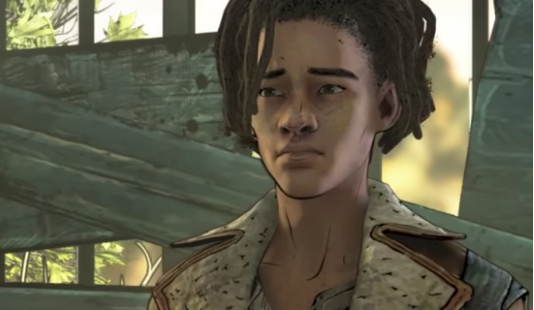
…this essay really doesn’t have much to say with Louis and Violet. In part because, frankly, I didn’t really know where I could put him with the points I strive to make. There is absolutely space for him, yet, another thing:
Their words for each other, when the other is taken, are enough. Louis and Violet say everything themselves.
I did give commentary to the dialogue quotes, but it was sparse for this precise reason. I don’t need to get into how quietly powerful their friendship is. Louis is the one who introduces Violet by name. He’s the one that promises Clementine that it’s just her way, because he knows her. If blinded, he’s also the one that she relies on to guide her. And despite Marlon, and perhaps despite even Clementine given the different routes, there is never a malice between them.
Which I adore TFS for doing, because it would’ve been easy to have them be rivals and fight over each other. Especially for Clementine.
But that’s also juvenile, and while those storylines have their place, it is not here.
Never has. Never will.
So there’s Louis. He’s an anchor. Yet, because he is the one grounded anchor Violet has of the schoolkids, not fazed by idealization nor devaluation… That is their dichotomy. It is unique of all other relationships Violet has before Clementine—after Clementine as well, should he be the one saved.
We have Brody. Who does represent a point of devaluation for Violet. The lowest to a volatile relationship.
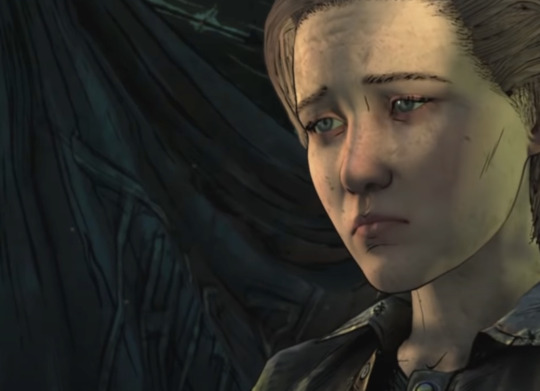
[Emotional Anchorage: Walking Triggers]
Truth be told, in this most recent endeavor to write Violet’s deconstruction, Brody was who reignited the compulsion. Because there is a deep-seated complexity to what happened between her and Violet, and why it happened. …only for me to find yet another post somewhere that was made by a glanced judgement.
Its criticism wasn’t in any way toxic, which was nice because this fandom…has a mean streak. But it did harken back to borderline’s stigma regardless.
Devaluation is a very ugly mark on someone with BPD. Worse than idealization, in the eyes of many. It in itself is toxic,and this coping mechanism is one of the reasons why BPD a disorder with the stigma it portrays. There’s a dysfunction in the order within our behavior.
That dysfunction, and the subsequent behavior, provokes a defensive ignorance.
Violet is wrong to do this. This is an antagonistic trait of hers, and Brody gets the brunt of it. She had to live with this for a year.
However, making blanket assumptions is reductive, especially in a discussion where it’s about understanding the how and why. There’s a reason why Violet devalues Brody. The path to how it happened in the first place is actually quite apparent. If you know how to read the signs, you can see this happen a mile away. So through understanding the how and why, it’s easier to 1) avoid it entirely, and 2) navigate devaluation if/when it does transpire.
Both Brody and Violet together make one mistake, and the fix is straightforward. Not easy, but straightforward.
Before that, though, we first shall establish a few things.
For one, Violet is…a lot. Don’t let her apathetic demeanor fool you. Just look to the previous section—that alone is enough to prove otherwise.
Along with the apathy, Violet is sardonic. She’s aloof to people when she doesn’t have strong attachments, but, she likewise shows to be pragmatic and reasonable. Which like, same. I wear belts and layer my jackets with vests too.
…and I also know what this kind of character implies: Violet is a little bully. She absolutely has the capacity to be cruel.This is also confirmed later, where at Ruby’s hootenanny, there’s mention of an Erin with braces that Violet would make fun of. (Probably because braces are hard to take off; they are a little goofy in an apocalypse, but also…really unfortunate the more it puts stress on the mouth and dental structure.) Violet then comments that she didn’t know why she did.
I wear belts and layer my jackets too; upon reflection, I did the same thing as a kid. So I have some insight to this which may explain the why here. Given how Violet speaks of this schoolkid, I’m willing to bet that Erin wasn’t someone who Violet had strong emotions for, one way or the other. She likely was pretty indifferent to Erin.
So, if that is true, Violet being a bully here comes from a place of 1) being apathetic, and not reading social cues like she should’ve, and/or 2) Erin was an outlet, but not a personal one.
Snide comments, and other slighted behaviors like this, they do not register.
Nothing clicks up here, behind my eyes. The comments are too brief to. So where this lashing out is coming from, it happens so swiftly that, by the time it leaves the mouth, I don’t know where it came from. There’s not much feeling to it. It was an impulse. So I just continue on my way, and never consider why.
In this way, there’s no malicious intent, it’s just cold. But outwardly, cruel.
A lot of times, to me, it was just play.
This is how a play with you. I make fun of you; you make fun of me. If you get hurt by it? Well. That sucks. Anyway—
Which, yes, is toxic, and I’ve realized, and I’m an adult now and I…don’t do that. Kind of. Social cues are a thing now, and I’ve gotten myself more aware of people. But I still do like poking fun, with the full expectation that it’s dished back.
Granted, I don’t know just how much of this applies to Violet. She has her insecurities, and is nervous when bringing herself to the table. And I am definitely not that—it’s not a confidence; I don’t care enough to be confident, I just do my thing.
But. This does establish a pattern with Violet, and with BPD, the disorder reflects the personality. There are common traits to BPD, but the expression of those traits varies depending on the person. For someone like Violet, who is already rather cold, this means any trait of BPD which stems from a cold demeanor will be present, and elevated. To borderline’s extreme.
Or, because Violet already can be cold to people, where devaluation is concerned, her personality makes it ten times worse. It doesn’t end. She makes comments—except, now, because there is significant emotion behind the comments (to Brody), it is to sting. It is cruel.
But…, it’s also complicated.
The bond between Brody and Violet is first made to be antagonistic, and Violet’s the one who perpetuates. Unlike the night before, where she with Clementine had a nice banter going in the dorm (if a tad guarded), Violet on the way to the cabin is hostile. Her words aren’t aggressive, but they’re instead dismissive at best, scathing at worst.
Brody does push back a little, and tries to brush it off, but it’s quite plain on her face that this does get to her.
In the cabin and away from Violet, Brody gives the context. It’s not just the words themselves hurt, it’s the fact that there’s a history there.
“Hey…, about Vi… I’m sorry she’s being a little mean. It’s my fault. [. . .] I was there when those walkers killed Sophie and Minnie. They were really close with Vi, and…I think she blames me for what happened to them. I mean, how do you even apologize for something that fucked up? I don’t know. Maybe I deserve it.”
[Ep.1 | Done Running | Fishing Cabin]
Violet is hurt. Brody’s guilty.
Then, there’s a second, damning piece of history that explains why Brody, of all the schoolkids, gives the most insight to Violet’s mental health, and why this is happening.
“We all used to be friends. Guess I kinda just missed that.”
[Ep.1 | Done Running | Fishing Cabin]
In the same way where it was textbook idealization for Minnie, this is textbook devaluation.
It’s made complicated because they were friends—good ones, considering they’ve been stuck in the same place since the outbreak—, but now there’s a negative connotation. That being the twins.
And remember, devaluation is an avoidant mechanism. Ambivalence is confusing, and that agitates a borderline personality.
Brody can then explain more, depending on the prompted dialogue:
[She’s…intense.] “She’s always been a little bit like that. But after the twins died, she really closed up.”
[It wasn’t your fault.] “Still, I was the one that had to break the news to her. And ever since I did, she’s become distant.”
[You should talk to her.] “Yeah, right. I tried, I have. It just never seems like the right time.”
[Ep.1 | Done Running | Fishing Cabin]
Once again, Violet is distant where she wasn’t before.
But we also get a further confirmation that Brody is the one with the negative connotation, and it’s because she was the one who had to tell her. …which in itself is an interesting choice of words, but we can assume Marlon pressured her once the conspiracy is revealed.
Then another confirmation, to the fact that opening a conversation has not been feasible.
Turn to Violet, and she first says this:
“God. Sometimes she just gets on my last nerve, you know? [. . .] I mean, it’s— It’s not like I hate her… I just… ‘I wish we could all go on a road trip together.’ God, she’s so…ugh. You know? [. . .] I don’t know what the problem is between us. With Brody…, I don’t know why it’s like this. Why is it so weird? I can never relax around her. It just keeps getting worse.”
[Ep.1 | Done Running | Fishing Cabin]
All of this is telling. Violet is very animated here, both in how she says it, her shifting tone, and what she’s saying. First it’s a comment. Second it’s admission. Then there’s that sardonic tongue, an ask to gage whether or not Clementine understands, before it all breaks and she goes back to admission.
The last couple lines say something crucial to know when understanding the dynamic here. And if a player is impatient with dialogue, they will miss these.
I can never relax around her.
It just keeps getting worse.
So Brody is a walking trigger.
Within the bounds of splitting to devaluation, this happens when an emotional anchor develops a level of ambivalence, but because anchors do not just go, the anchorage is instead insecure, rather than the source of stability once relied upon.
Yes. Brody is another of Violet’s anchors—just not the primary one.
And what it means to be a walking trigger is…devastating. Not just for Brody, but for Violet as well. She doesn’t have the support Brody gives her anymore. Can’t trust it. Because every time Brody walks in the same room, Violet cannot relax. She is agitated.
Don’t take this to mean in a figurative way.
It is literal.
Triggers rise from people an emotional response. In BPD, this often means that the brain will shut its reasoning off, and prioritize this “survival” instinct. Fight-or-flight.
So when Violet says, I can never relax around her, this isn’t a oh I’m nervous, I don’t know what to do. This is I cannot function when she’s in the same room as me. Maybe she’s hypervigilant around Brody. To the point where Violet cannot stand Brody anywhere near her…
So she sabotages. She’s cruel to Brody in the comments she makes. She does not allow Brody to get close, because it is too much. Rather than a calm, reasonable state of mind, Violet feels things. A cold pit in her stomach. A dwelling ache in her chest, or a knot in her throat. Can’t focus on what she’s doing—Brody’s there.
And the easiest way to stop it is to push Brody away.
And, and, initially, blame the girl.
[Because you blame her.] “Well, that’s what I used to think. I just keep thinking that things might have ended differently if I was there. Maybe I could’ve protected Soph. And Minnie…”
[Ep.1 | Done Running | Fishing Cabin]
There’s a confliction here. Violet did blame Brody, until she realized it wasn’t that. Instead, she blamed herself.
It’s the following prompt, however, that gives the best clarity to Brody and Violet. The prompt,
[Because she never said sorry.]
where Violet tells Clementine exactly what the trigger is—because by this point, a year later, she’s figured out how to articulate what it is:
[Violet] “She tell you that?”
[Clementine] “More or less. She wants to talk about it, you know.”
[Violet] “I just… I feel guilty about the whole thing.”
[Clementine] “Why?”
[Violet] “I was supposed to be out with the twins that day. I wanted to work in the greenhouse, so I asked Brody to cover for me. But then… I didn’t even get to say goodbye. I… I wanted to talk to Brody, to tell her I didn’t blame her for what happened. But every time I tried, I was reminded of who we lost. It was easier to just not talk about it.”
[Ep.1 | Done Running | Fishing Cabin]
If BPD isn’t a lonely experience, or a humiliating one, it can be a guilty life to live.
Violet expresses why losing the twins hurt as much as it did: there was never closure, and she blamed herself. Hence why, earlier, I suspected that seeking closure was what kept Violet at Minnie’s side after shooting her.
She was finally saying that goodbye, regardless of how the interaction itself went.
But it’s what she says about Brody.
Violet wants to talk. She has wanted to. But Brody’s a walking trigger. Every. Single. Time that Violet tried to talk, the same turbulence arose. In BPD, without that regulation, it is unbelievably difficult to talk when…your body’s actively flipping the fuck out.
A cold pit in her stomach. A dwelling ache in her chest, or a knot in her throat. Can’t focus on what she’s doing.
Of course she found it easier to just not talk about it. That is an instinct ingrained by borderline.
BPD is a lonely experience every time you lose an anchor this way. The disorder is humiliating because you do not want people to see you like this, when you’re in the midst of an episode, and you have no fucking control over your body, so you yourself are flipping the fuck out.
And it’s guilty. Because when you’re in Violet’s position, where you know the reason why, you know what you want to do, but your body works against you at every turn…
It devastates a person.
Because it is your fault. You did this yourself. Reap what you sow. You’ve done it again, it’s humiliating, and you are very, very alone because you just cannot stop burning bridges.
…in the apocalypse, being chained to a boarding school does not help. There is no way to give the time and space someone like Violet needs to think, and to process, and to let those emotions relax. Brody kicks up those emotions whenever she’s around, and the dust just never settles.
Violet trapped herself in a cycle. By the hour, or by the day, for a year, it would’ve been a ceaseless agony.
One that did scar over. Violet probably got used to it, and found a routine to the snide comments. It wasn’t like Brody was leaving anytime soon.
Until she does, and she suffers a disorientating last few moments.
I’d like to think they made amends and had a full conversation. I don’t know, however. But, at least Violet does take the first step when walking from the cabin, and she entertains Brody’s fantasies about a road trip, and that she would’ve had her sights on the Grand Canyon.
Because the one mistake they made was they never talked. It wasn’t going to be an easy thing, but it is that straightforward. So when they did, or began to, the devaluation began to ebb away.
Then, a tragic irony.
Brody’s guilt was never just I’m not Minnie, so she hates me, and it’s my fault. Rather, Brody’s guilt was warranted, and quite honestly, yeah. She should’ve be guilty, because it’s I watched as my leader gave this girl’s world away, and did nothing, lied to her, to her face, for a year.
Violet didn’t know this at the time. So for her, Brody was a point of devaluation because it’s her mental health actively jeopardizing things, not the truth and circumstance. The deception, in the conversation of that mental health, instead plays itself like salt to a wound, and then a tragic irony once Brody was murdered for it.
Because Brody knew they had to tell people. If the path to mending their relationship was encouraged, then it could be read that it gave her the inch to confront Marlon. If otherwise, Brody wanted to tell everyone because she needed to, despite what turmoil the truth would’ve caused Violet.
By the time Violet does know, and there’s a funeral, she says this about Brody:
“Brody, she was… She was real sweet. She had big dreams. And we all knew they wouldn’t come true, but we didn’t care. And we didn’t care because when she was talking, whatever she said seemed possible. [. . .] I don’t know if she found the place she dreamed about, but I’m gonna miss her.”
[Ep.2 | Suffer the Children | Courtyard]
There’s forgiveness. With Brody died that devaluation.
Not a moment thereafter, however,
“Marlon was… I can’t. Not for Marlon. After what he did to the twins and Brody, I—”
[Ep.2 | Suffer the Children | Courtyard]
The cycle continues.
Now with Marlon.
If Violet devalued Brody, she absolutely vilified Marlon. Because not only was it about the twins, there’s also Brody.
So of course she didn’t give him any peace after the fact. Why would she? Marlon had his own complexities, yes, but those complexities hurt. They brought another ambivalence.
As the essay rattles from the schoolkids, we’ll discuss another relationship now. A new, fresh one. Clementine, through who we see all of it—the emotional anchorage, the idealization, and devaluation. The splitting between. How intense Violet can be, and how volatile.
We have Clementine, who is given the chance to witness what Louis means for this wallflower, and that she grows on you (he promises so).
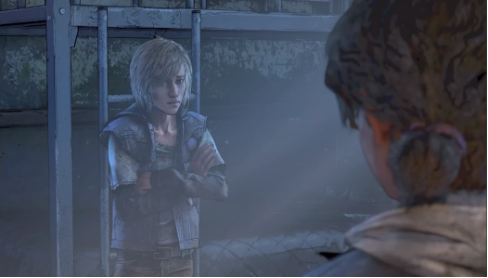
[VIOLENTINE: The Ship, and its Anchorage]
Platonic or romanced—the difference doesn’t matter in this essay. The shift of context between friend and more than that is just that: a shift in context. Distinguishing the two will have its moment, but it is hardly integral to the fact of the matter:
Violet anchored Clementine, and she did it swiftly. (In record time, dare I say.)
In regards to the arguments against romancing Violet, there’s a lot of people who look to Minnie, then back to Violet, and point to Clementine’s “girlfriend” dialogue. “Violet’s not over Minnie,” is a common one, right alongside, “Clementine’s just a rebound.”
Now. I’ve spent 5.5k words tearing those arguments to shreds in one section, and I still have with me another few things to say about Minnie and Violet’s relationship up my sleeve. In light of Clementine and Violet’s relationship.
Because even though I do buy that they were closer than friends arguably would be, they weren’t girlfriends. It’s why Violet was insecure within their relationship, and why that insecurity devolved into a strong case of idealization. Violet genuinely did love Minnie. Her bond with the twin will honestly forever be there, but that bond wasn’t unconditional. The conditions were at the cost of Violet’s mental health.
Then there’s the rebounding, and I will use this as a jumping off point regardless of relational status.
Rebound relationships are defined by a partner still with a previous relationship’s baggage. They’re not done healing. They haven’t quite let go. It gets in the way for committed relationships where the expectation is that both are in it 100%, and that person just…can’t. Because they’re still fixated on the last partner.
…which yes, does sound like Violet. Cuz it kinda, sorta, frankly is.
However. For one thing, this dynamic doesn’t just apply to a Violet route opted for romance. The rebound applies to a platonic dynamic, in part because I don’t frankly believe Minnie was a true girlfriend, and in part because idealization is not specific to partners. Especially in what we see in TFS, Violet needed to let go of Minnie regardless.
Then there’s the fact that being a rebound isn’t always bad. To rebound, which is where the term “rebound relationship” derives from, means for something/someone to bounce back. Or, it can mean a kind of backfire. Both uses of the word can be applied to relationships like this, which, yes, is why they’re fickle, and why people do their best to avoid.
Here’s the thing: Violet needed a new relationship to pull her out of the old one. Because Clementine is a catalyst for Violet, and she was anchored so quickly because whether Violet herself realized, she did want to move on. She couldn’t, but through Clementine, she got the chance.
And I do confidently say that she did want to, because by one interaction in the woods, Violet is disillusioned from Minerva immediately. She’s snapped out of what image she had of her, and is the one that remains realistic where Clementine can offer supporting words—along the lines of we can get her back.
It’s why Brody, through the cabin’s conversation, observes the same.
“We all used to be friends. Guess I kinda just missed that. But when you showed up… I don’t know, I just haven’t seen her warm up to someone in a long time.”
[Ep.1 | Done Running | Fishing Cabin]
I find it interesting that Brody picks up on Violet taking to Clementine so quickly, and is able to read enough into this to try and see if it’s enough of a push for Violet to start healing. She’s right, it is enough, and Violet does take a first step in mending their relationship, and breaking away from the devaluation that was arguably heightened by her idealization of Minnie.
…granted, it’s dependent on player choice. There are Violets running around out there having fished with Clementine, but never did reconcile with Brody.
In any case, I am going to argue against Minnie being Violet’s ex because 1) who the fuck cares, I’m not concerned over purity over here, and 2) it’s likely they weren’t exes at all.
However, I won’t fight against this being a rebound. It is. But, Violet’s arc is about learning how to let the fuck go, she has a problem with letting go, so of course the relationship would be a rebound by proxy. A healthy rebound, at that.
By the time she is forced to let go of Clementine, after two newcomers are voted out, her attachment is made quite plain the moment Clementine is in danger within— What, five minutes, and Clementine is at gunpoint?
Regardless, Violet is there, bow at hand, with Louis behind her. She is ready to shoot, and it is no bluff. Violet will if prompted. Or, she will run should Clementine prioritize getting the two out of it.
Because Clementine’s already anchored. Violet trusts her to make the call, and she will follow without hesitation. Later on, after a weary night with A.J shot, then a morning of crawling back for medicine, Violet calls for Clementine to talk in the office. And in there, the anchorage is confirmed further:
“What happened out in the woods… I saw they had you pinned, and I… Shit, I got so crazy.
“I know you think I didn’t do enough for you and A.J, but when I saw you were in danger, I had to do something.” / “When I heard you call for help, I didn’t even think.”
[Ep.2 | Suffer the Children | Office]
The second line is dependent on whether or not Clementine blamed Violet before, as her and Louis walked the exiled to…exile. And stuff.
But, her account as to why she ran right for Clementine, and pulled an arrow on Lilly says everything I got so crazy, I didn’t even think, I had to do something. Clementine roused a trigger.
This time, in a very good way. Well, as good as the circumstances. In any case, this does count as a trigger because it’s inciting an emotional response, and given Violet’s wording, a fight-or-flight. (I realize triggers are specific for negatives; for the sake of brevity, I don’t care. I still say it counts.) It’s the reason why, before, when I detailed how I personally get with my anchors, I do similar things. No, not literally pull an arrow on someone, but I act on impulse without care, because I just want to satisfy their needs to the absolute fullest. It’s genuine, but it’s also triggering—under a positive connotation.
After this, of course, we push into Violet leading the school as they prep for an attack, with Clementine right alongside her. Whatever happens during this time is unknown, just that the school built-up the walls, laid their defenses, and focused on instruments to help, such as traps and explosives. Shortly after the time-skip, of course, we get the belltower sequence.
Starting with an inquiry:
“I know you came back for medicine, for A.J, but after that, you could’ve just left. Avoided all the bullshit with the raiders. Why didn’t you? Sorry, I know that puts you on the spot. You don’t have to answer. We’ve all got our reasons.”
[Ep.2 | Suffer the Children | Belltower]
Violet asks something that has likely been on her mind for a while, but then… Not backtracks, but she does relinquish the pressure for that answer.
As their time at the belltower continues, it’s clear where the question came from.
“Sorry, I didn’t mean to just…talk so much. It’s just, I’ve watched people leave before. Family, friends. They never come back. But you did. And now I can’t imagine what it would be like if you weren’t here. Um. Shit, that sounds so much dumber when I say it out loud. You know what I mean.”
[Ep.2 | Suffer the Children | Belltower]
Violet’s hesitancy to speak her mind, be vulnerable, is interesting, particularly because it’s about doing so too much. It’s a very specific one, with ambiguous implications. This could be an anxiety she put on herself, or, this was something that she took after a mention that she was talking too much, getting too personal, one way or another. Then there’s also another thing, where it sounds dumber than she intended. As though when speaking her mind, Violet has an idea of what to say, but she doesn’t know quite how to articulate it.
This is a really good line of dialogue, so that latter insecurity is just that: an insecurity.
Nevertheless, this speaks volumes because it’s the first verbal admittance to an issue with abandonment. All the adults left her life, and never returned. Those include her parents, who never tried to get back to the school. Her grandfather died, so not his fault, but her grandmother shot herself right behind Violet. Which is abandonment, and really fucked to do. The teachers of Ericson’s…
Then fellow students. Most probably died, including Brody. And the twins were taken away.
Abandonment is a huge thing.
So we turn to the route where Violet is taken. And it’s not good. Violet reacts as predictably as this essay has outlined.
[Clementine] “Vi? What happened? Are you okay? Violet, talk to me… We’re here to take you home.”
[Violet] “I looked for you. When they grabbed me, I saw…you let them take me. I’m just supposed to forget that because you’re here now?”
[Violet, if platonic] “Some fucking friend you are.”
[Violet, if romanced] “Some fucking feelings you had for me.”
[Ep.3 | Broken Toys | Brig]
Here we have now a fresh faultline within her and Clementine’s relationship. It brings ambivalence. Upon seeing Clementine, she’s plunged into an episode.
And Violet splits. Her image of Clementine is distorted, so she falls back to the same pattern she did with Brody, and she is hostile.
[Clementine] “What’s wrong with you, Vi? Come on, let’s get the hell out of here.”
[Violet] “No, Clem. I’m done. This whole situation is so fucked! At least here I have Minnie…”
[Clementine] “You mean the Minnie that betrayed us?”
[Violet] “Don’t act like you know her. She tried to escape. Her and Sophie. They said if I fight back, they’d kill Minnie. Or one of you. All you’ve done is get us hurt or killed. If you fuck this up worse, I’ll stop you myself. And don’t think I won’t. I’m not losing her again, or anyone else.”
[Ep.3 | Broken Toys | Brig]
We also have Violet manipulated on top of that, led instead by Lilly and Minnie’s word, not Clementine. Because BPD primes people to manipulation, especially in times when they’re at their most vulnerable. But, throughout these interactions, we do see Clementine attempt to console her, and talk.
Violet, however, is not open to. She is not in the right state of mind. This is a BPD episode, so Clementine is not able to get through to her here. Violet does not trust her—too much ambivalence. Mitch’s death is fresh on her mind, she’s been lied to by Minnie about what happened to Sophie, and with that lie, she was told that more people would die if they did not listen.
And of course, the more time is spent, Clementine starts to get frantic as everything escalates because there’s a fucking bomb ticking away in the deck down below. So there comes about an urgency, and she can’t spend that valuable time consoling Violet.
So she starts chipping away at the door.
“What the fuck are you doing?! You’re gonna get us all killed!”
[Ep.3 | Broken Toys | Brig]
And Violet does precisely what she said she would do, and she attempts to stop Clementine herself. Because there’s Minnie again, but she also doesn’t want anyone else to die either.
Lucky for Clementine, she is stronger, and she is able to overpower Violet within a minute. However, in trying to get the cells unlatched, then to find her way to A.J, she herself is overpowered by Minerva. The urgency and stress associated backs Clementine to a corner. She still doesn’t want to see Violet hurt, so, she explains,
[Clementine] “We planted a bomb on the boat!”
[Violet] “Fuck you, there’s a bomb! Mitch is dead! You just… Fucking go!”
[Ep.3 | Broken Toys | Brig]
…and again, Violet does not trust her. Mitch’s death is still fresh on her mind. Everything that Lilly and Minnie fed to her is still present.
Then, the bomb goes, and it takes Violet’s sight with it. Even on the beach, she asks for Minnie, amidst confusion because, somewhere down the line, they got separated. Louis has to be the one to support her. By this point, and some beats after, it feels like this is another Brody. Like there’s no turning back, not until a long, long year where Clementine would be in the same shoes.
Minnie makes herself known, though. She’s off in the woodland, with her people.
And that is when this Violet has the wool pulled from her blinded eyes, because she realizes what happened.
The moment is brief. It’s very easy to miss. Yet, the attempts Clementine gave on that boat to console her, before the urgency really began to set in, was not fruitless.
Violet tries to apologize:
“Clementine? The stuff I said on the boat, in the cell, I, uh…”
[Ep.4 | Take Us Back | Beach]
It’s not the right time for it. The schoolkids need to get off that beach, but this brief moment is huge.
The thing about episodes is, yes, in the moment, the individual is not consolable. There’s no reasoning with someone who is shut down. However, the attempts to try and console, and/or any verbal promises to leave the door open for when they’ve calmed down, the effort can be recognized and appreciated.
Once Violet snaps out of it, that’s precisely what it was. She understands that Clementine was never trying to hurt her, nor did she come to her disingenuous. Clementine was there to bring her back, because the situation was exactly as Violet herself said—fucked.
But still… Clementine was there to bring her back.
Either way, Clementine proved herself to Violet, because down this route, she left twice, and came back both times.
Of course, the night does not end there. Clementine loses a leg. Another schoolkid is gone.
So through the weeks thereafter, Violet gave herself the time, and then, she tries again with the apology:
[Violet] “I wanted to wait ‘til you were up and about, but how I behaved on the boat… It was really unfair. My head was so messed up—by Lilly, and… And Minnie. I was so wrapped up in my own shit…”
[Clementine] “It’s okay. You went through hell in that boat, and I let that happen.”
[Clementine, if platonic] “I’m just glad we got you out of there.”
[Clementine, if romanced] “I’m just glad I got you back. I was so worried I’d lost you.”
[Ep.4 | Take Us Back | School]
In this apology, Violet articulates the position she was in, and admits the kind of influence Minnie was to her—not a good one. And in turn, Clementine acknowledges her. She doesn’t demean Violet for what she did. On top of that, she expresses how she’s just happy that Violet is there in the moment.
This route is bittersweet. We have the beginning, where Violet is guarded, then she warms up to Clementine, finds an anchoring point, and acts upon a fierce loyalty. Which then is hurt when Clementine chooses to save Louis instead. The time on the boat is very bitter because…the truth about borderline is, yeah no, it does not care who the person is to the mentally ill. The disorder is a disorder for a reason. It will hurt, and it will put a strain and test a relationship.
Then you just have the big fuck you axe where Minnie…effectively was the one who managed to wound Clementine, have her get bit, and then lose the leg. Which isn’t really how an eye for an eye goes, but that’s what this route goes with.
But then…, it’s sweet. Because Clementine did the right things, with what stress she was under.
She tried to talk to Violet, and in doing so, she left a door open for Violet to crawl back through when the time was ready. It was sooner rather than later for her, since Minnie… Whatever. However, it’s an apocalypse; a boat was just blown the fuck up. So while it was the time for Violet, it was not the time for literally anyone else. Ergo, a second attempt, to which there was resolve.
Clementine and Violet did not make the same mistake that Brody and Violet did.
And that’s what saves the relationship.
Now, let’s waltz all the way back and save Violet, just to show what Clementine and her do right to build a healthy connection, whereas her and Minnie went wrong. To do this, taking a brief visit to the romantic will help in dissecting an evolution found as the episodes progress.
After the bits of dialogue in the beginning of this section, Clementine can choose to confess her feelings for Violet. It can be solidified by a kiss, or a question for a relationship, or…a meek silence, to which Violet is able to read and feel the same. Clementine can also express confusion, in that she needs the time, but express the interest all the same.
There’s a sweet moment here, and with the kiss, it can also be a touch awkward because…
Okay, they kind of flounder. Violet more so. Which is interesting to note, because Violet “supposedly” was in a relationship before. Sure, the moment on its own doesn’t mean an experienced person wouldn’t be any less awkward, but with the following steps in their relationship, it does support the suspicion this essay has in that she never had a reciprocated, romantic relationship with Minnie.
The moment where Violet asks Clementine to dance, and is nervous to do so, is one of those steps in the relationship:
“When you told me you have feelings for me, I was shocked. Then I started thinking. There’s something I’ve always wanted to try with someone I cared about. And I never have. [. . .] Have you ever danced with anyone before? [. . .] Do you…wanna? Just us. No one else around. I mean, I know it’s kind of weird, but it’s something I’ve always wanted to try.”
[Ep.3 | Broken Toys | Dorm]
It’s a step in way of romance (Clementine even remarks after how they’re getting better), but it’s also a step in Violet’s confidence in being vulnerable with someone. She’s still clearly anxious here. Violet still has some of that self-deprecation, and it comes back if Clementine rejects the offer because the idea was stupid, or something along those lines.
But she still does ask. And it’s a big ask, because this is important to Violet. So if Clementine reciprocates the dance, it’s yet another sweet moment, and it builds the confidence within for this relationship further.
Before the night, Violet can tell Clementine how she got to Ericson’s. Then, through the night itself, she backs Clementine every step of the way. Shoots Minnie. Escapes with the schoolkids, only to come back and find her with Tenn and A.J, safe and sound.
During their walk, Violet opens up again. This time, there is none of that self-deprecation, and Violet even gets choked up—but she’s not really ashamed for it, she just continues and says her piece.
“While we were looking for you guys, and I… I thought you might be…gone for good…, um, shit. I was trying to figure out what I’d do if you were gone, and I realized how goddamn stupid I was. About Minnie. For a whole fucking year. I was so wrapped up in losing her and Sophie, I pushed away everyone who tried to care about me. Marlon, Brody, Louis. Even you and A.J. I tried my damnedest not to care about either of you. And I still couldn’t tell you why.”
[Ep.4 | Take Us Back | Forest]
She admits everything. Is so very open to Clementine, and tells her what is on her mind. There’s Minnie. There’s what she regrets.
[You were afraid] “I was a goddamn coward. I’m not a coward anymore.”
[I’ve done the same thing.] “And then you wonder why you fight so hard to stay alive. I don’t wonder anymore.”
[You cared about me.] (Platonic) “I didn’t expect to find a friend like you, not ever again. But I’m really glad I did.” / (Romantic) “Yeah, I did. Way more than I meant to. I’m still kind of amazed we found each other, you know?”
[Ep.4 | Take Us Back | Forest]
By this point in the story, Violet has undergone her arc.
She is a changed person because of Clementine’s influence, and she sees what she either didn’t see before, or did but had forgotten. Through a rebound, because Violet just needed a second chance to redeem herself.
Now…, she didn’t expect to find a friend like Clementine ever again? It’s interesting that Violet indicates Clementine was a second chance with the platonic route, not the romantic. Is this her quietly admitting that Minnie was never beyond a friend, actually? Or is this in reference to Brody and Sophie instead?
I dunno. Just found that interesting, since she could have said an equivalent for the romantic dialogue. In any case…
There is something so profound with how this relationship contrasts the ones which came before. As a friend or partner, Clementine never gets to the point of Minnie’s idealization, nor Brody’s devaluation. Both are antithetical to each other because they balance on the same scale—that being insecurity. Violet cared for Minnie and Brody deeply, and those emotions are genuine.
However.
Minnie was put on a pedestal because there were faultlines to that relationship which Violet did not want to face. Brody, instead, was degraded because rather than faults, it was easier to ignore the good sides to Brody. And the good sides were a really, really sweet girl who dreamed of a better life—something that Violet could never see for herself after the twins.
Then there’s Clementine.
Even at their worst moment, where Violet’s trust in Clementine waned, she still did trust her. Clementine told her there was a bomb. Violet snapped because Mitch was the one who knew explosives, and he was dead. And yet, she got herself blinded because she knew Clementine wasn’t lying to her. She trusted her enough to know…
Well yeah. There’s a bomb.
Beyond that, however, Violet decides to do some arts and crafts, even though she says they’re stupid. Or Violet’ll ask for a dance that she’s desperately yearned for. She’ll talk to Clementine, a lot, even if she didn’t mean to do it “so much.”
Clementine as an anchor never truly corrodes. It’s tested down one of the routes, yet by the end of it, the relationship is maintained.
…there’s a final note which taps into this.
We come back again to identity one last time. For a brief anecdote—nestled within the shadows of what exhaustion this essay has gone over with Minnie and Brody, and now Clementine—, but an important one. Violet’s sense of identity will remain to be untold because we don’t have that perspective. She never talks about herself like that, so there’s no true insight for Clementine to gather.
Yet there are scant traces of identity diffusion, or an incoherent identity, ceaselessly disturbed by external influences.
This calls back to a copycat nature where borderline personalities will imitate in order to find stability. Ambitions, beliefs, interests—these all go right along with it, because they very well can change, and do so radically. Impulsions in way of severe life choices are made on the foundation this nature provides.
And that foundation is not strong.
There is no way to truly understand and deconstruct Violet’s sense of identity, yet, her behavior and choices made throughout the season can give us something to chew on.
Between the two routes, Violet is…a hair shy from being an entirely different person. The Violet Clementine brings onto the boat is not the same as the Violet she meets there. By contrast, Louis remains consistent; bring him on the boat, and he acts as expected—same with when we find him…without a tongue.
One is Clementine’s Violet. The other is Minerva’s Violet.
In both routes, Violet’s impulsion changes her life’s trajectory. She either shoots Minnie, or, she goes after the bomb and blinds herself. In one route, she’s outspoken, combative to the Delta, and fiercely loyal to the school; in the other, she does behave like how Minnie described her—never could talk to people, never to be class president. The Violet in that second route is withdrawn and quiet…
But she does confront Clementine.
She mimics Minerva’s newfound bellicosity that she dawned from the Delta, and it’s pitted against Clementine by following both her and Lilly’s word.
Going back to the first episode, where Brody tells Clementine that Violet withdrew herself from everyone, a lot of that was depression. Violet also actively told herself to push everyone away (…except Tenn, a remnant of the twins). However, there is a read here that she withdrew herself because there was no one left for Violet to mirror. She reverted herself back to the girl who sat in front of the television, with her grandmother’s fresh corpse just behind her.
Not to say that Violet doesn’t have a personality on her own. No, she still does. Having a weak sense of identity doesn’t automatically mean that there’s no identity at all. It can just mean the self-perception of identity is weak, but given that it is a self-perception, what is Violet going to draw from if she doesn’t…know how to read herself?
So Clementine meets Violet in the midst of this. She’s sarcastic and grates for a minute about the car. She keeps up a wall between her and Clementine. But by the end of the episode, and the start of the second, here Violet is cleaver at hand, about to lead the school.
Marlon scathes when she stands toe-to-toe. Talks about her being difficult again—but that in itself is ambiguous, because does this mean she’s gone toe-to-toe before, or does this mean Violet has a tendency to be inconsistent? And was that night another inconsistency?
But then… Louis. He admires the fact that Violet is like his white knight. He relies on her to protect him, because he knows that there is no doubt—she will.
Then being a leader. That comes as a surprise to presumably everyone. There’s a few points of dialogue that suggest it, others that blatantly say it, and then more few beats where we see the contention between Violet’s leadership and the schoolkids.
There’s conflict here. Violet is inconsistent in who she wants to be.
And it’s just that, isn’t it?
The TWDG community has long since decided that Violet’s arc is about letting go of Minnie (for those who see past the “rebound” thing), and self-discovery. Which is still true, but through the lens of BPD, there’s another layer to this. It’s about learning to let go despite disorder. And then, it’s learning what she wants from people, and who she wants to emulate, again, despite disorder.
What kind of person does Violet want to be?
And this is distinct from Louis, because with Louis, it is also a self-discovery. He is care-free, live in the moment, to a detriment. To be quite frank, the only reason why he got that far into the apocalypse was because he relied on his community. Not because he couldn’t contribute, but because he has his fair share of self-depreciation.
But there is no question. He knows who he is, and he knows the kind of man he wants to be. It’s why Louis does talk about his sense of self as much as he does.
Whereas Violet really doesn’t, perhaps because she can’t. All of what she confines in Clementine is the fact that things get overwhelming, and she gets confused. Quite frequently. But also, her relationships. Everything external for her, because… Again, she struggles to articulate what’s going on internally, because of that confusion. It takes time for that articulation to be feasible.
Violet has a patchwork identity. She’s kept traits of others—such as the singing. Granted, everybody does this. However, there’s her own within patchwork, but those have gone largely unexplored in the past.
Then here’s Clementine, the catalyst to this arc.
Which begs the question, why? What about Clementine has this impact on Violet?
Something about her draws Violet in.
At first, yeah. Clementine’s new. There’s an air of mystery around a girl who totals a car at Ericson’s front lawn, with a kid in tow. But that mystery alone doesn’t equate to a cleaver pulled, guarding the new people from the rest—her own people.
The answer is rather simple: Violet is mirroring Clementine, so all there is to do is look at that reflection. And we find a leader. We find someone who is compassionate, and does everything to fight for their own. Actually fight. Tooth-and-nail. Someone who does whatever it takes to survive, even if that means rubbing the good ol’ walker jelly, or, taking risks to secure a bag of food.
Clementine’s compassion for people is evident once she wakes up, and she has A.J by her side. Her skills in leadership, her drive to fight, to survive—those are all made very clear at the train station, with both Louis and Violet following her lead.
So Violet mimicked. She found the same traits within herself, then elevated them. Brought them to the surface.
As the relationship continues to build—platonic or romantic—, Violet finds reciprocation. She’s not just emulating what Clementine would like to see. After all, she was sat in the headmaster’s chair while Clementine and A.J were still exiled. That indicates how Violet found, if not a comfort, a consolation in that part of herself.
The reciprocation continues whenever Clementine responds to her, and she validates Violet, she shows interest in what Violet says, and what Violet wants to do. Violet can ramble on and on as long as she wants, and Clementine would still listen. Violet (if romanced) can ask for a dance, and Clementine would oblige. Either way, Violet gives Clementine a pin. Clementine puts it on.
It's that compassion, and it cascades authenticity off Clementine to the people she surrounds herself with. She’s also someone who feels strongly. This character is a very empathetic person. Throughout S1, Clementine was perceptive of the people around her, and she cared. Deeply so. S2, the same thing, even if her morality began to grey. The start to closing herself off to protect herself was present. S3 as well, especially in her drive to find A.J once she learned he was still alive, out there somewhere.
Throughout the seasons, there are also plenty of moments where her empathy shows. Clementine does genuinely feel what the people around her express. Like with Louis, when his tongue is cut. You can hear in her voice how pained she is, regardless of the relationship itself. She’s pained because Louis is.
And given what she’s lived through on top of that? Clementine would absolutely put 100% in a relationship, enough to match someone like Violet.
There is another reason to this why, and the thought struck me when I was reminded of an easter egg during Violet and Clementine’s scene up on the belltower. A constellation, which Clementine can draw for herself, and he’ll wink right back at her:
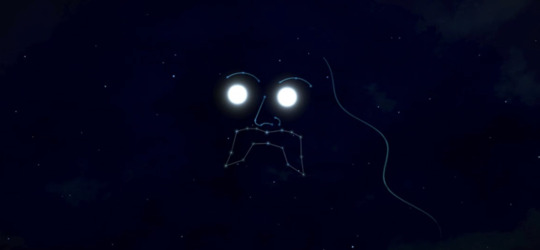
Kenny.
This connection is an interesting one to make for a scene with Violet. It’s cheeky first and foremost.
Regardless, there’s a parallel drawn here. Violet and Kenny are very similar, in that…Kenny likely had BPD. TWDGhas two seasons, then a couple flashbacks, where we can read it so. That man was volatile himself. Fiercely loyal, but could absolutely flip on a dime if his perception of the people around did not align with what he desired—it’s why he’s so fickle with Lee, to the point the gameplay reflects it, and then Clementine as well, because this behavior was the ultimate antagonist. His spiral down mental health escalated, and escalated, and escalated.
And he’s guilty. Tells Clementine that to leave him, or to shoot him, is the right choice to make.
But should the two survive together, with dreams of driving down to Florida, we find that he…is okay. He’s stable. His anchorage with Clementine and A.J is strong, without ambivalence. In this storyline, she sees that with people like him, sticking around through the bullshit can be worth the trouble.
Of course, it’s also a testament whether or not it is worth it. Some people, including myself, left Kenny in S2. Because the turmoil through the season was just that significant.
He genuinely cares, but like my mom, Kenny still hurts. Especially in S2. Because despite himself, he just could never seem to get past what he felt, and his impulses.
Clementine’s relationship with Kenny varies across different choices made, and the interpretations thereof. My personal interpretation of Kenny will contrast wildly to another. And that’s okay.
But whatever the interpretation is, and the choices made, Clementine has experience with people like Violet. She’s lived through the type of behavior conditions BPD and alike bring. She knows how to navigate them, and find healthy grounds.
Clementine keeps an open line of communication with Violet. Expresses interest, and accepts what Violet herself has to offer. But she also has her boundaries. For one, A.J. He is her priority. Two, when Violet fights her, Clementine fights back because it’s not okay—do not lay a hand on me. Now, whether or not she would’ve fought like she did if there was no bomb, and A.J was still in the cell…
I don’t know. I assume it would’ve been one of those major choices of the game. Either talk her down, or fight.
…similar to what Lee has with Kenny, up in the attic after the house in Savannah is swarmed, or on the train before that.
Bringing Kenny into the conversation is…funny, in a way. At least to me. I write all this, because TWDG secured its place in my heart by being the very thing I needed through a really, really bad year where my mental health (BPD) reared its ugly head. TWDG as a whole, but S2 especially. I realize why so many people have issues with the season, and I get it. It’s only natural for that to happen when every season has its distinctive personality—not everyone will gel with its voice. That, and it does have its fair share of flaws.
But if it was not for S2, I would not be in the fandom. Because that season was 2019 boiled down to the pure chaos I inadvertently put myself through, and it did so by having me play a character who when she was taken seriously, she just could not do it right, then…, when she wasn’t, it was out of neglect, where the adults put themselves first. Every. Time. And…one of those adults was a blunt reflection of it all.
Up until the final moment. The breaking point.
It’s how I felt inside my head. And still do, sometimes. When I’m stuck inside a season rooted in instability—a winter—, things just keep happening, and there is no end, even though I try to maintain the fantasy of peace in those slow moments. But…there’s just no end. There’s only escalation.
It was something I needed to experience in isolation, where I understood that it’s just a game, and it’s within the scope of 7.5 hours.
Swiftly thereafter, I started writing. Because again, it’s what I’ve always done. So AYDF came to be, where Clementine’s an alcoholic, but not because she’s legitimately an alcoholic in the gameplay. I get she’s not; my Clementine is an alcoholic because…it’s an obscure remark of borderline, and an exploration wherein I thought to use an entirely different disorder to express such a thing. In part because I’d yet to really (re)consider BPD (it wasn’t until some time later that I understood), but also…I’m a storyteller. Having alcoholism represent BPD is interesting.
It’s all why I adore TWDG, and my Clementine, and ADYF. Together, they’re an anchor of mine.
Clementine and Violet’s relationship included, because I did not expect to find Violet. I knew about their relationship before playing—heard it whilst I did light research on which games to buy. But I didn’t expect to find a character who…also emulates what S2 did for me. Just, in a more matured light than who I was in 2019. Also didn’t expect the relationship to provide growth for my Clementine in regards to these personalities, because mine did absolutely struggle the first time—with Kenny, and the devastating choice she made.
Cuz like.
Oops. A.J’s still alive. Um. Whelp.
(…for context—because I know the assumption—, no, Jane was not there. I left S2 with both her and Kenny dead. Clementine just shot the last adult who could’ve helped A.J.)
To see the chances where Clementine is the person Violet needed—to treat her well—, and take those chances, I didn’t expect to find Violentine as this embodiment of a healthy relationship despite borderline. It’s not perfect—obviously it’s not—, but all things considered, it is healthy by the end, no matter the route.
It’s regardless of whether or not Violet actually has BPD. She’s not diagnosed, and I don’t intend to have her be diagnosed. But at the same time…, this essay kinda makes it clear that Violet is a textbook example anyway. A good one to me.
And a good one to A.J.
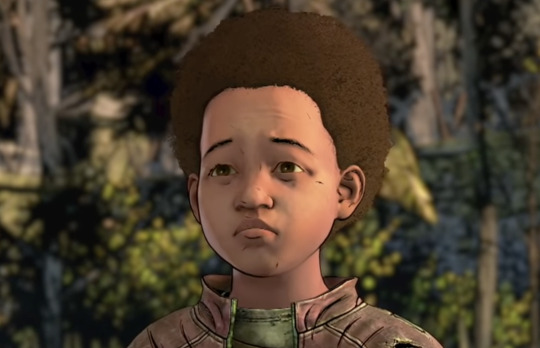
[A.J, & Serving an Example]
Throughout this essay, the priority has been clarifying BPD, and unveiling what it feels like. A mechanism that may lead to the disorder, then the mechanisms that the disorder itself deploys. How it effects the person, in their identity or, most notably with Violet, relationships.
And the way Violet articulates herself, through the several dialogue lines within this post, it is evident that she’s aware. There’s a self-deprecation to it, but, Violet knows her issues and what it does, whether or not she knows its name—BPD, or something else entirely. Given the ambiguity that the game allows, it is still left unsaid.
But that’s the first thing: she does talk about it. Violet knows herself well enough to.
Not only that, she demonstrates a responsibility in her disorder.
With this essay, there hasn’t been much in the way of responsibility. Because it isn’t until A.J enters the discussion do we truly see this come to light.
I will be the first to say that, while I can sympathize with other people of the diagnosis—even empathize—, I am rather critical when it comes to being responsible of our actions. From knowing a trigger but being around it anyway, to refusing to communicate when a hand reaches out—there’s issues I take. Because there are things that needs to be done with BPD, and those are not it.
The fact of the matter is, sorry, it fucking sucks. But also, it is your disorder, as it is mine. It isn’t your fault that it happened, but it did, and you’re kinda just stuck living with it. It’s not the responsibility of anyone else to fix and manage every aspect of BPD.
Finding people like Clementine, or a support system like the schoolkids, will do wonders because, yes, they can help. But Clementine, and the schoolkids, also have their fair share of shit. To expect them to drop everything is unfair, the same way that being expected to just drop your BPD for someone else’s sake is unfair.
It’s a give and take. There will be a ceaseless line of dialogue in the name of boundaries, and clarification, and everything in between.
So we return to Violet’s apology to Clementine.
“I wanted to wait ‘til you were up and about, but how I behaved on the boat… It was really unfair. My head was so messed up—by Lilly, and… And Minnie. I was so wrapped up in my own shit…”
[Ep.4 | Take Us Back | School]
She doesn’t excuse it. Violet gives reason—and that reason is, more or less, she was not in a right mind—, and she articulates what position she was in, but there is no excuse.
Because the difference between an excuse, and an apology, is that one is done with the intention to be forgiven, the other is done with the intention to resolve—the forgiveness is a hope, not the reward.
Being able to do such a thing, unprompted, speaks volumes to Violet’s maturity, and her understanding of her own mental health. For people with BPD, more often than not, it’s easier to blame someone else because…looking inward, and realizing you royally fucked up again is not easy. Or, it’s easier to use apologies to seek a reward—like forgiveness—, and to indulge in a brief gratification that may ensure a person stays.
Well, okay. The same can really be said for everyone. BPD, however, does has its way in amplification.
Nevertheless, A.J is able to witness this moment, take it in. It’s a lesson in itself.
But given Violet is saved, and Louis is mute, there is another moment which not only speaks volumes, but it serves to A.J clarity.
After the last meal shared in the game series, and Violet with Clementine deliberates over a caravan, A.J can ask Violet one thing:
“Aren’t you still mad I killed Tenn?”
[Ep.4 | Take Us Back | School]
It’s a fresh wound for her. The pain of it is laid clear across Violet’s face. However, in response,
“The thing you said on the bridge…, that he was messing up all the time. It wasn’t something new, you know. Tenn got himself or other people into trouble all the time, long before you guys got here. He was always so lost. He lived in a world that just…isn’t there, you know? And that’s why I tried to look after him. But when I was pulling him away from the walkers, and Minnie, I could also see…he just wasn’t there anymore.”
[Ep.4 | Take Us Back | School]
Or, it’s complicated, but she understands why. Violet is able to acknowledge where A.J comes from. She does, and she sets aside her emotions. There is no corrosion here. Violet doesn’t devalue A.J for this, even though the gravity of his choice would’ve provided a validity. A warped and intense validity, but one all the same.
They trade more words, and amongst them, Violet asks a damning question, and A.J accepts:
[A.J] “So you’re mad, but sad.”
[Violet] “Can I be that for a while?”
[A.J] “Yeah, it’s okay.”
[Ep.4 | Take Us Back | School]
A.J acknowledges her. She asks for further acknowledgement—the time to heal.
And he understands, and he allows her the room.
…the thing about Violet and A.J, in contrast to Louis and A.J, is that A.J looks up to these characters for very different reasons. Louis is a great guy. I want A.J to be like him, or better yet, a matured version of Louis. He’s charming, charismatic, good-natured, and through the game, we do see that he begins to donate an effort to do better.
Really, it’s not a mystery as to why A.J grew attached so quickly.
Violet, meanwhile, is confusing. She’s not that great with people, is instead a bit of a pill to swallow, and with her trauma comes a volatility.
Sure, she was the one who stood-up for Clementine and A.J when Louis didn’t, but in playing this season, I’ve always gotten the implication that A.J—at least initially—does have a preference for Louis. And I say implication because it’s never said outright, but there are some dialogues and reactions of his that had me wonder. I also don’t mean he doesn’t like Violet, no, but more that he doesn’t necessarily understand what Clementine sees in her.
At least, that isn’t until time passes, and more is spent with Violet, does she start to grow on him as well.
Louis models a more…digestible person. He has his problems, but they are easy to explain and understand. He was a spoiled brat. He sabotaged a marriage over something so very petty. And now, where his upbringing still rears its head through his immature work ethic, he struggles with deep insecurities.
There is a complexity here. One that does deserve its own essay, though I’m not really the right person for that. (Here’s an essay, by @stop-breaking-my-heart-telltale. Pretty good. And they gots a lot of essays like it. …but also, again, sorry for tagging; I know this is absurdly long. Lol.)
Violet, meanwhile, comes with a confusion because her issues are so steeped in stigma. Which is to be expected in conditions like BPD, where…yeah, there’s the chance she will lash out, do things she doesn’t mean, because a switch was flipped.
Where Louis is someone that A.J would like to aspire to, Violet seem to stand as a figure A.J can grow to appreciate. Having her as a model gives A.J the chance to understand that with people like Violet, you give them space and time. Work with them, and if they are genuine people, they will prove themselves worth the effort.
It does take effort, however, and the time spent with them.
And if there is no effort given, and no time spent…
Yeah. Violet will be that wallflower.
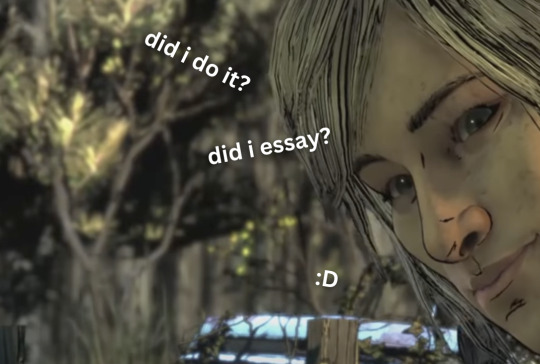
[Conclusion]
There’s nothing else this essay really has to say at its core. BPD is a very, very confusing disorder. Both internally, and externally. Stigma doesn’t help. It is, after all, a huge reason why I wrote this.
Because the stigma is quite honestly the worst thing about BPD. In many resources—whether they’re linked below, or you find them on your own—, you’ll find that a BPD diagnosis often comes with others right along with it. Addictions, eating disorders, depression…
To those who don’t know better (or maybe they do), that’s just…natural. It’s how it is.
But I remember going to my family, telling them that there is something wrong, only…to be assured otherwise. Not for my sake, but for theirs. Because BPD isn’t greatly understood, and when it is, realizing that none of them got to save me from my mother in time has its way in denial. What my mother did wasn’t right, however, I could’ve ended up like her.
Just not through those initial traumas.
Rather, I could’ve, had I made the same mistakes she did with the silent traumas thereafter—decades, now, where the people around me refuse to acknowledge my words, and listen to me, because I know the look in the eye, and I sometimes find it in the mirror. Those initial traumas may have been the first lashing, but it’s the time after which seals BPD within a person. Because the condition goes unchecked. It ferments. People tell you one thing, but you feel another, and as a child, you decide to trust their word, not your own body. Which breaks you. Gets to a point where there’s no real return, because people like me weren’t allowed to learn otherwise.
Understanding what happened to me was a very lonely experience, despite the sheer amount of people I had around me.
…and it hurts, somewhere deep in the recesses of my alexithymia, that my abuse never came from people who hated me. My mother didn’t, not in those initial years. None of my family did, in the decades into adulthood. But still, they hurt. The abuse came from the people I least want to admit, in ways that media would deem too boring for our idled attention spans.
I proclaimed that BPD is when a mechanism deploys, and the cost means a sacrifice of one integral function. It is still true—the mechanism, alongside the personality, and that specific initial trauma will influence how that BPD is expressed.
Yet, Borderline Personality Disorder happens when a mechanism deploys at a great cost, and that sacrifice is never restored. It is the neglect of the individual’s emotional turmoil after catastrophe that does it, where the same mechanism festers until it is there to stay as an ugly, depraved scar.
It is the disorder where a person was never allowed to heal, despite the mind and body screaming that they need to.
So when I hear BPD and the diagnoses alongside, I hear yet another time where someone likely knew there was something wrong, but they chose to find stability by other means, because it wasn’t found in the people around. Addictions bring those dopamine hits that BPD elevates. Eating disorders, where maybe…they can find something about themselves to control. Because there is none day to day, nor in relationships. And depression? Honestly, it speaks for itself; if a person manages to find themselves with a tumultuous anchor, or no anchor at all, it’s easy to slip into.
Or, if the diagnoses are born conditions, like ADHD or autism, or others, like schizophrenia, those speak to a concern where those conditions were left unchecked, and they festered as BPD, they were what predisposed it…
Yet, when I hear a story like Violet’s, it is a true reassurance.
Sure she’s not diagnosed. But still. The game doesn’t hide anything. It doesn’t “assure” the player that Violet isn’t this type of person, that she isn’t literally sick in the head.
TFS shows her issues quite plainly. And it’s because it does, and refuses to lie to make anyone feel better, does the game promise something that is so, so desperately yearned for in those with borderline.
It’s acknowledgement.
To tell someone that, yes, you’re not confused that you feel confused amid a chaos. You are. But there are ways to work with it, and around it. You can, actually, have strong relationships with people, and in those like Clementine, even if/when you fail, they will stay, because they understand.
To tell someone all of that is a first step towards understanding BPD, a disorder so shrouded because of stigma, and little else.
And so you have a character who still has her struggles with it, but she has a support system, and she’s taught herself enough to manage—did it well, considering the circumstances. She was left to her own devices. Sure, she had her grandparents to escape from home, but…, well. Yeah. After her grandma, Violet was then sent straight to the boarding school. The apocalypse struck. The adults left. And though her community still cherishes her, Violet…was designated as their wallflower.
So it’s funny, to have found this character this way, because Louis was right.
Violet does grow on you. If you let her, anyway. She can be suffocating.
Anyway. Hope you enjoyed.
Volt out.
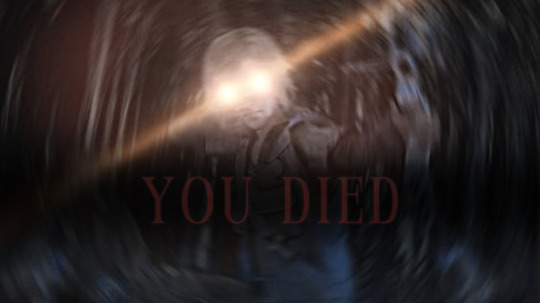
Volt's Library (my writing)
Clem Comic Essay #1 (canon stuff)
Clem Comic Essay #2 (language)
Links: to start your own research
BPD (General) | 1 ; 2 ; 3 (4 types); 4 (quiet BPD)
BPD (Stigma) | 1 ; 2 ; 3 ; 4 ; 5 (r/BPD)
BPD (Anchors/FP) | 1 ; 2 ; 3 ; 4 (r/BPD)
BPD vs Bipolar | 1 ; 2 ; 3 (comorbid BPD & Bipolar)
BPD (Identity Disturbance) | 1 ; 2 ; 3 ; 4 (r/BPD)
BPD (in Relationships) | 1 ; 2 ; 3
#volt's library#twdg essay#fandom essay#essay#long essay#TW: this is intended to explore BPD; so with that comes the sensitive topics as mentioned in the introduction#twdg#twdg violet#twdg clementine#violentine#twdg louis#louis & violet 🥺🥺🥺#twdg minnie#twdg minerva#twdg aj#twdg brody#twdg 4#the walking dead game#bpd#borderline personality disorder#the amount of times i looked something up and saw myself staring back at me is…too many times#like okAY GOOGLE i GET IT i have bpd#i know#LET ME WRITE ABOUT TWDG IN PEACE#thank you#and also thank the wiki transcripts my gOD#and and gotta love reminding myself that violet's dad was canonically an alcoholic#which is concerning for aydf since…well…gotta love alcoholic clementine#also also i do intend to edit/polish this later but what i wanted to say is here anyway so#im gonna nap now
29 notes
·
View notes